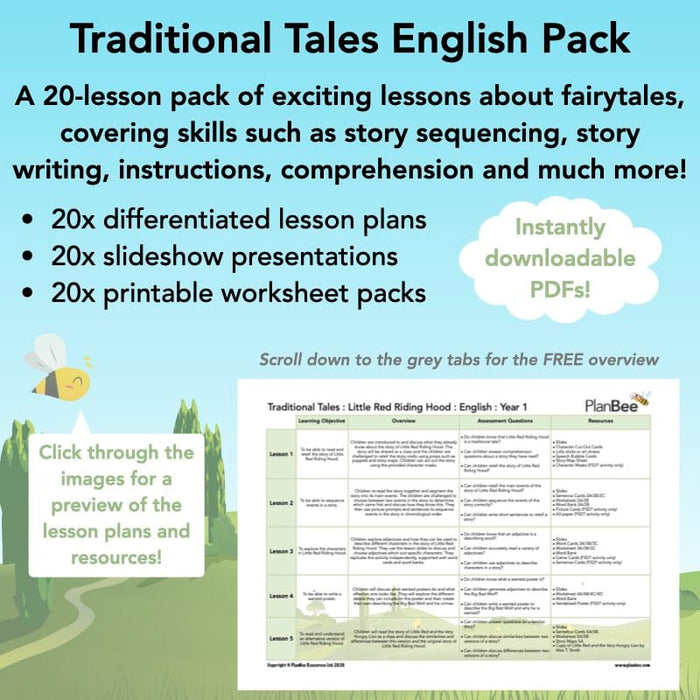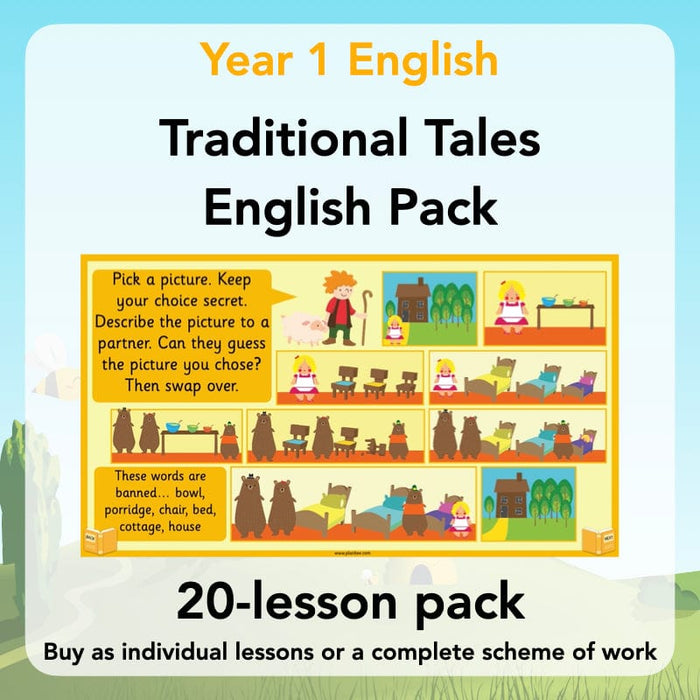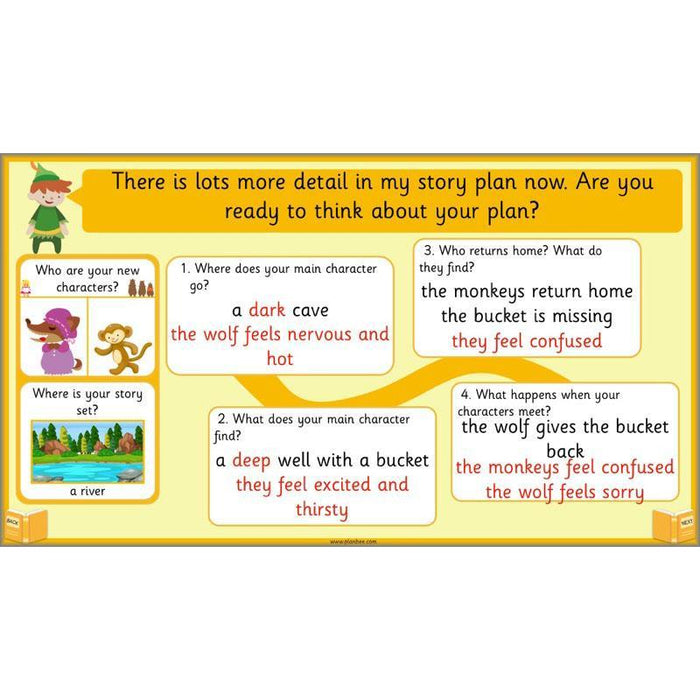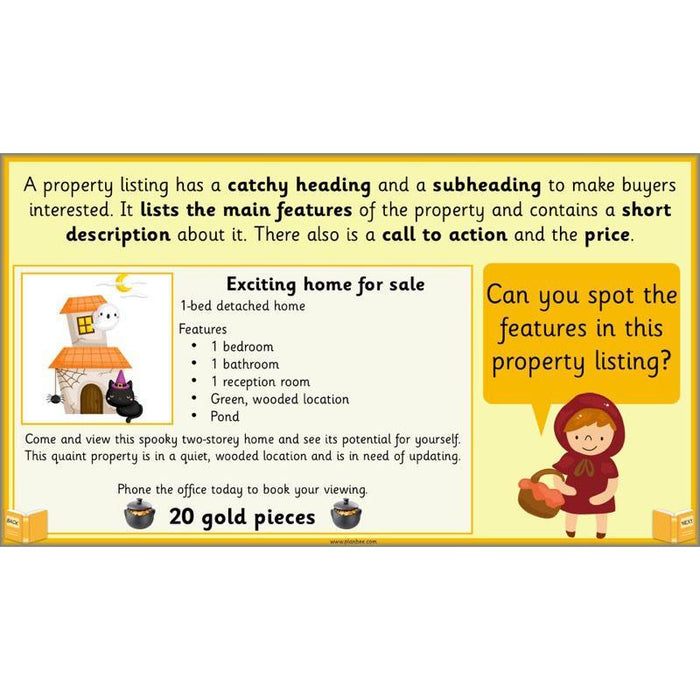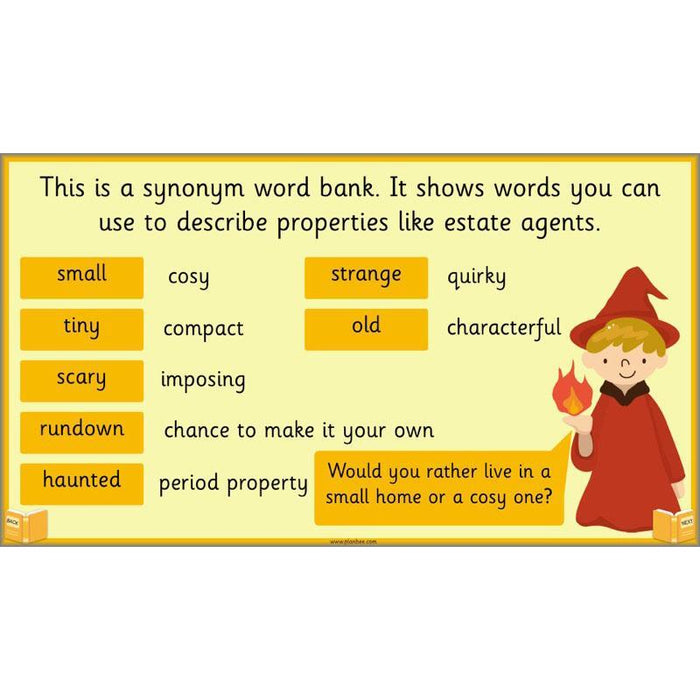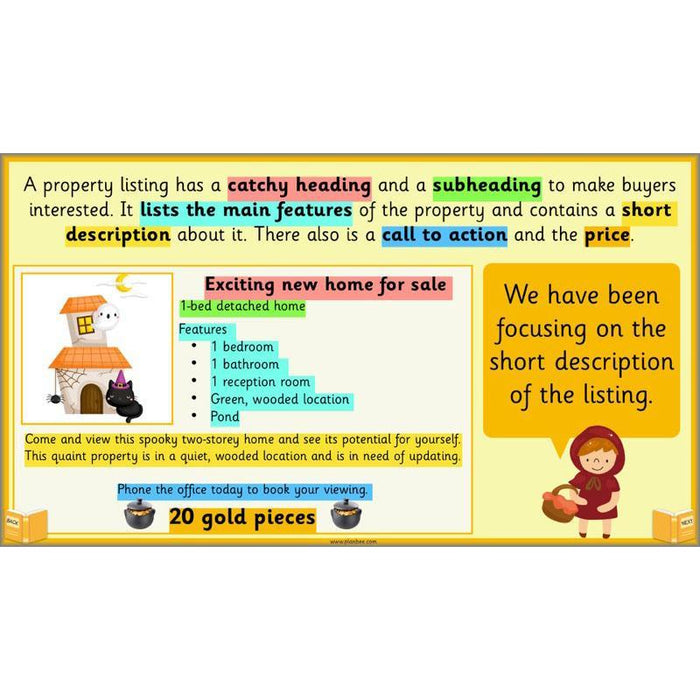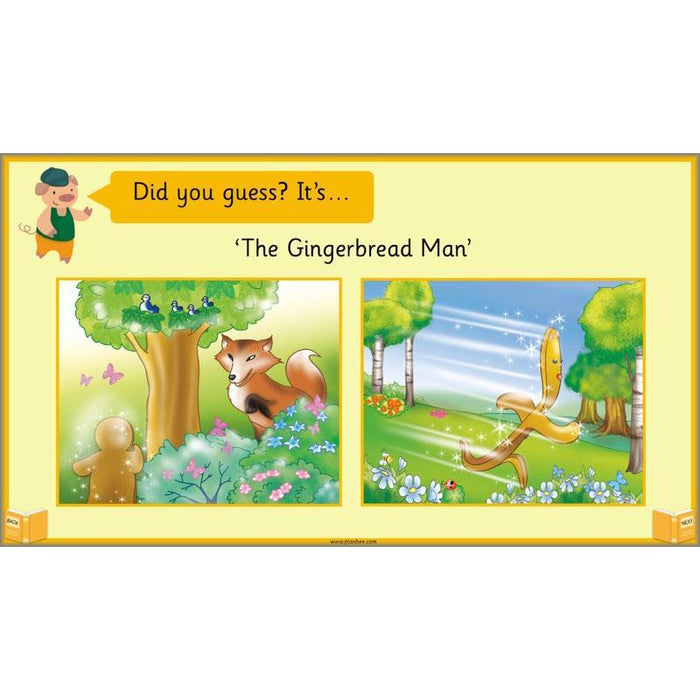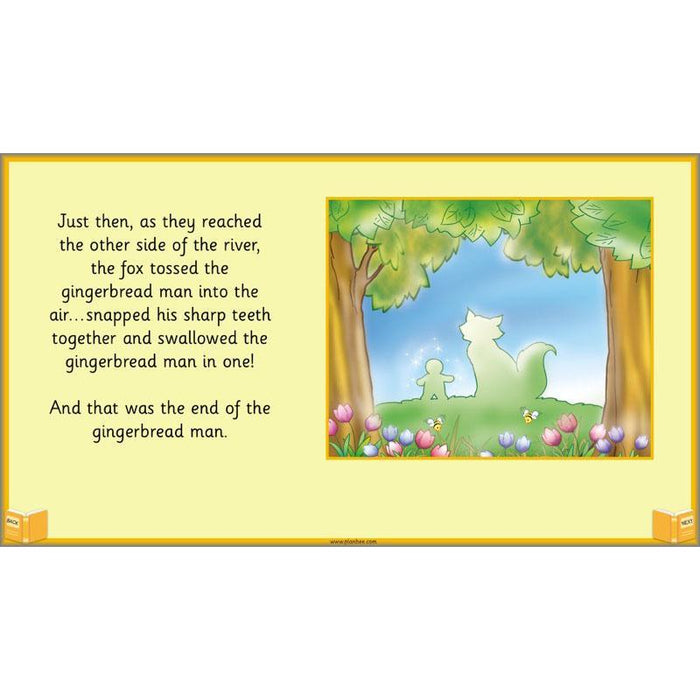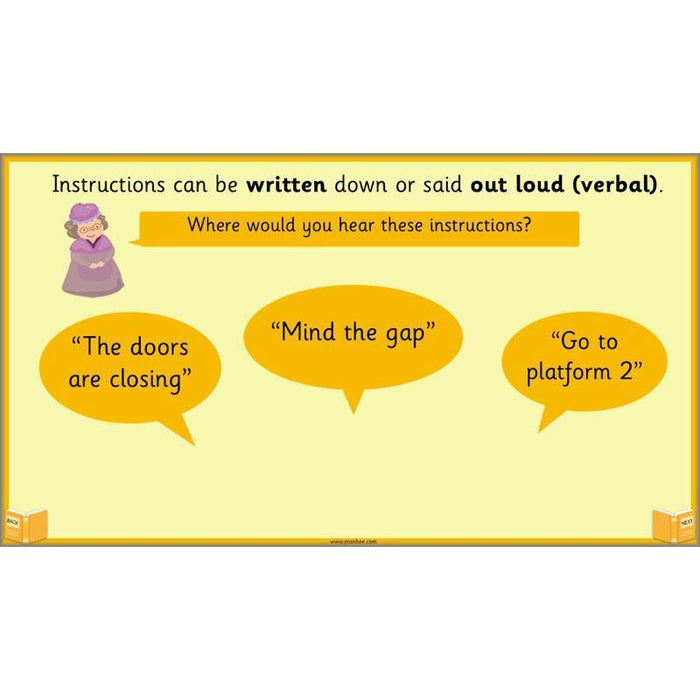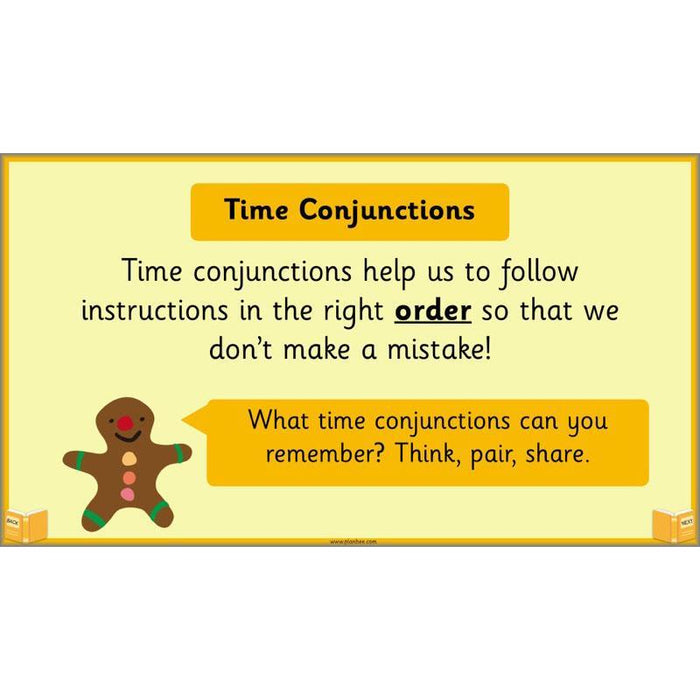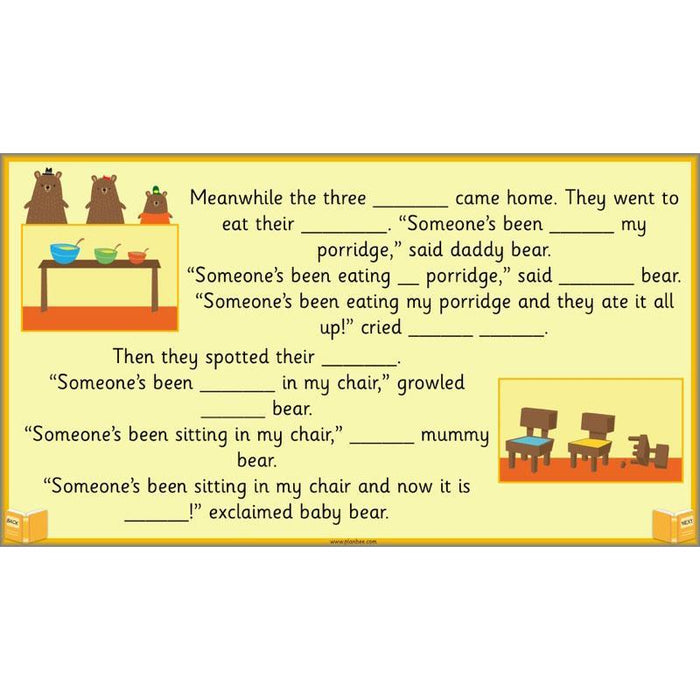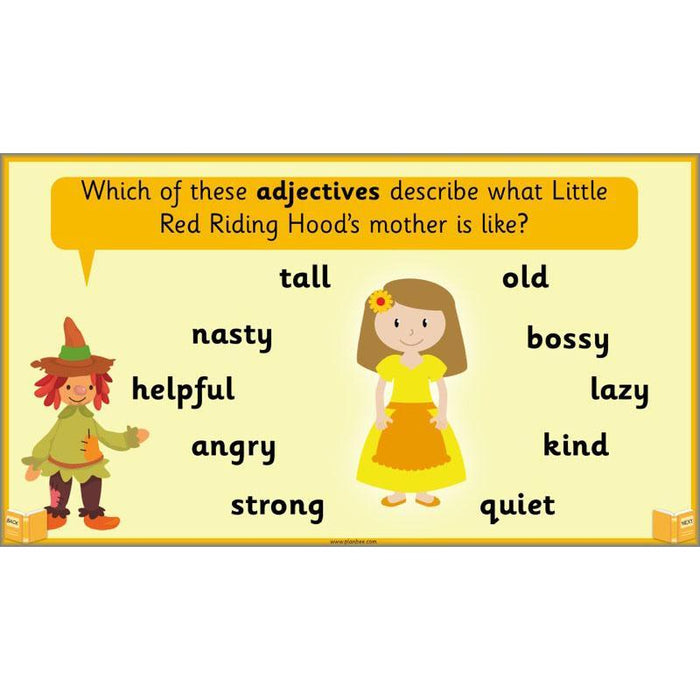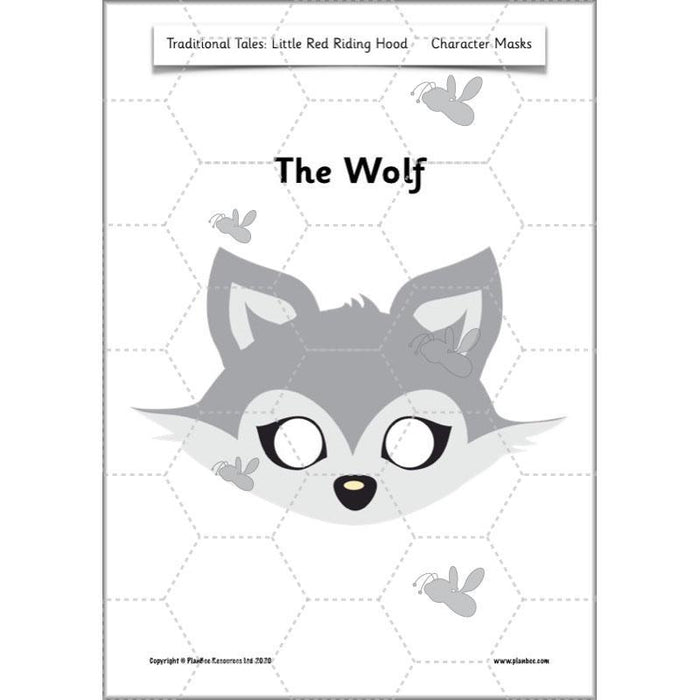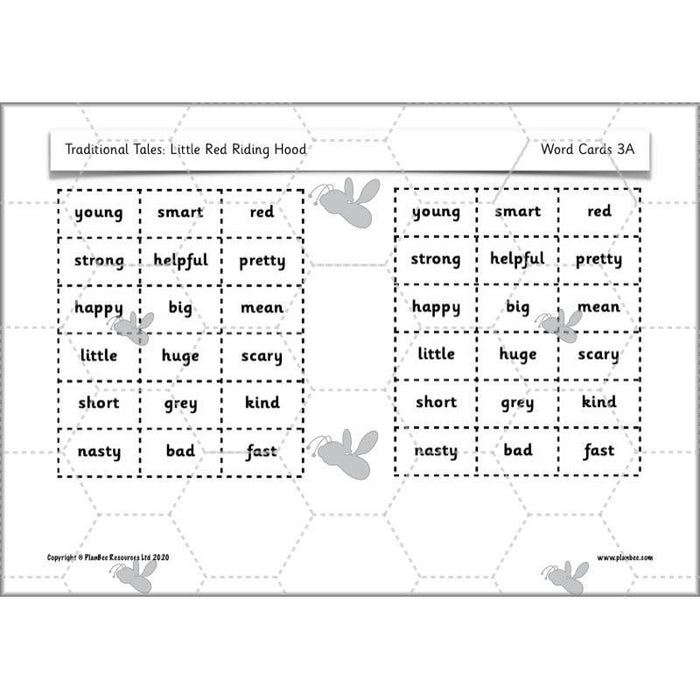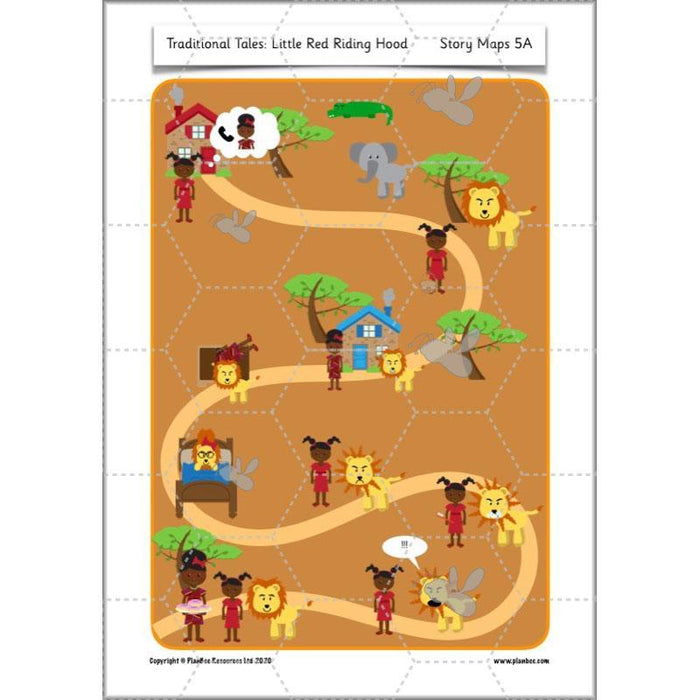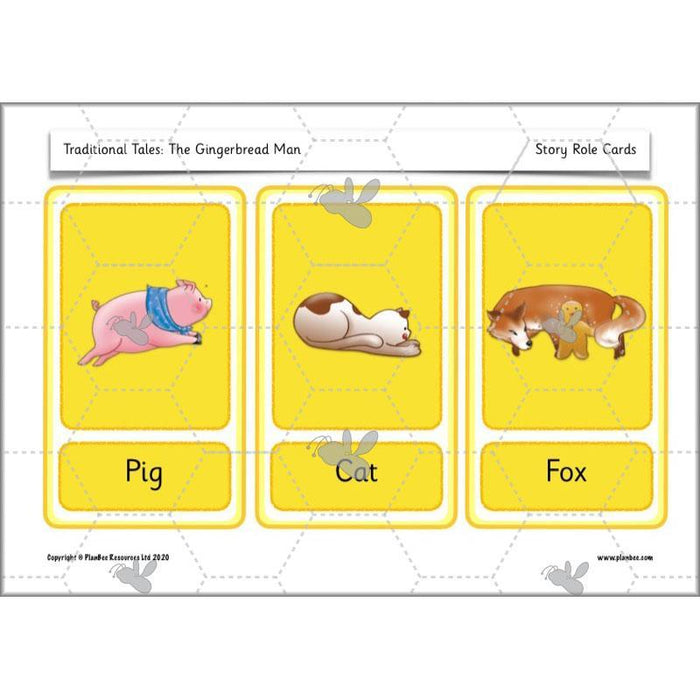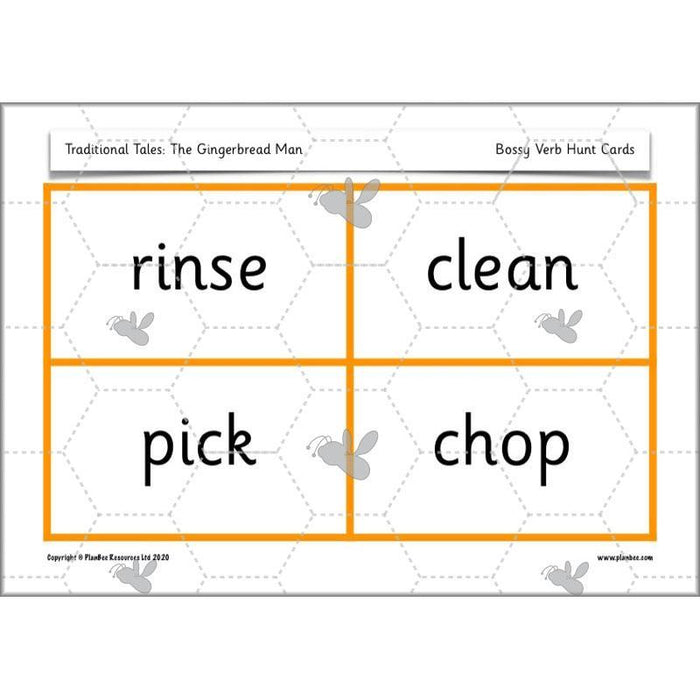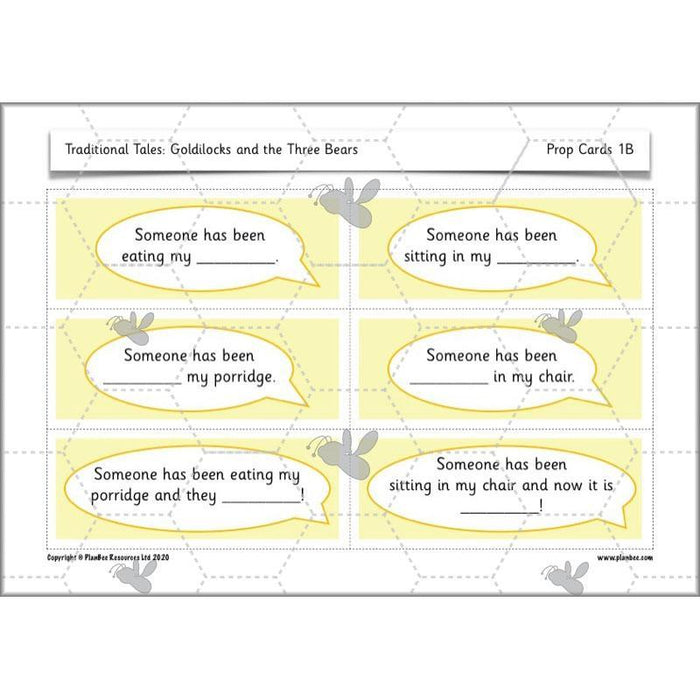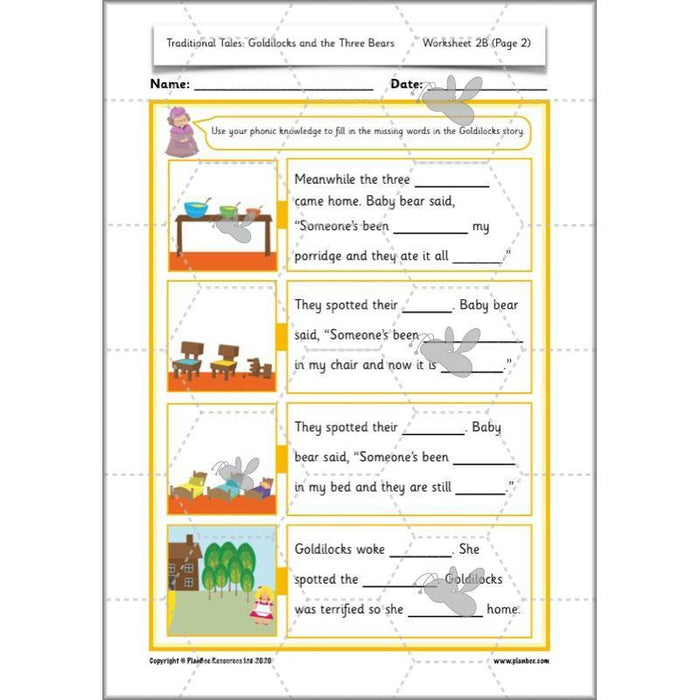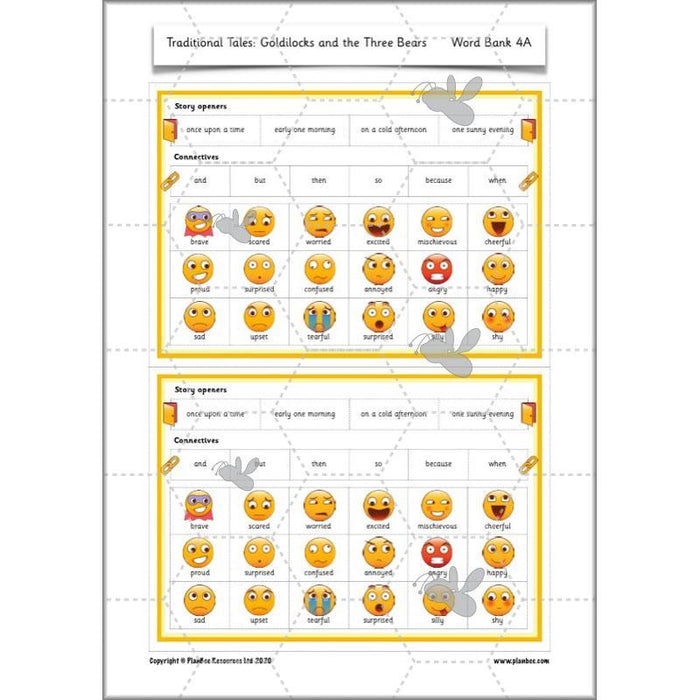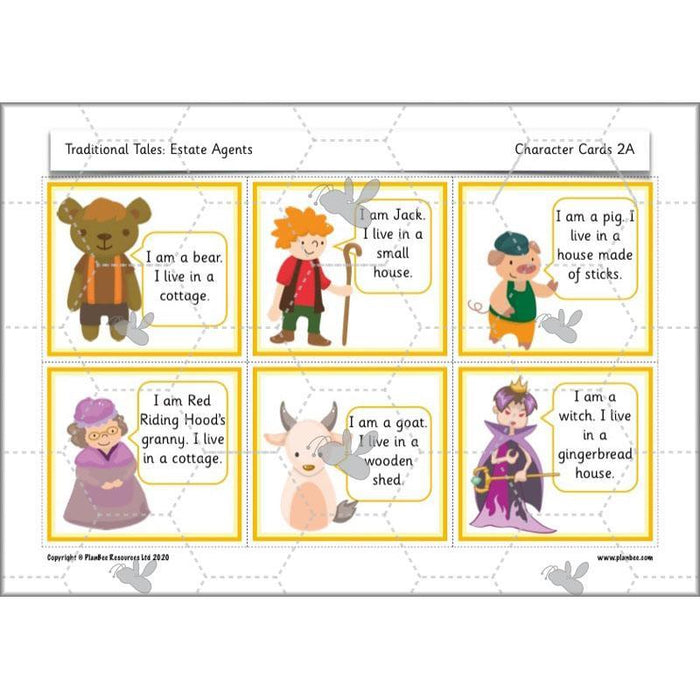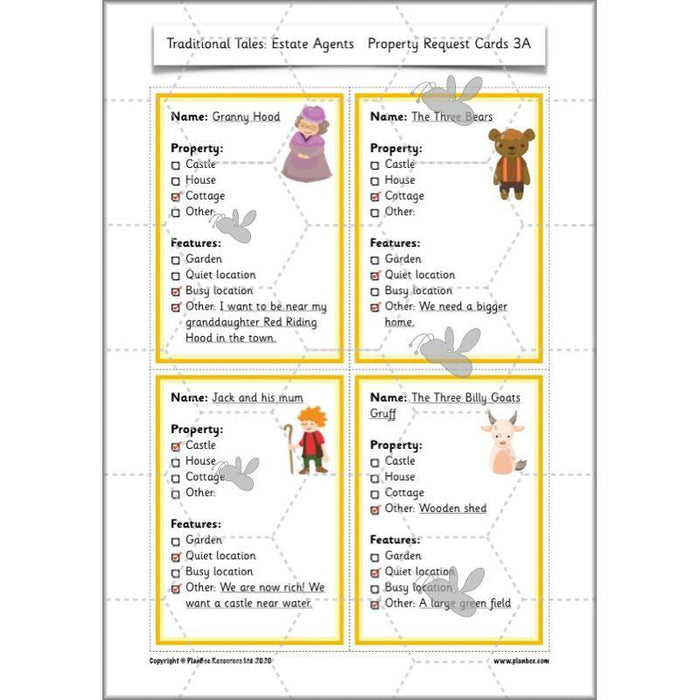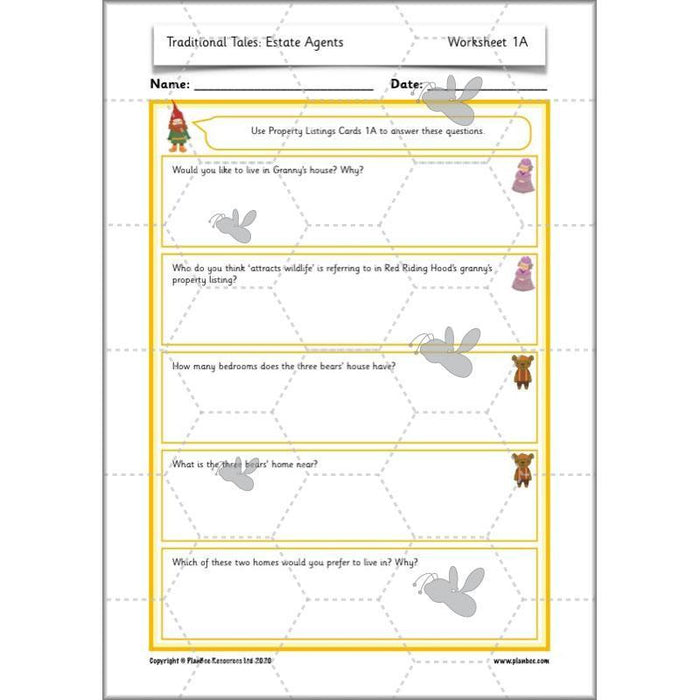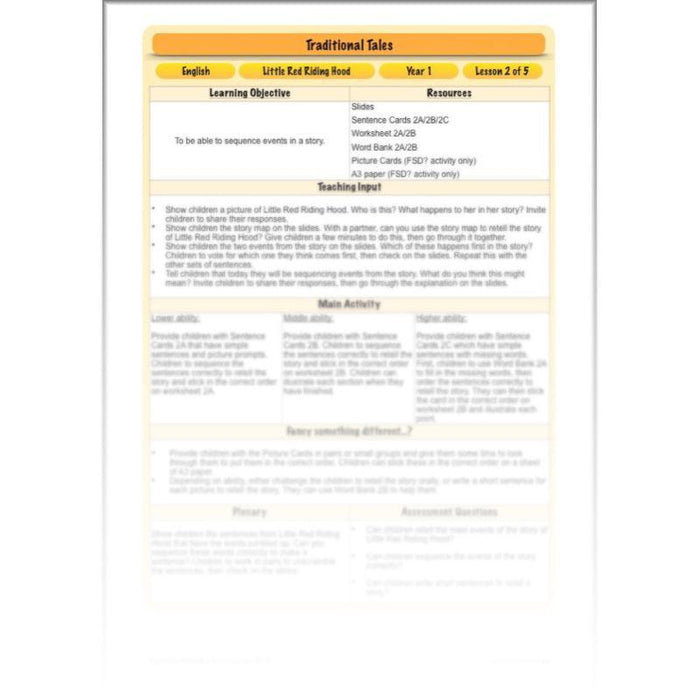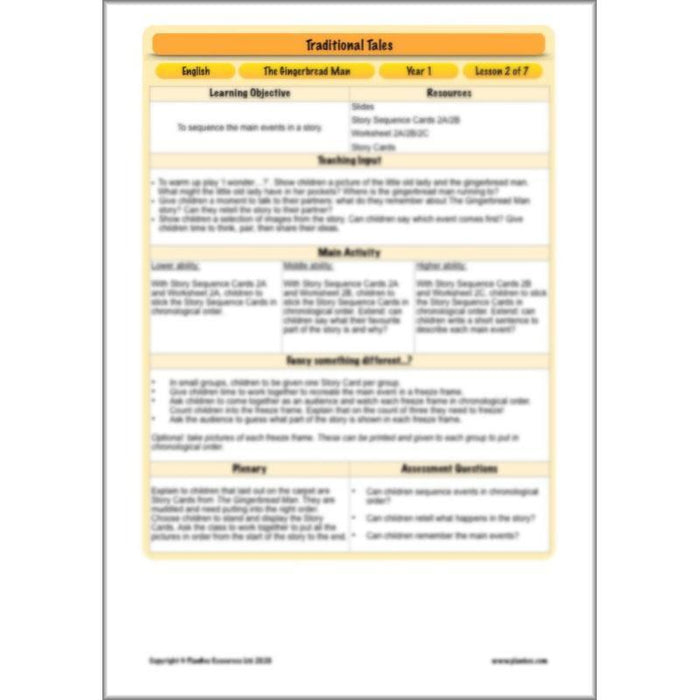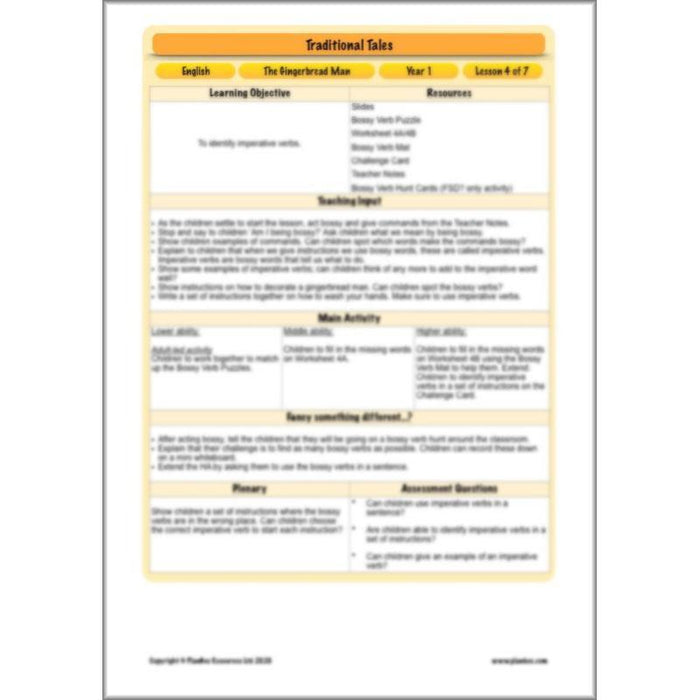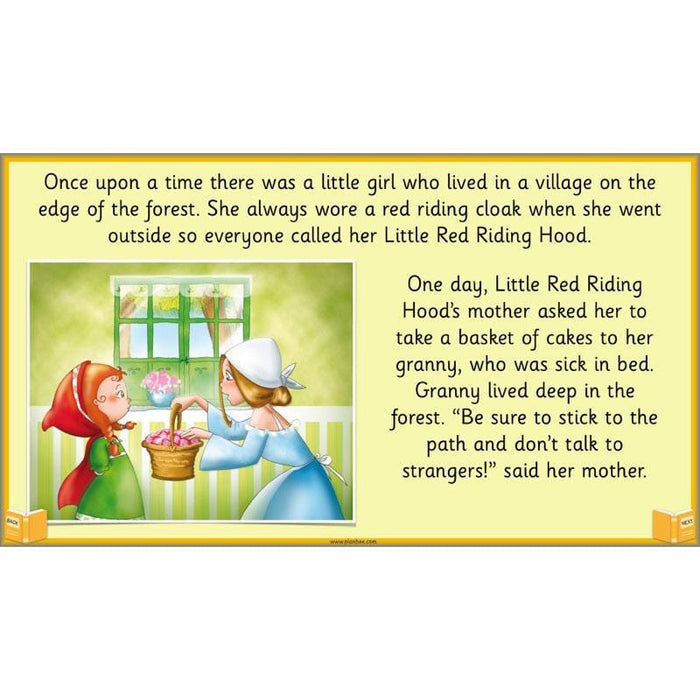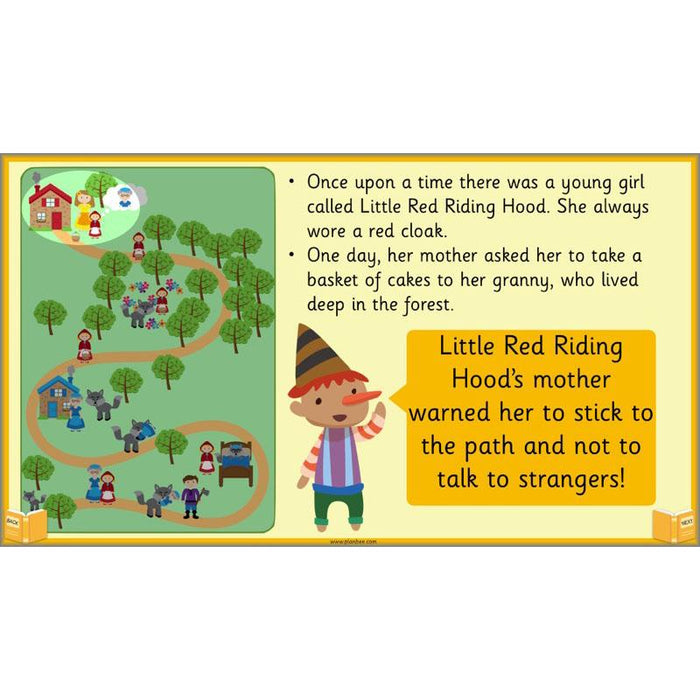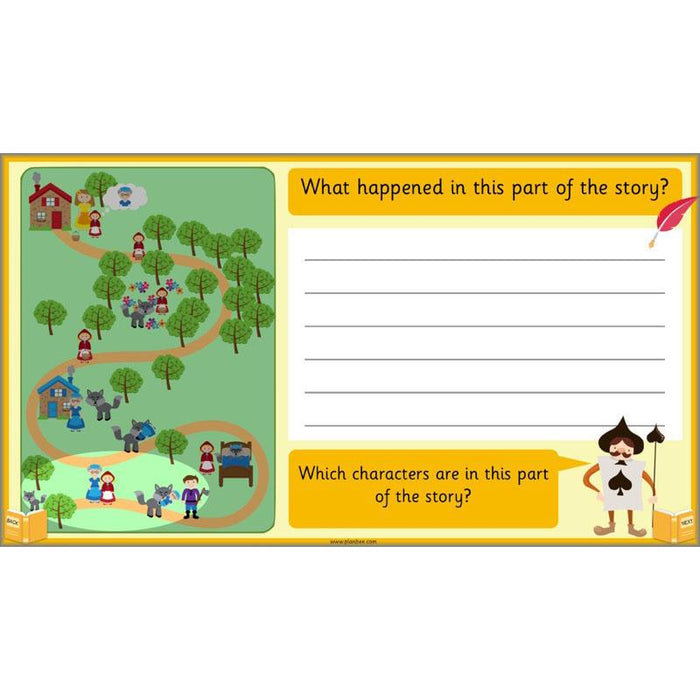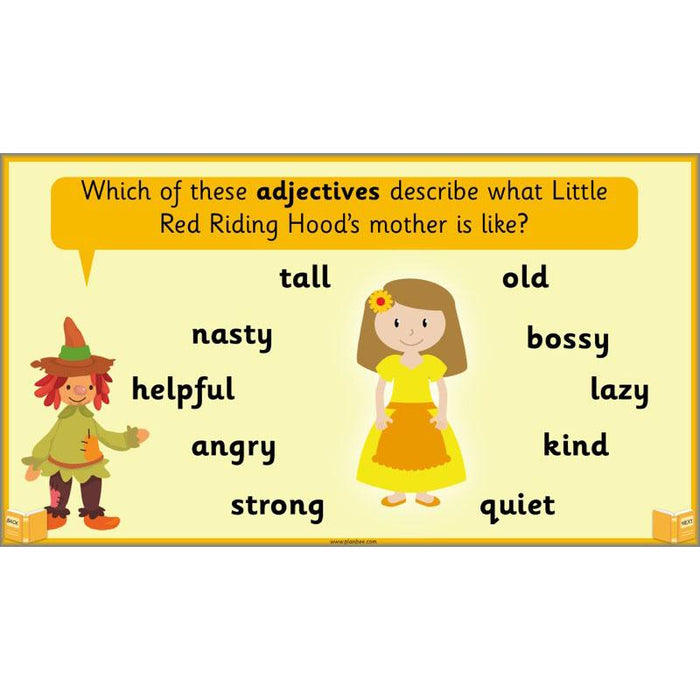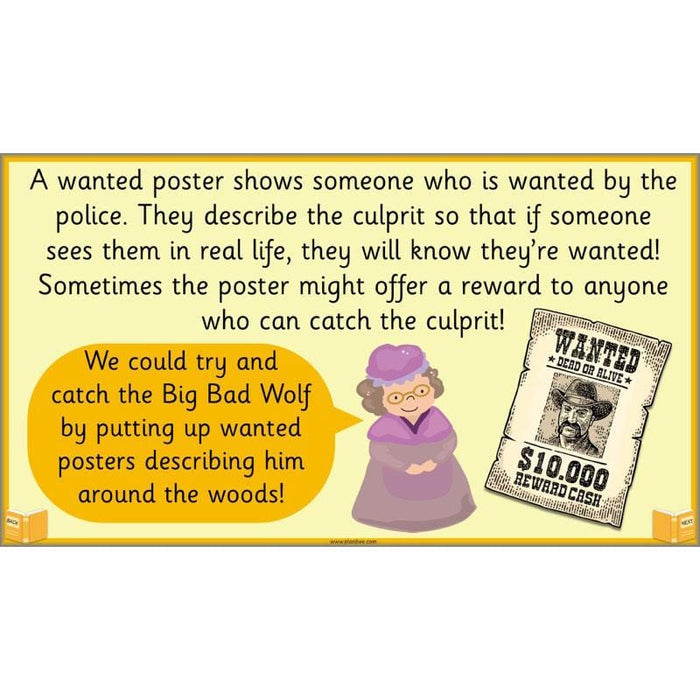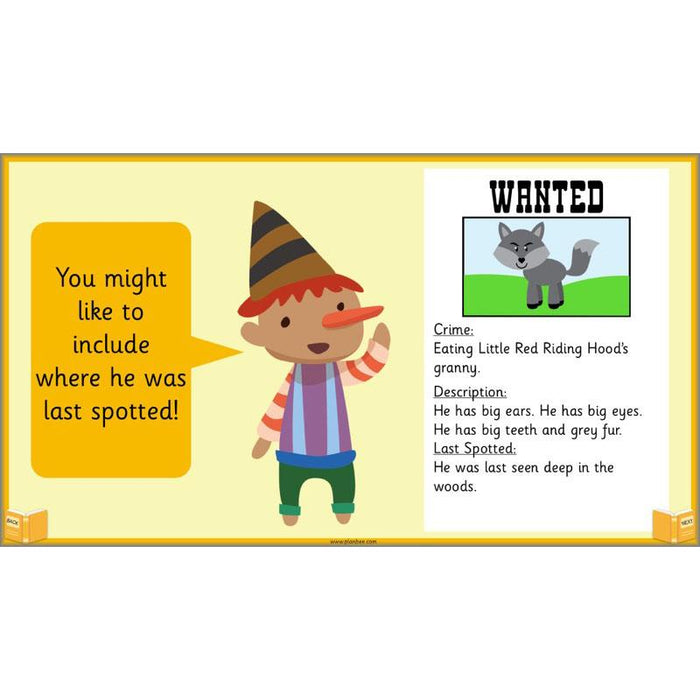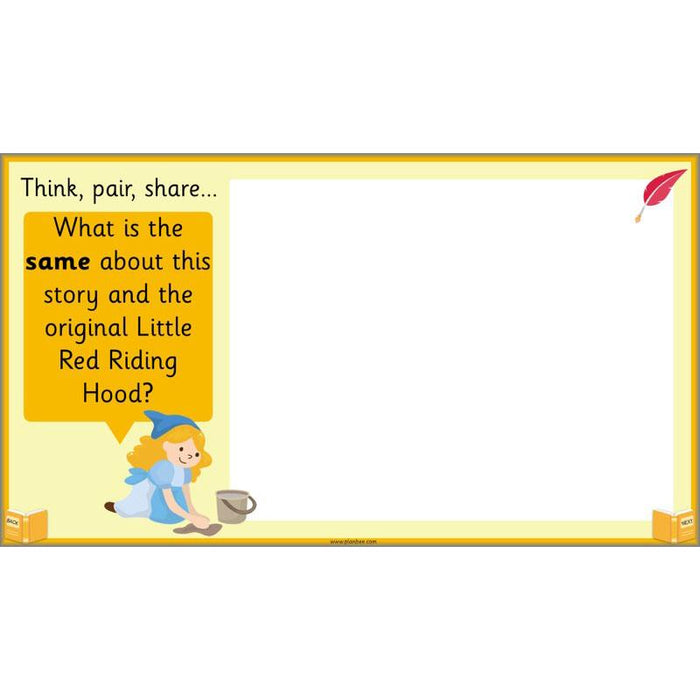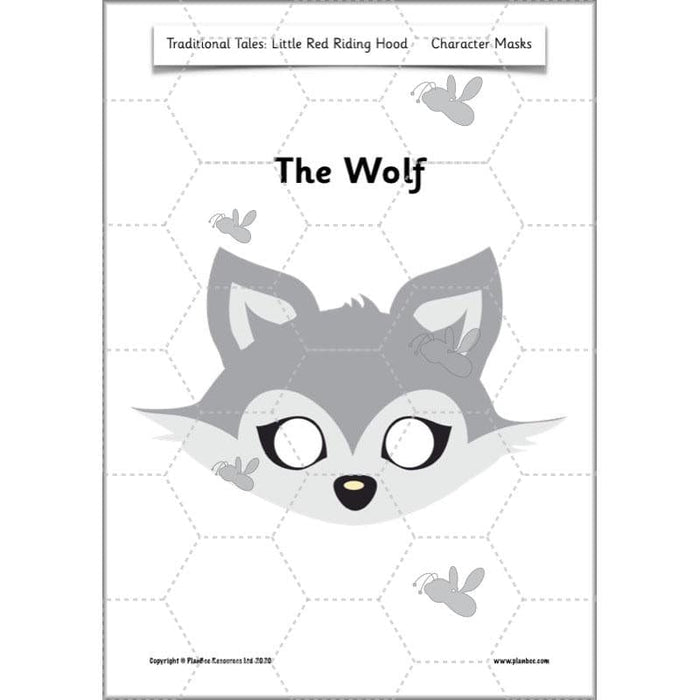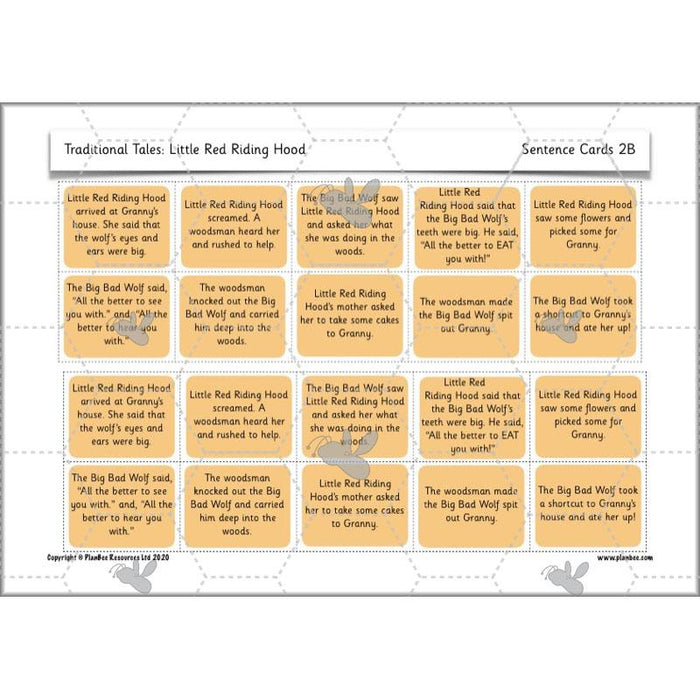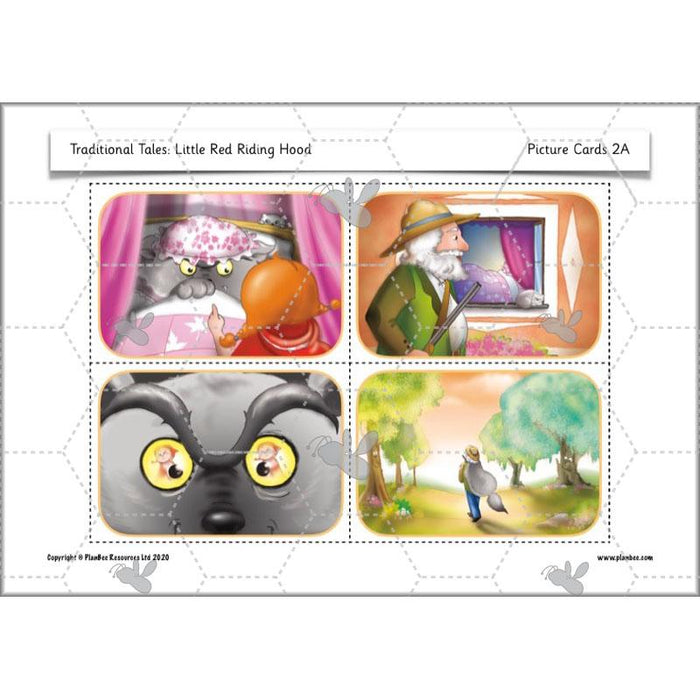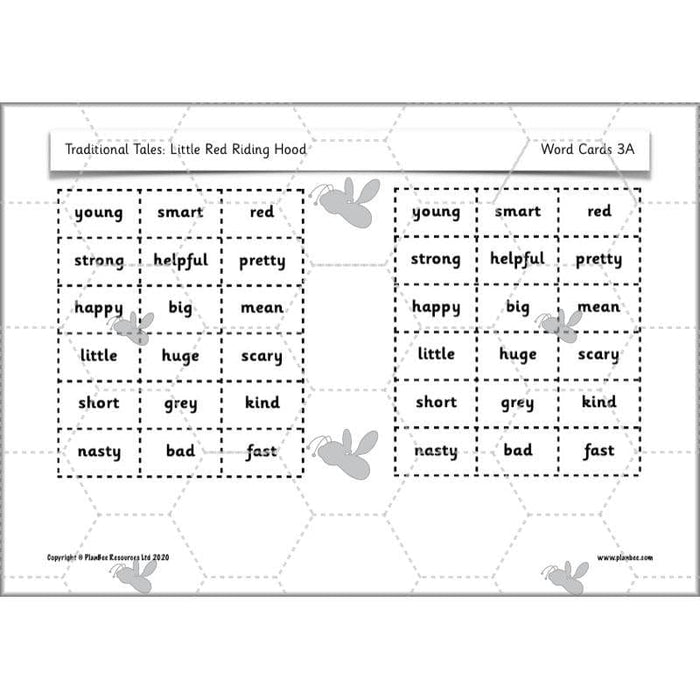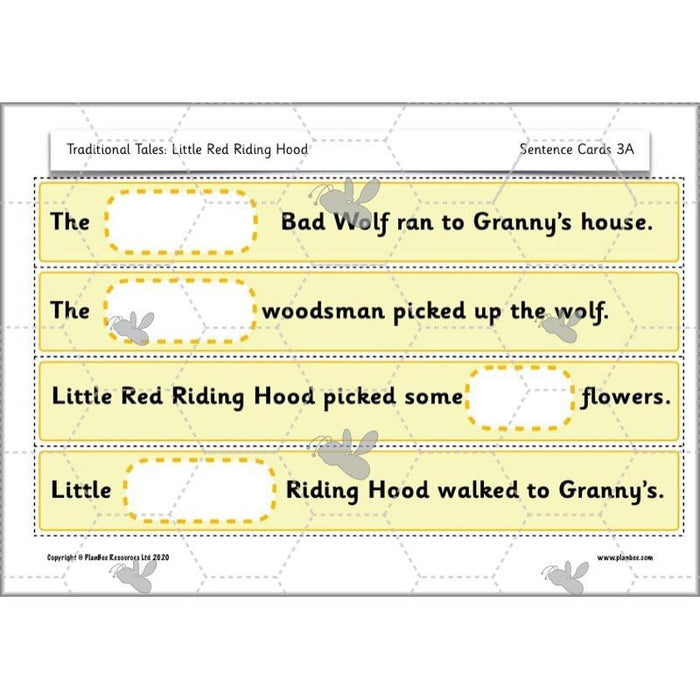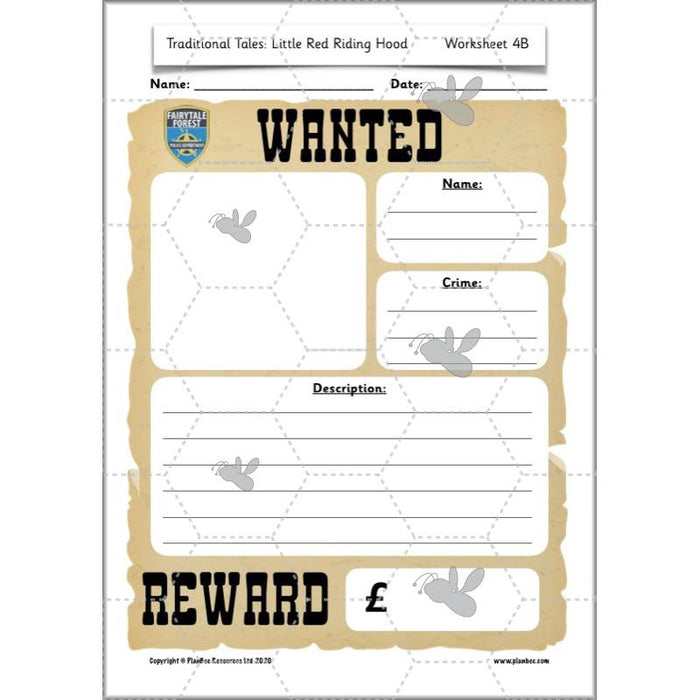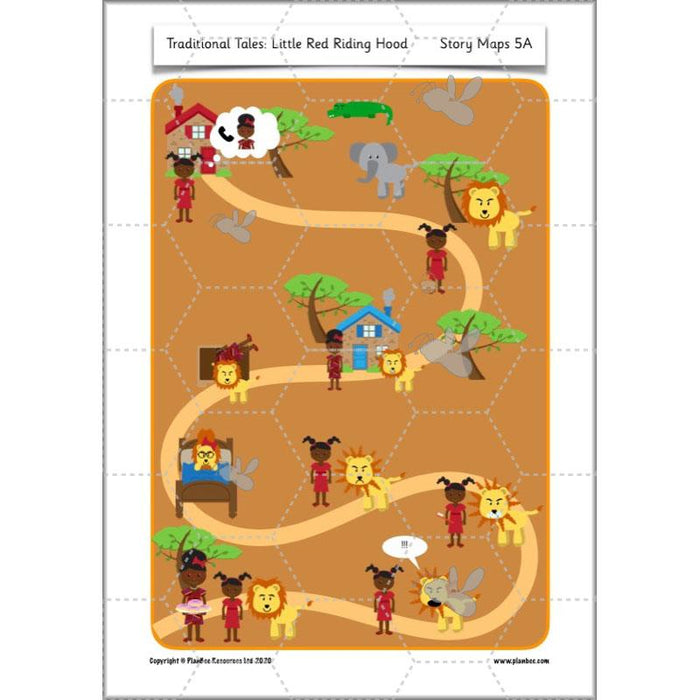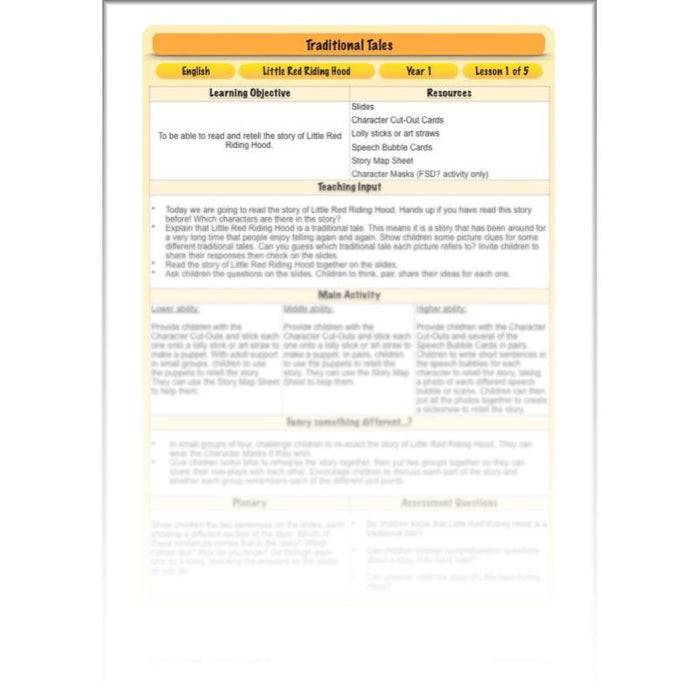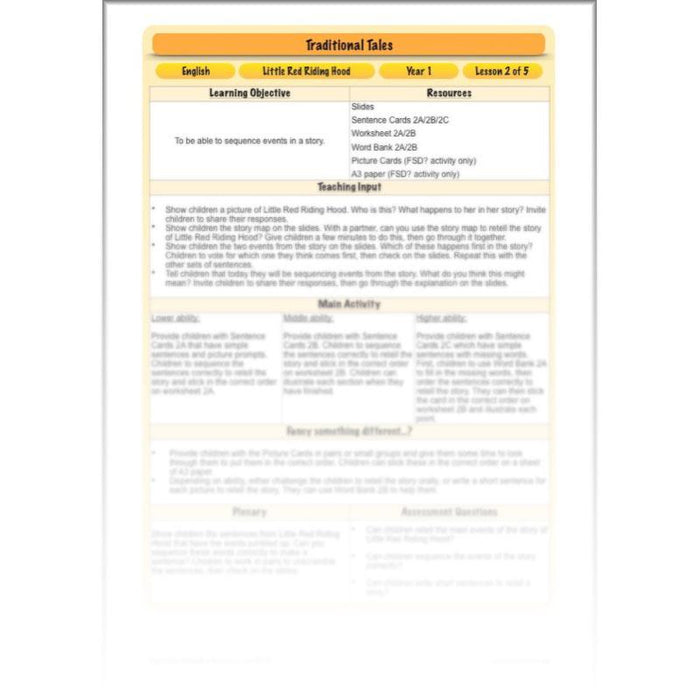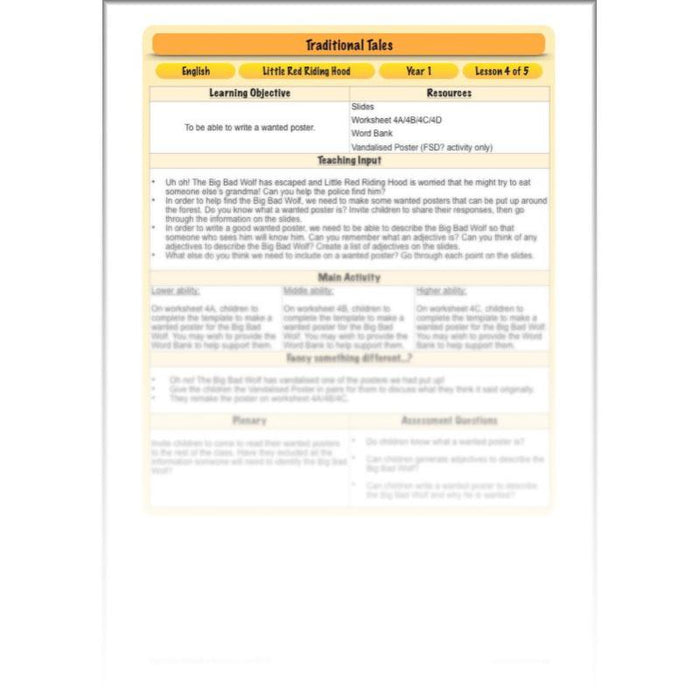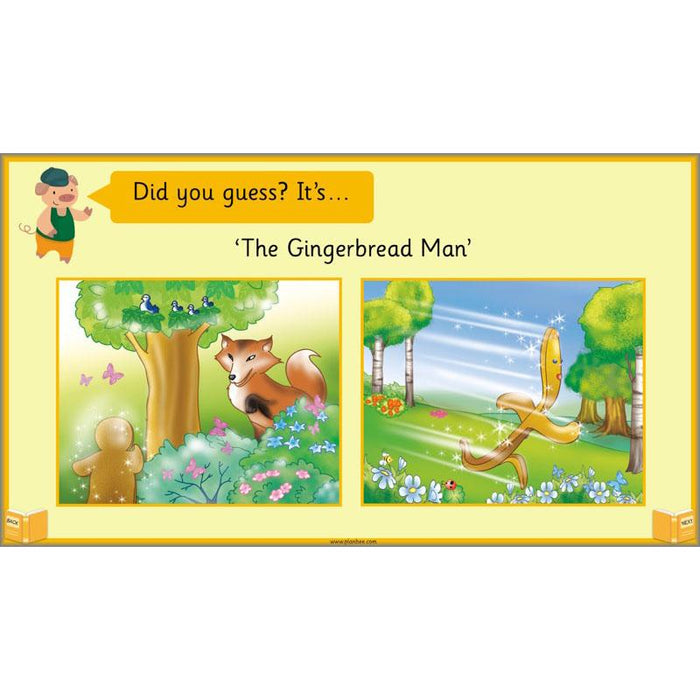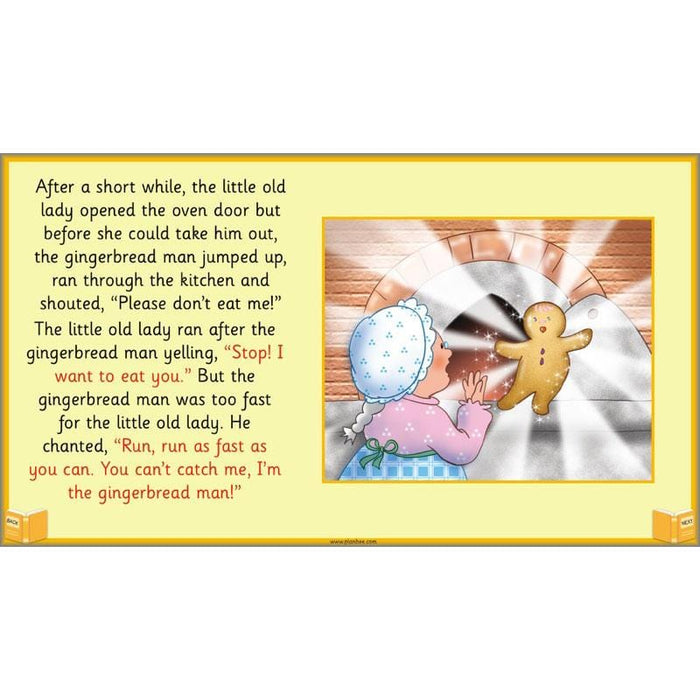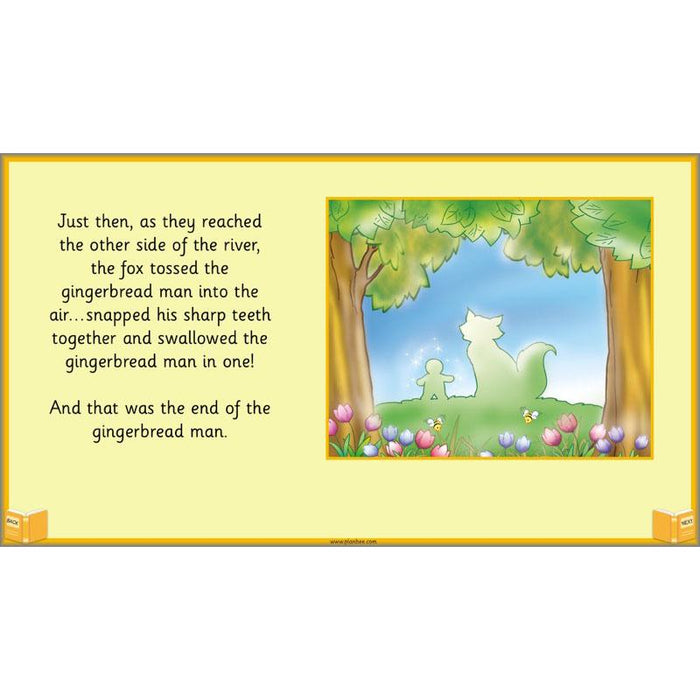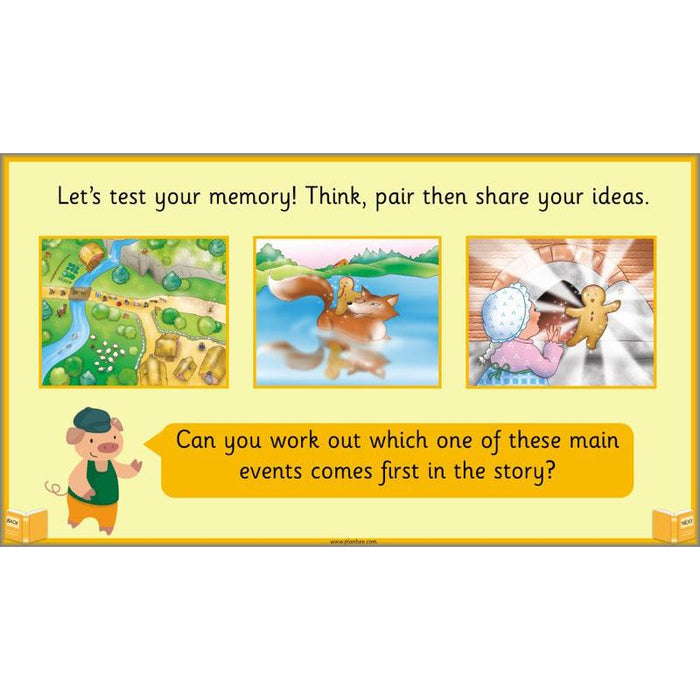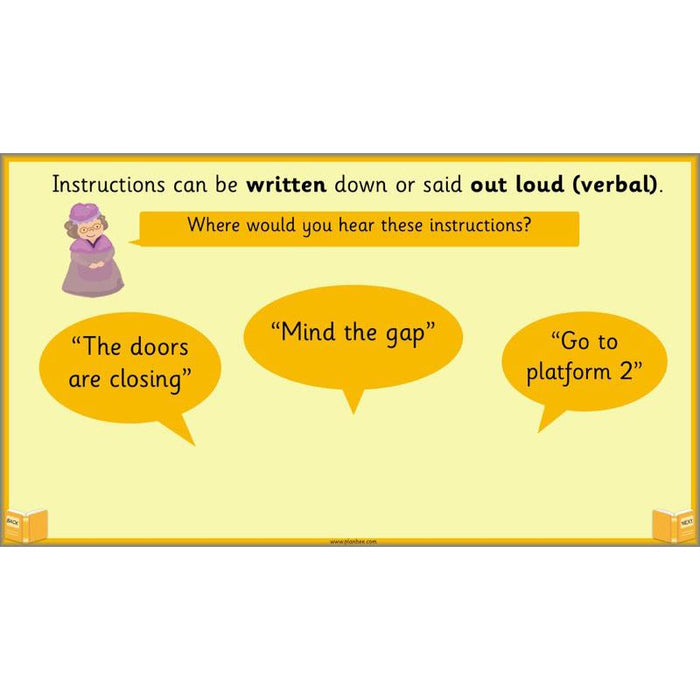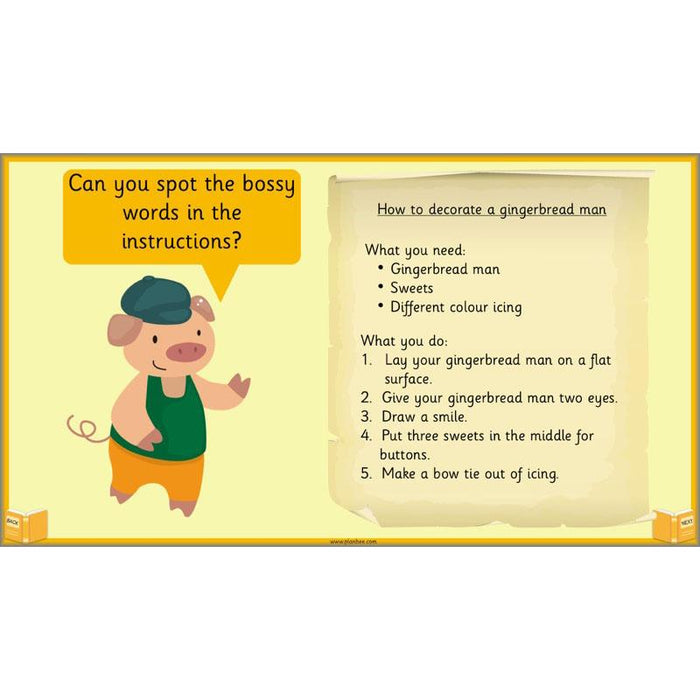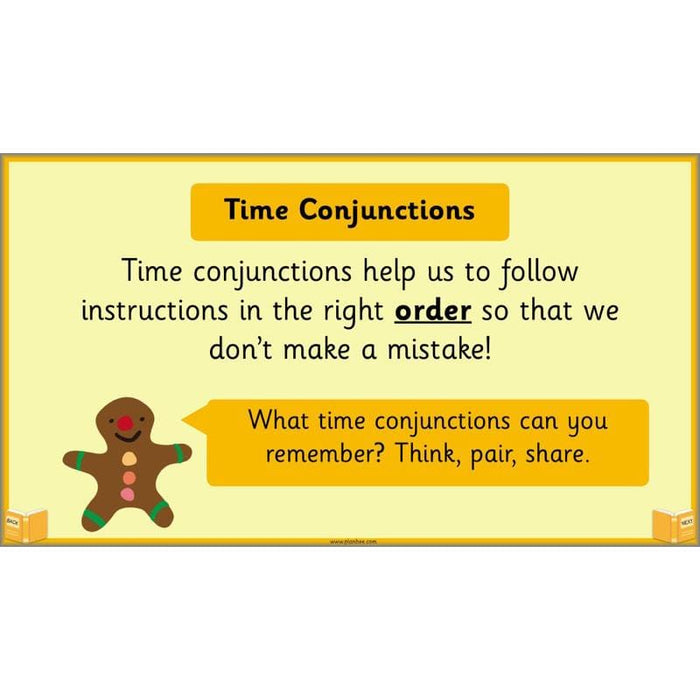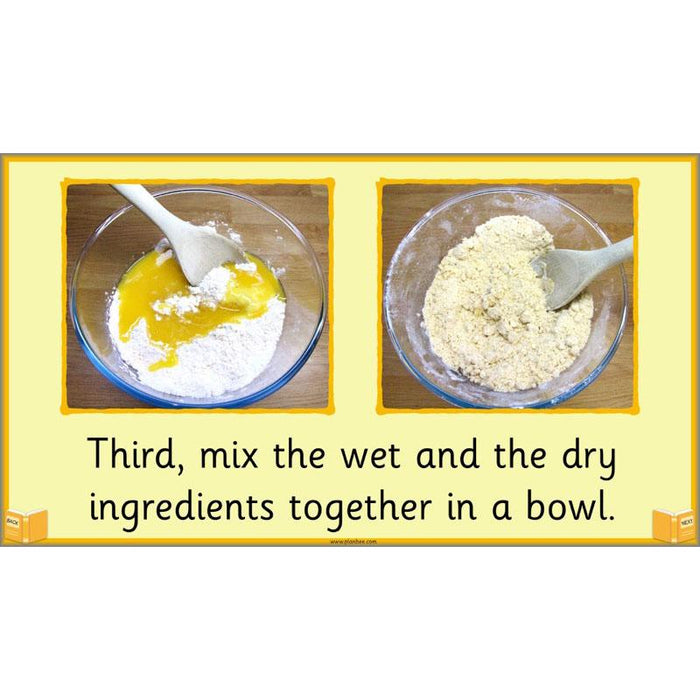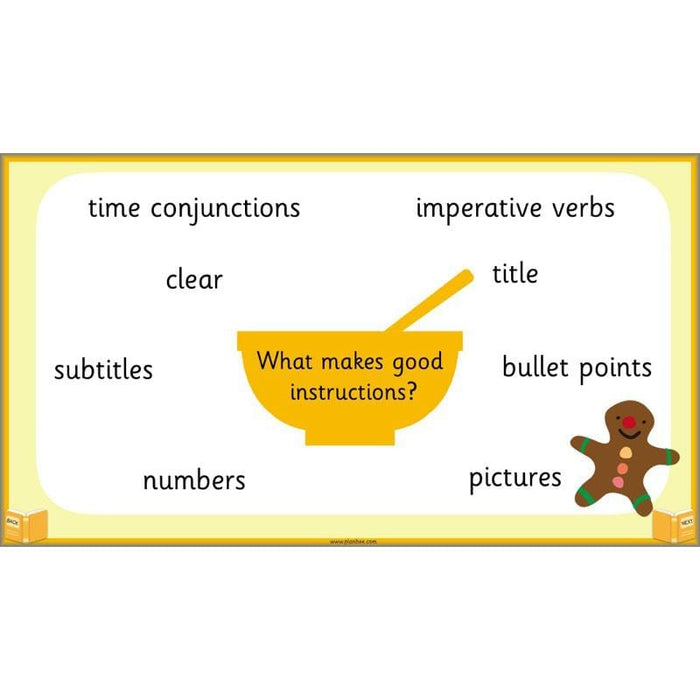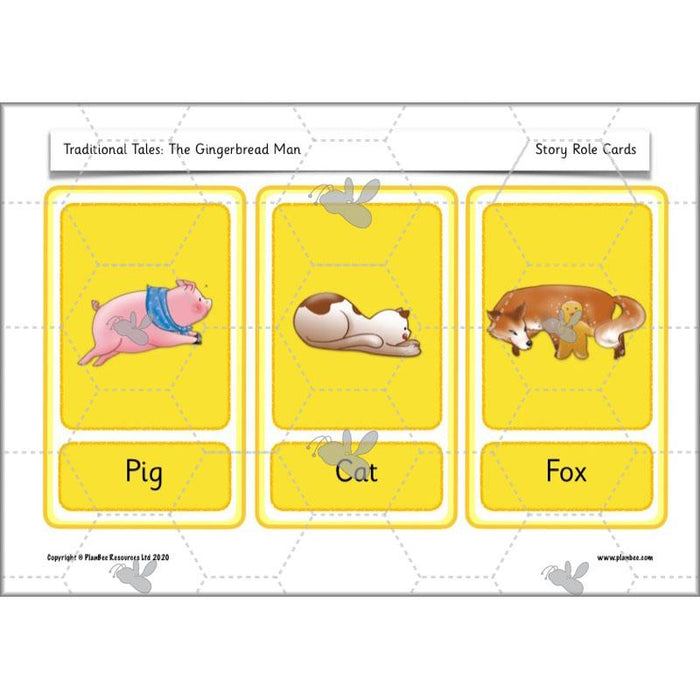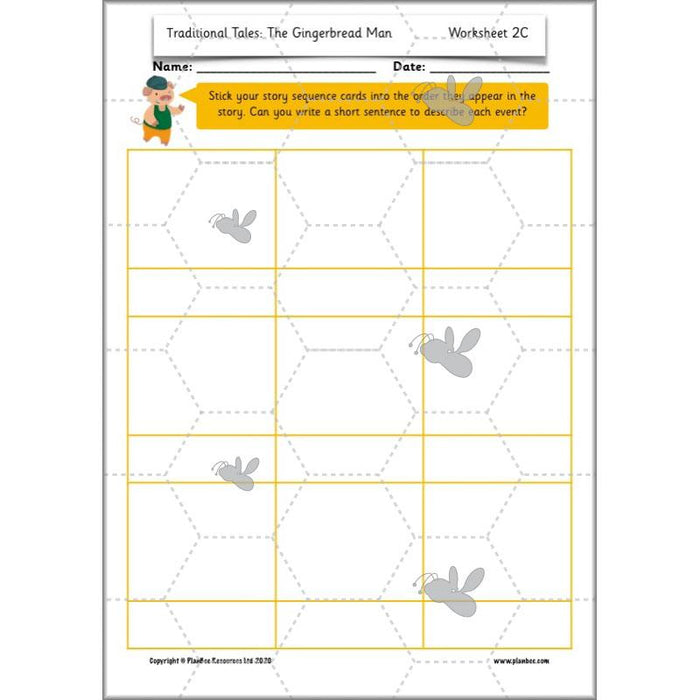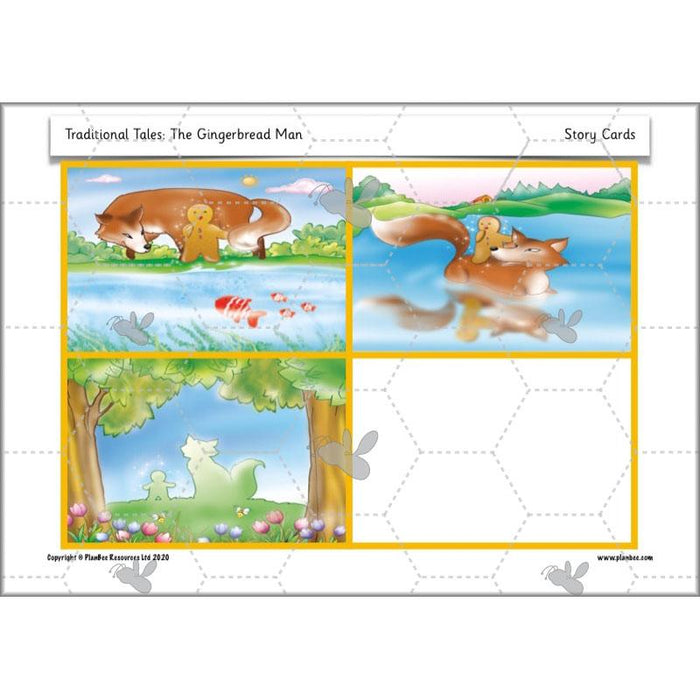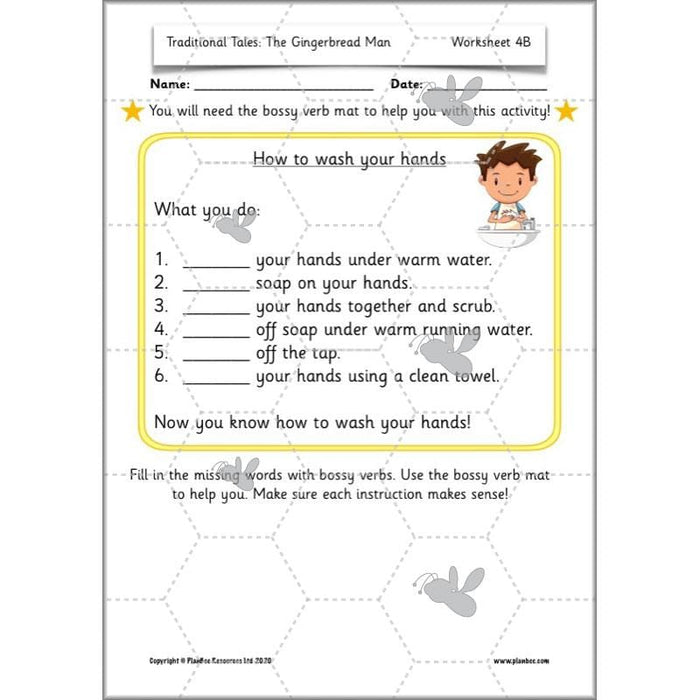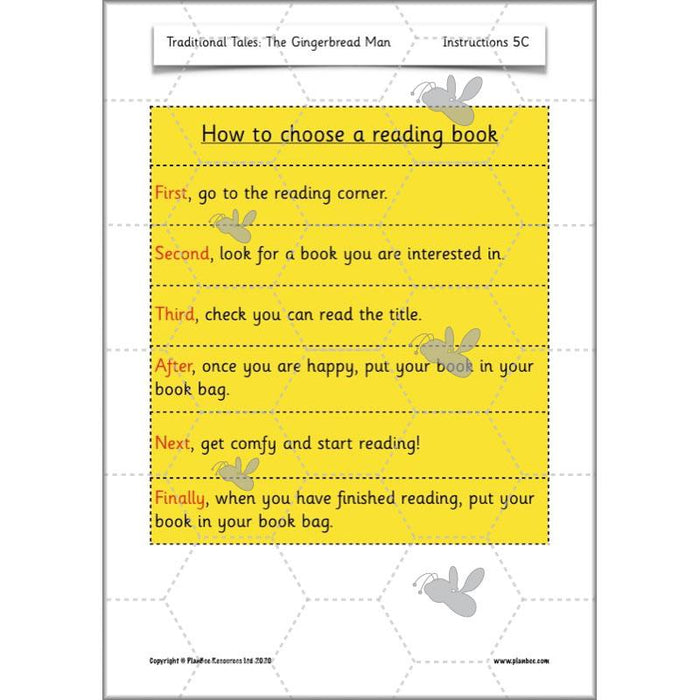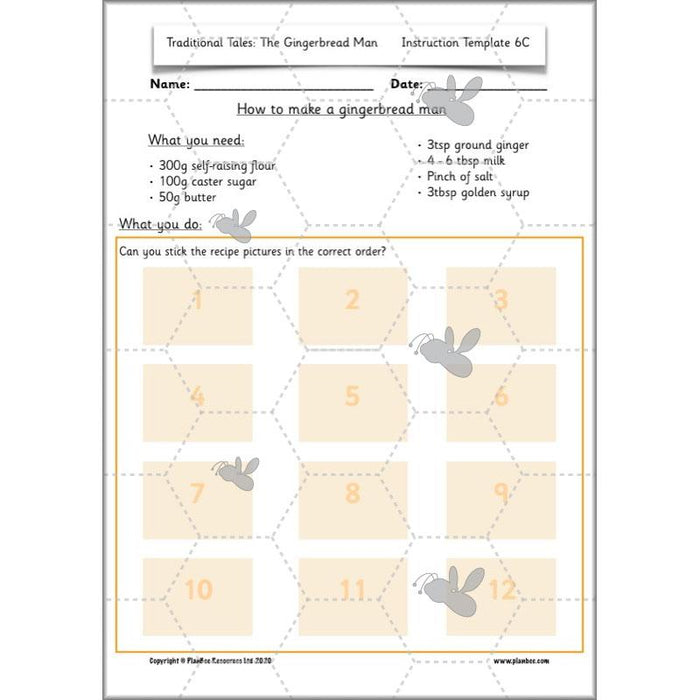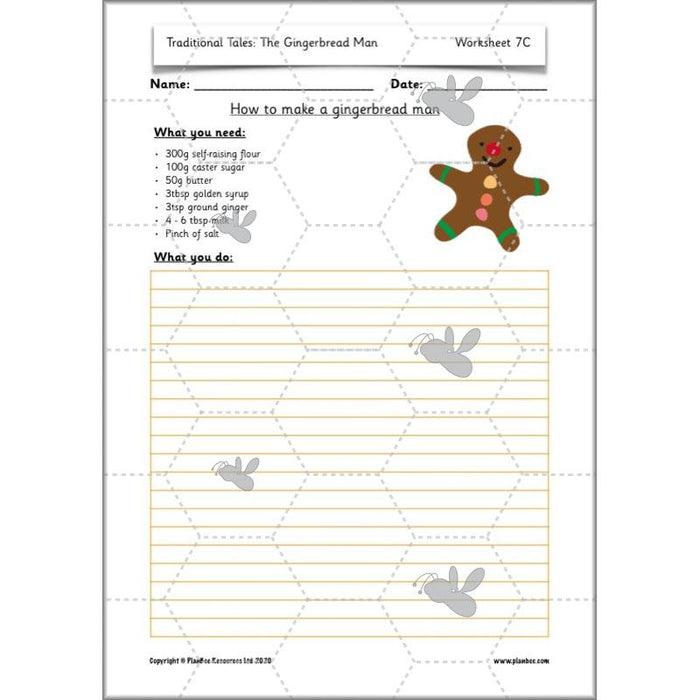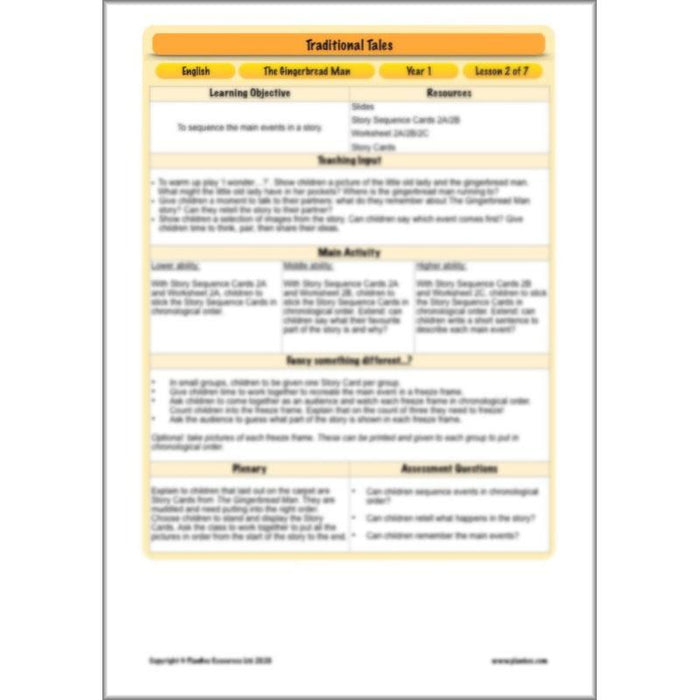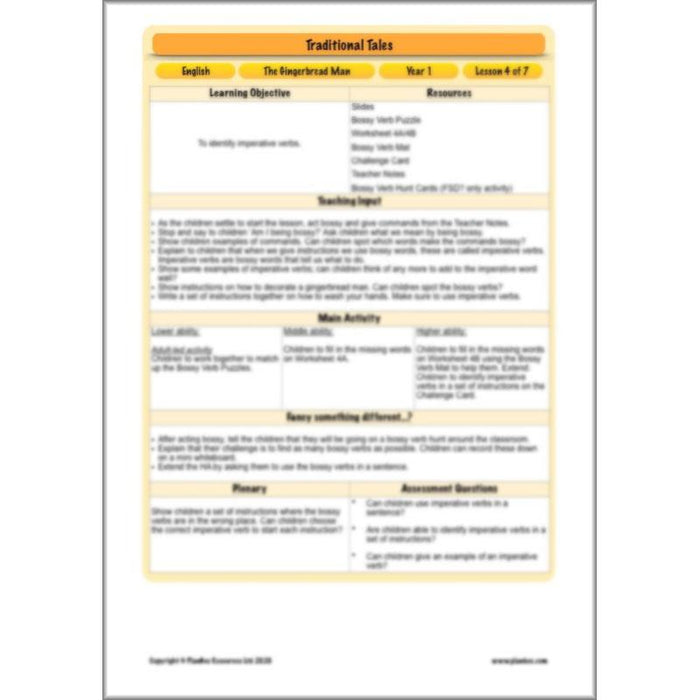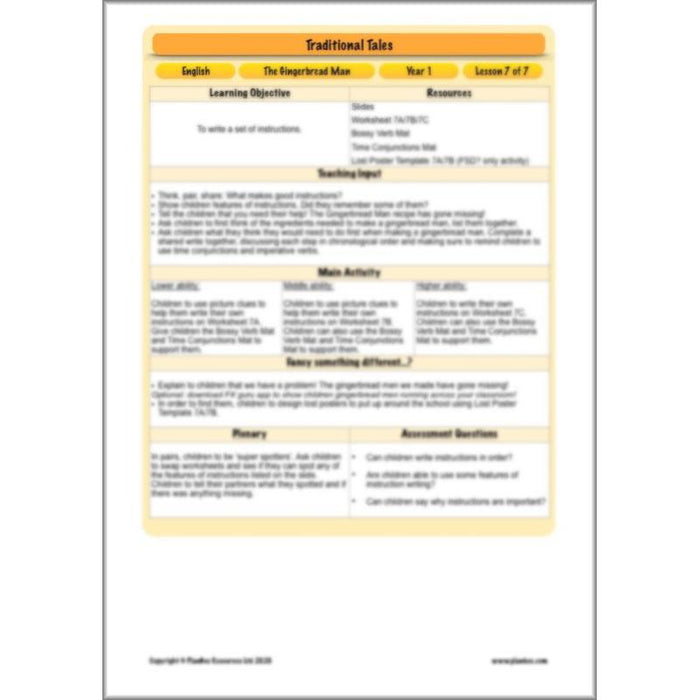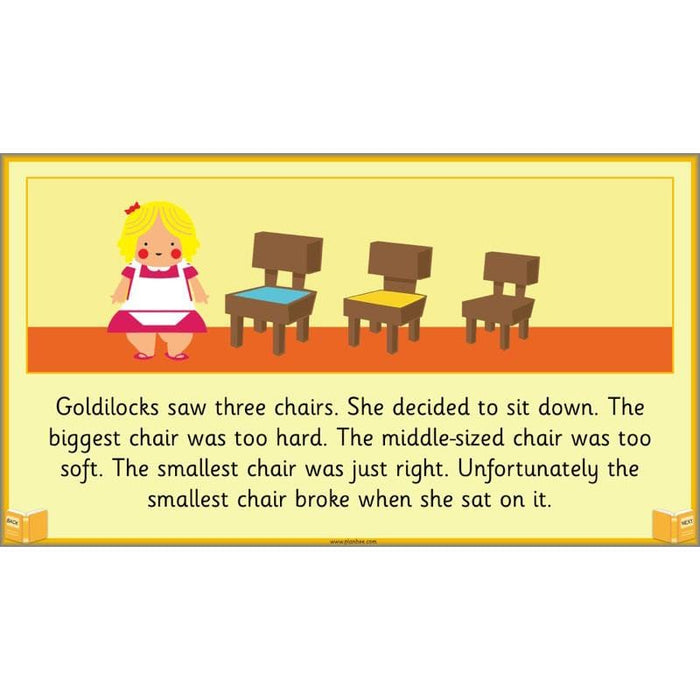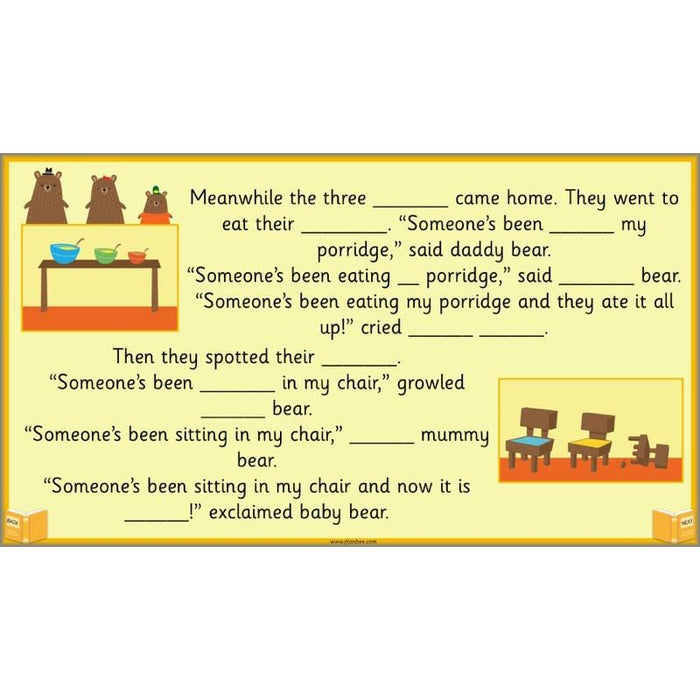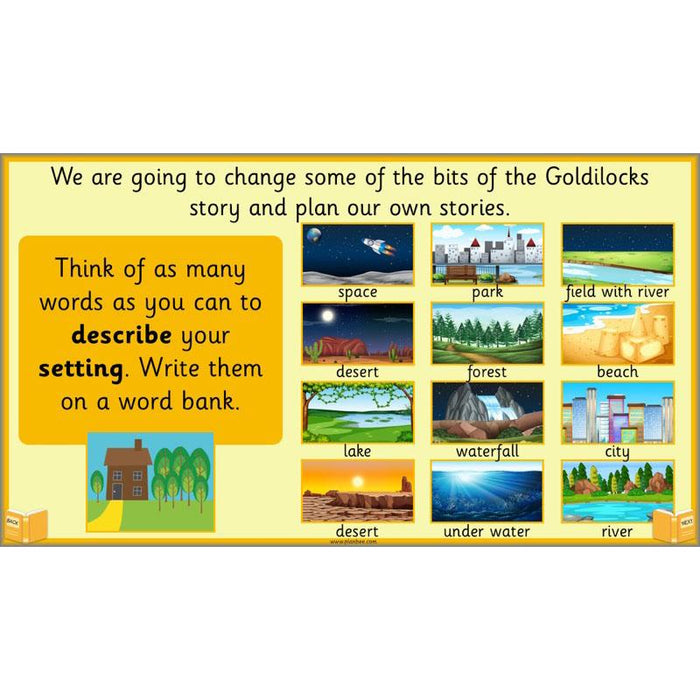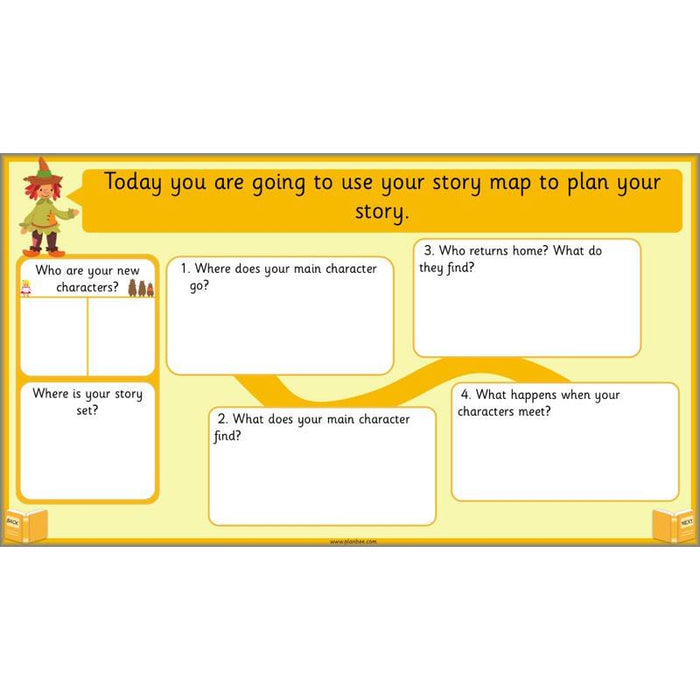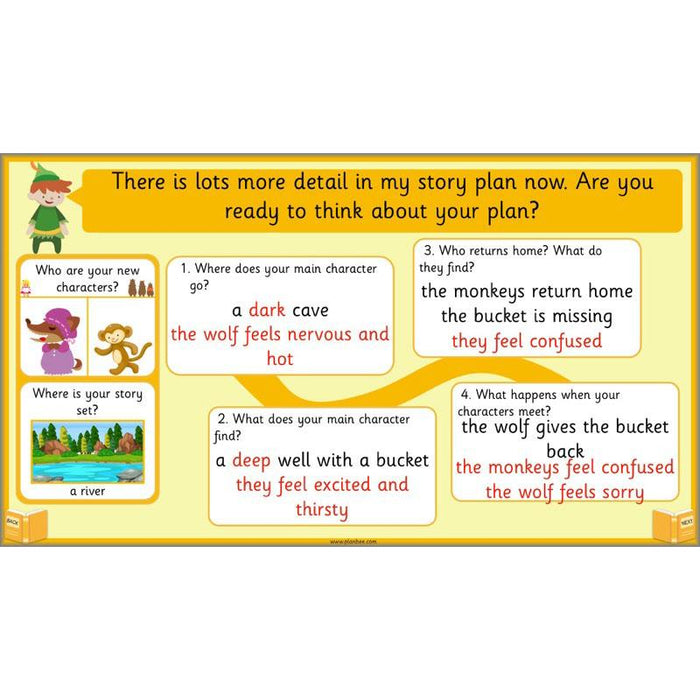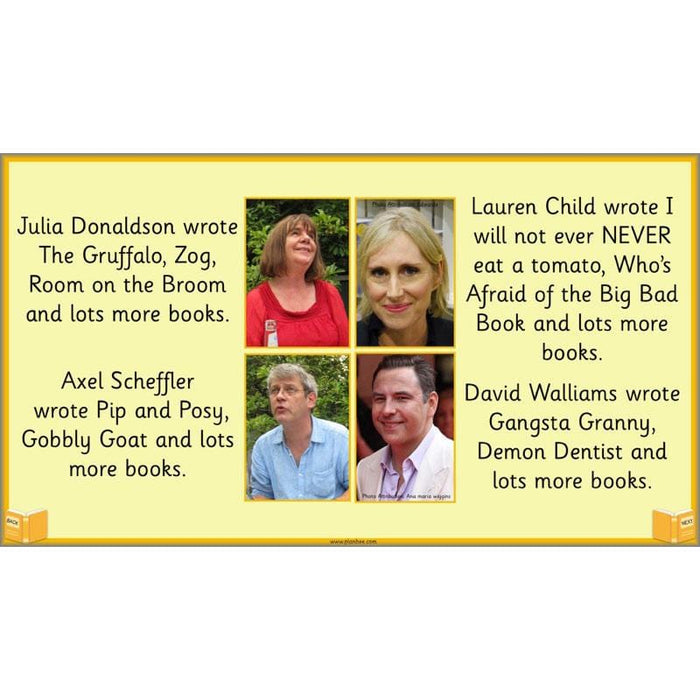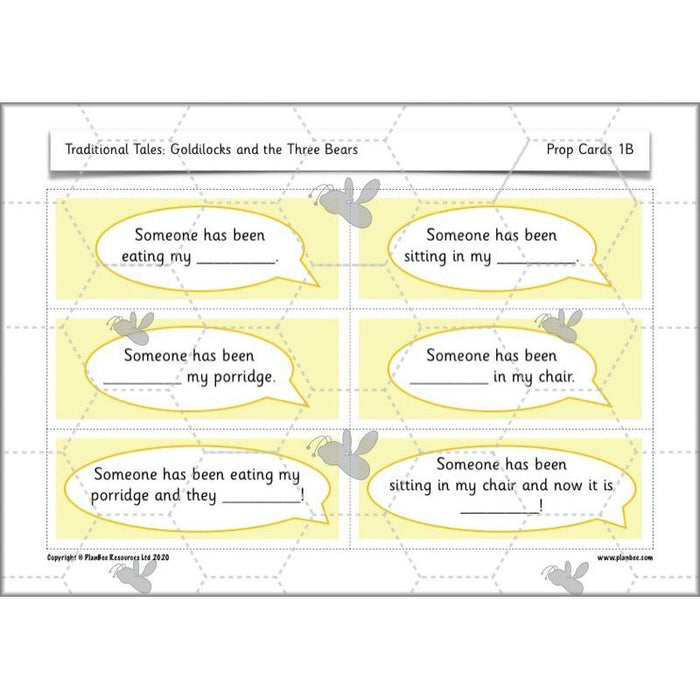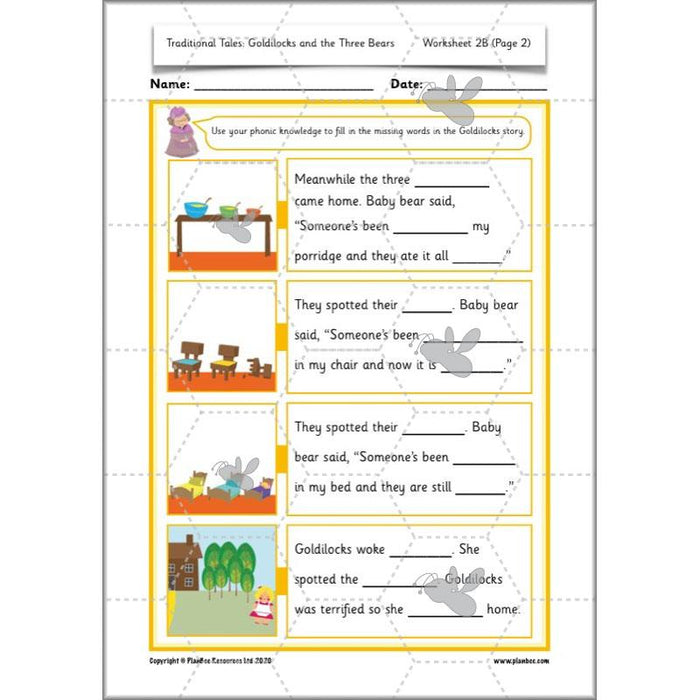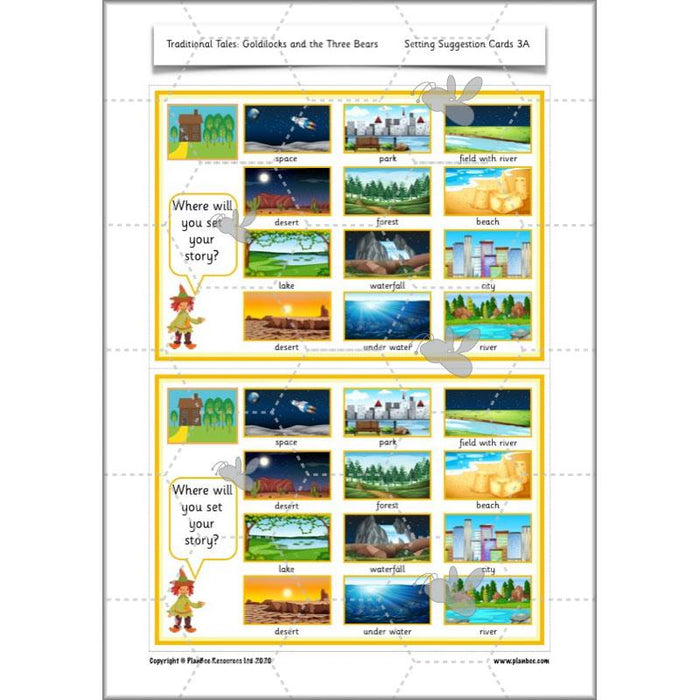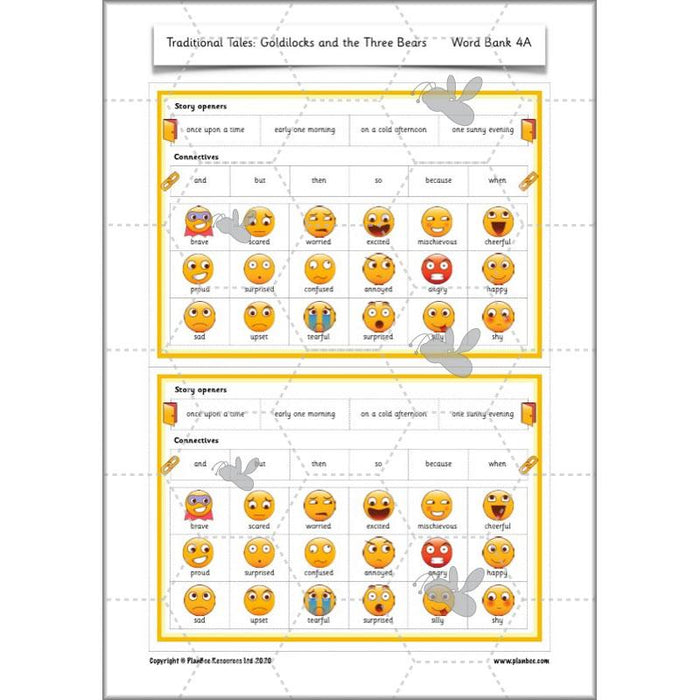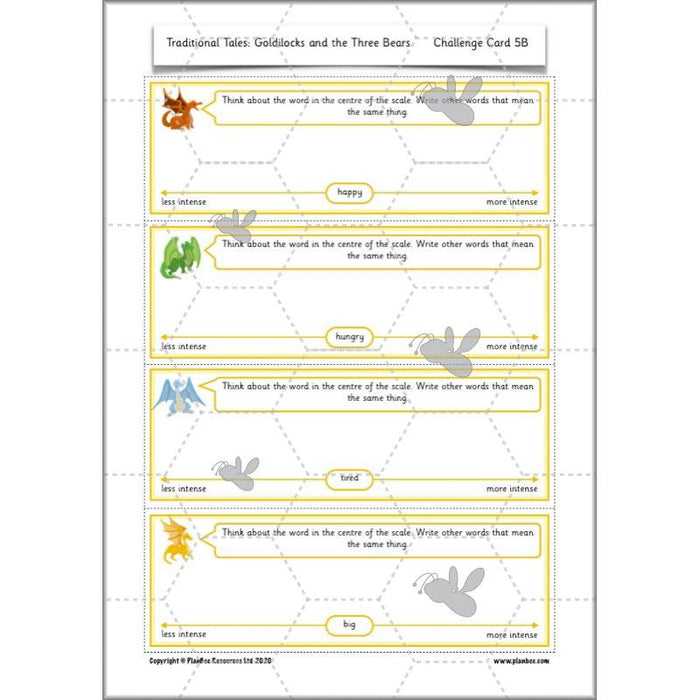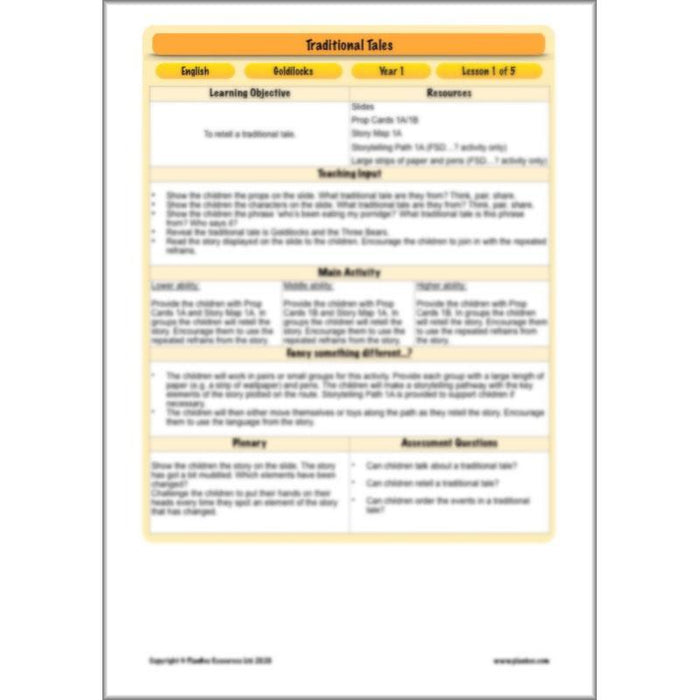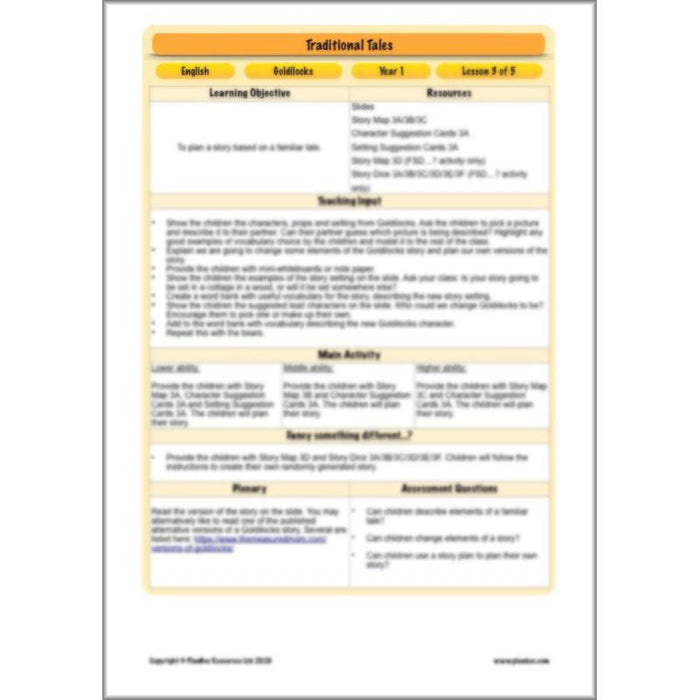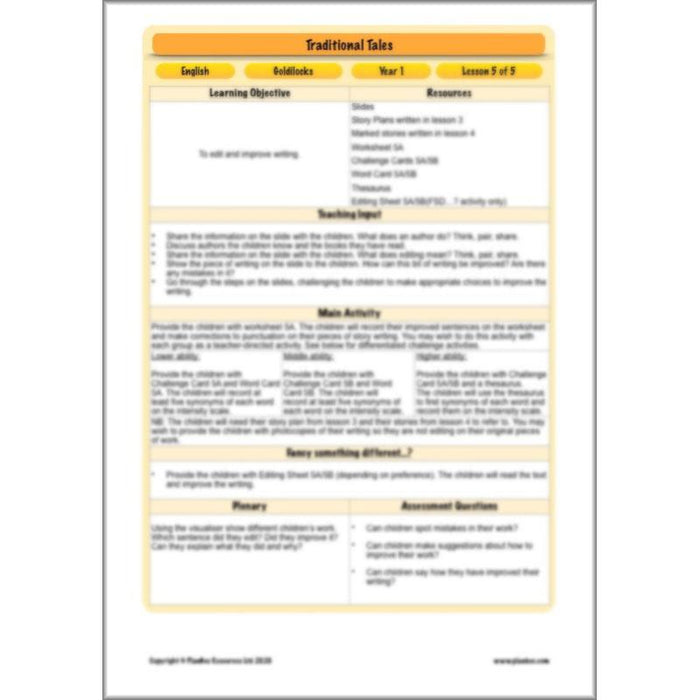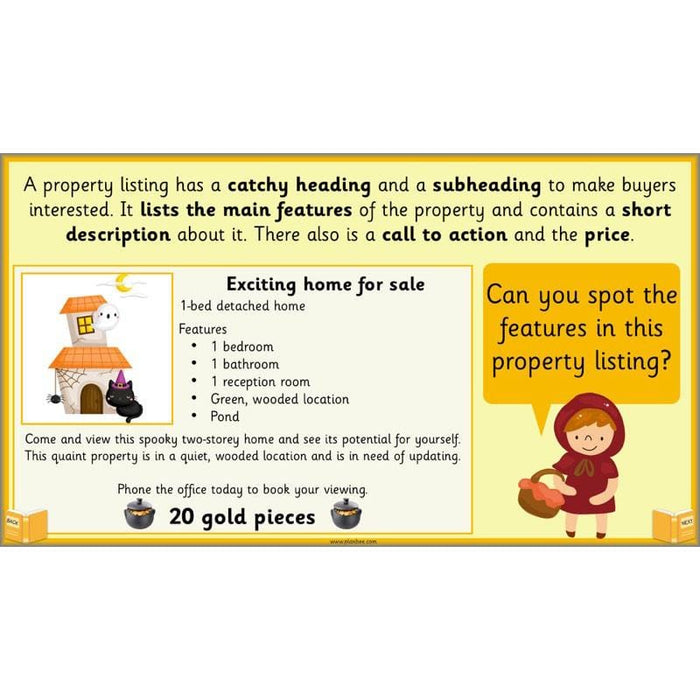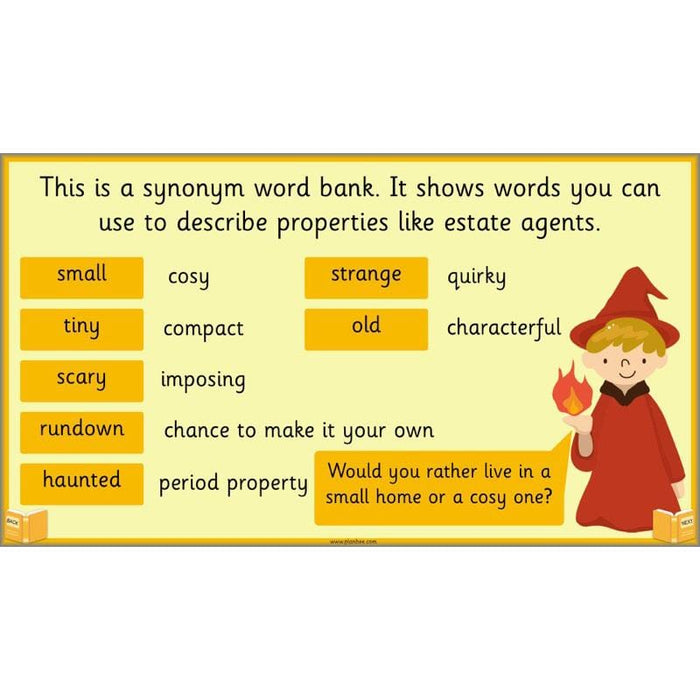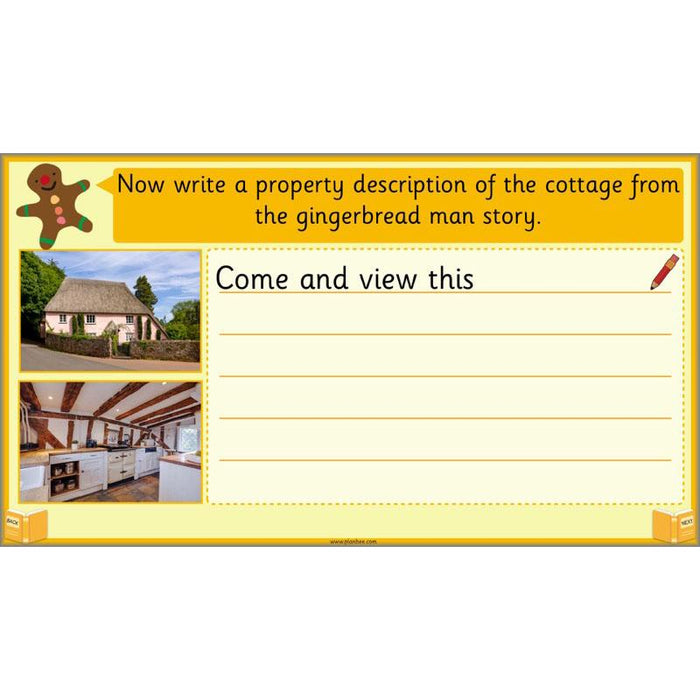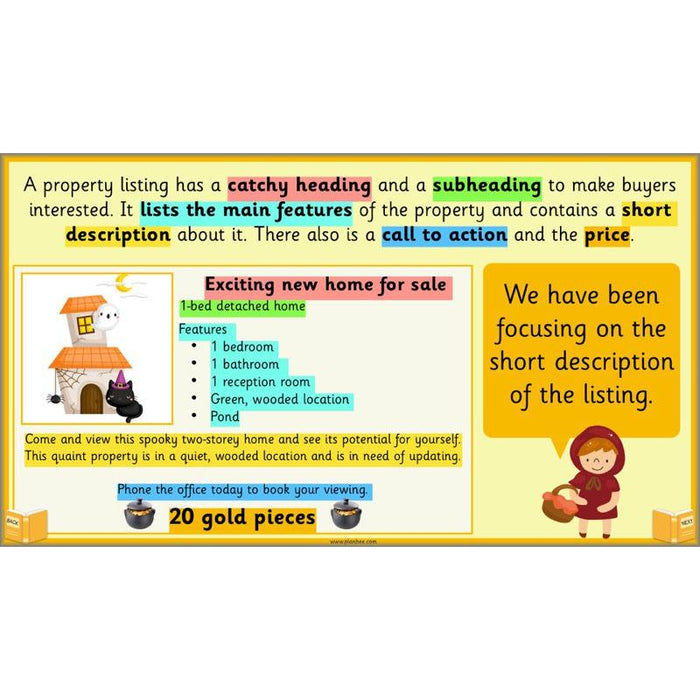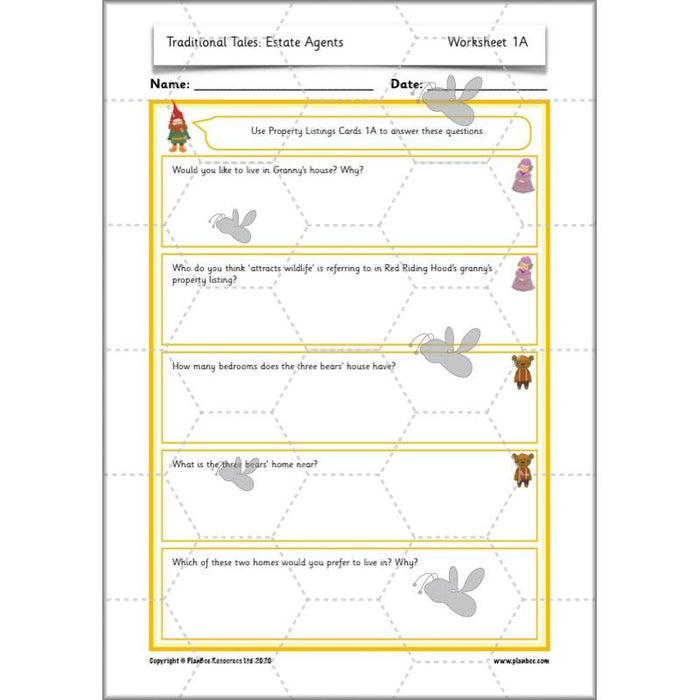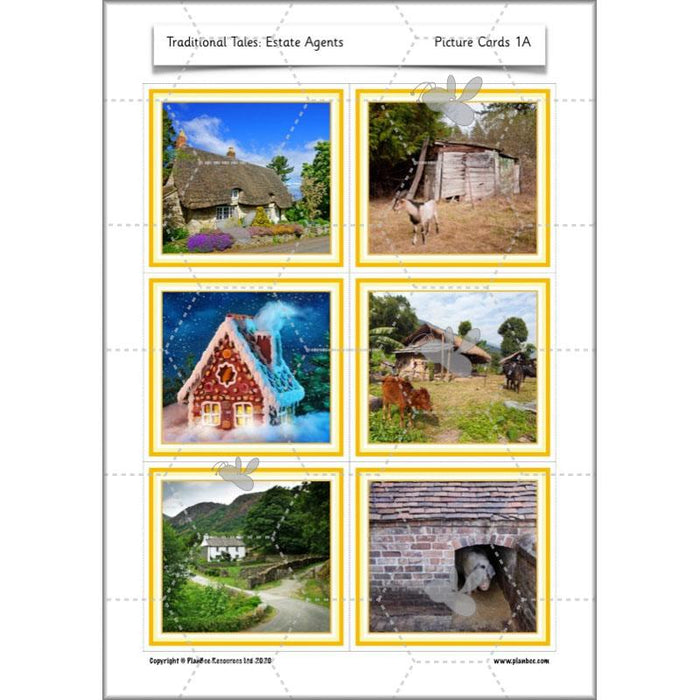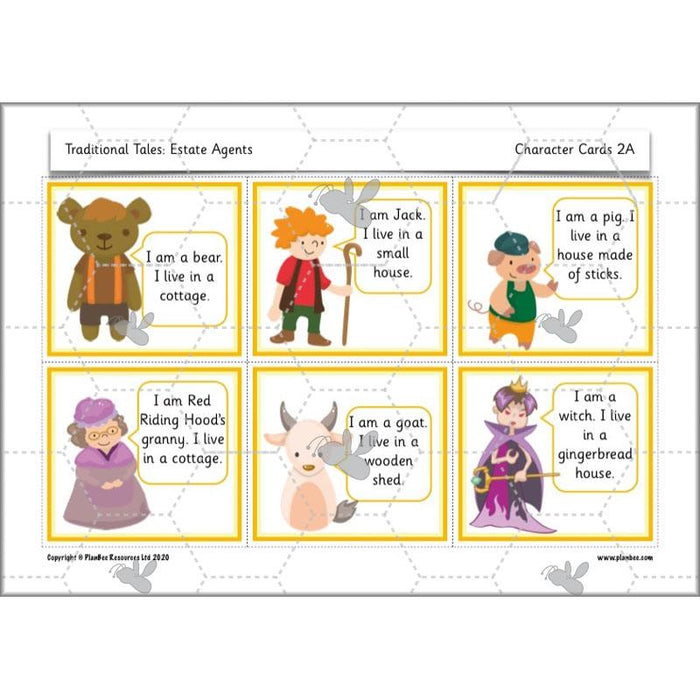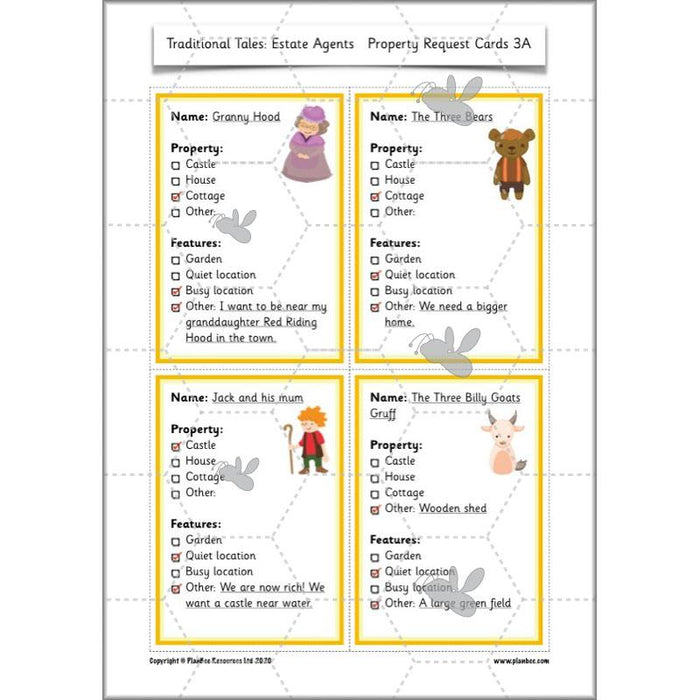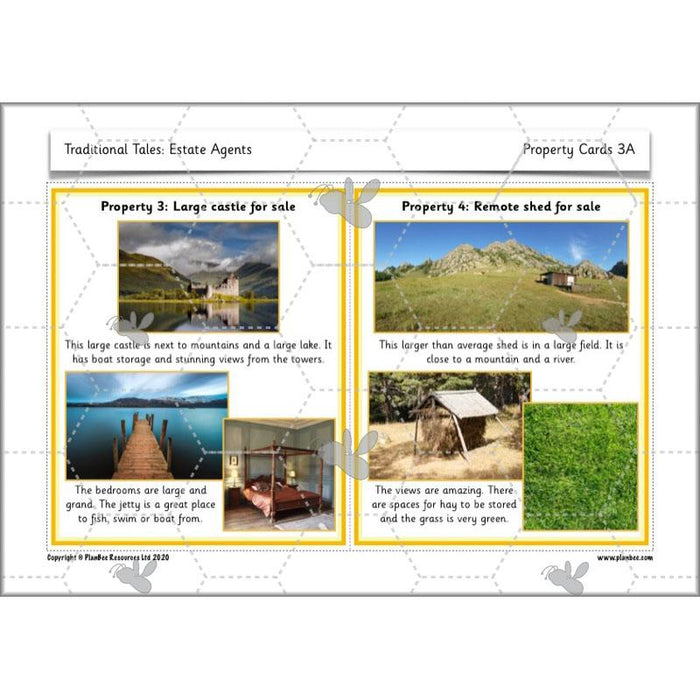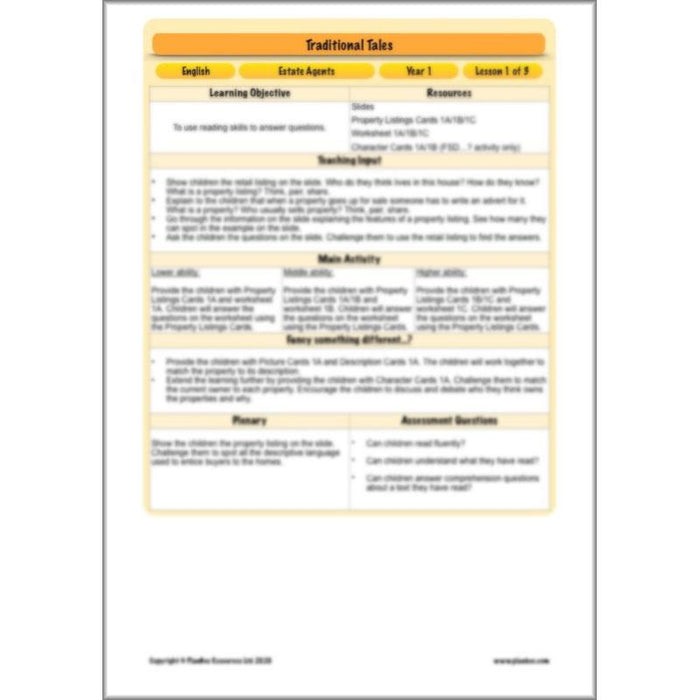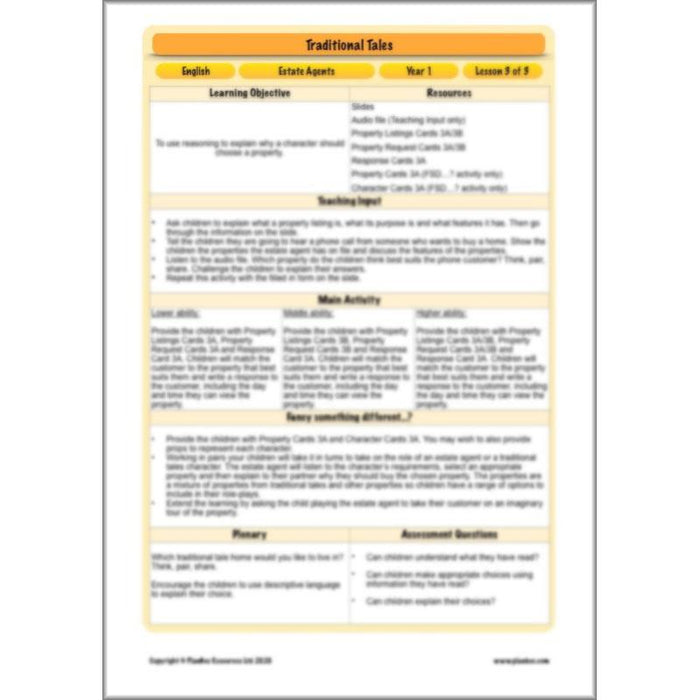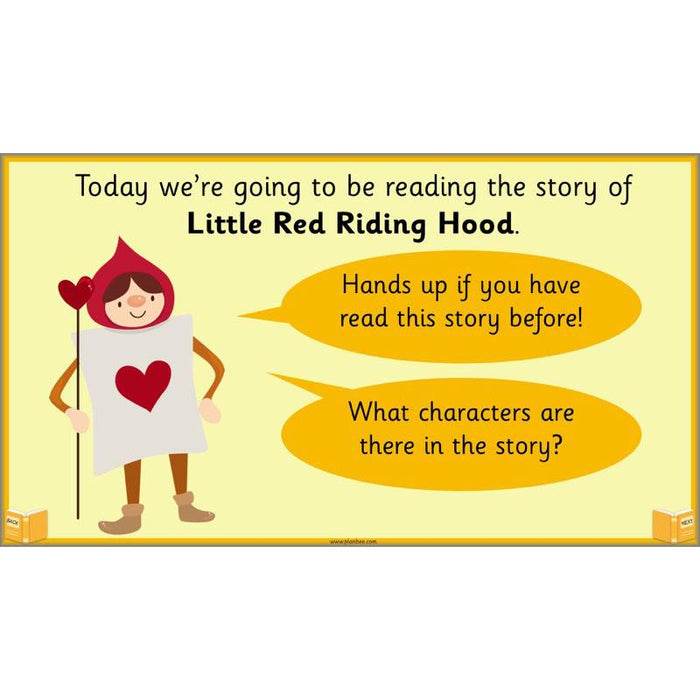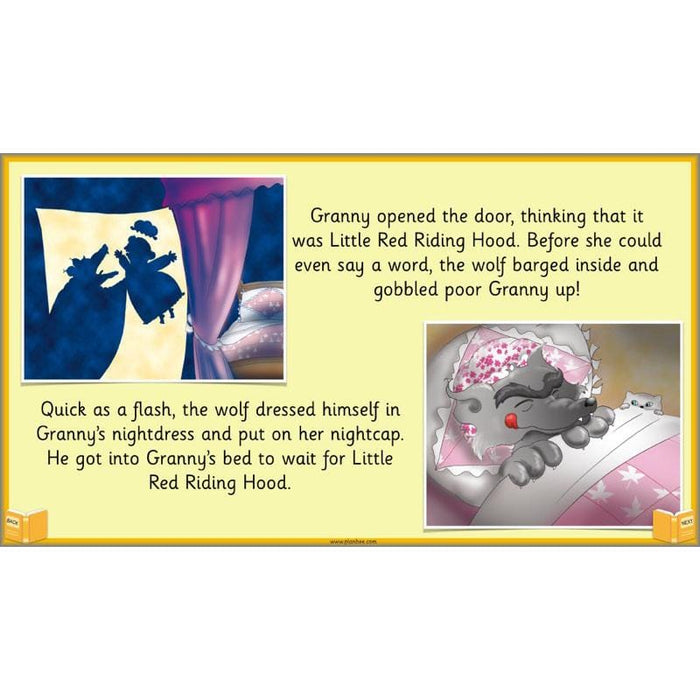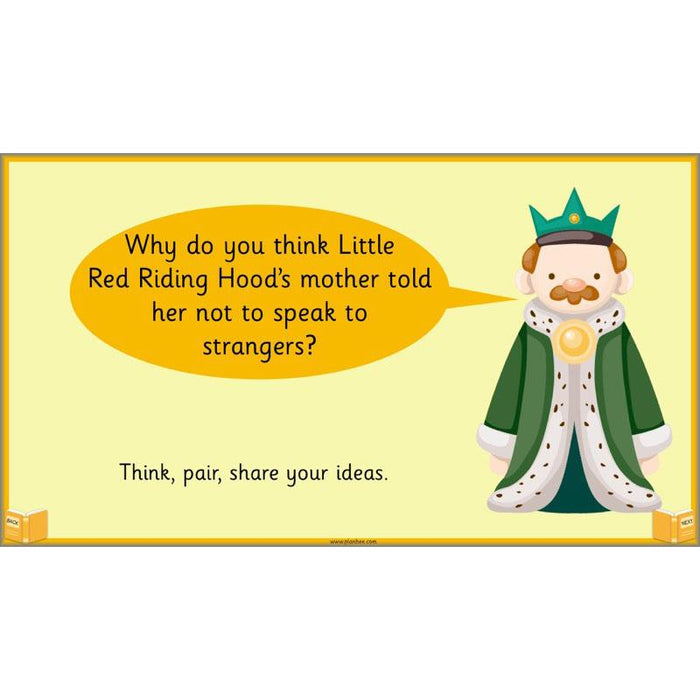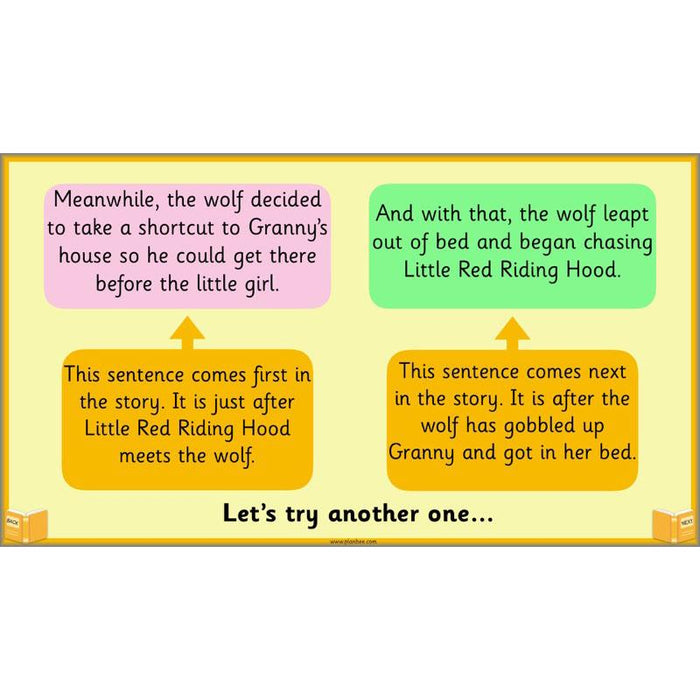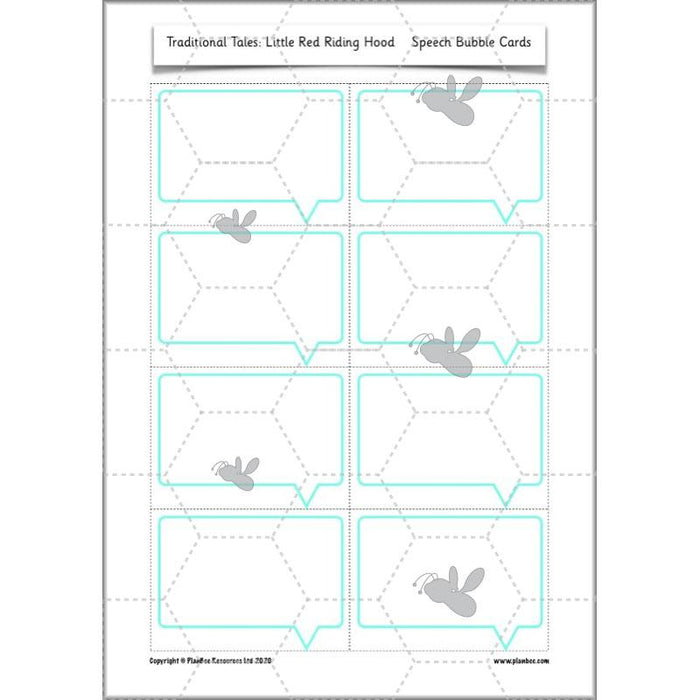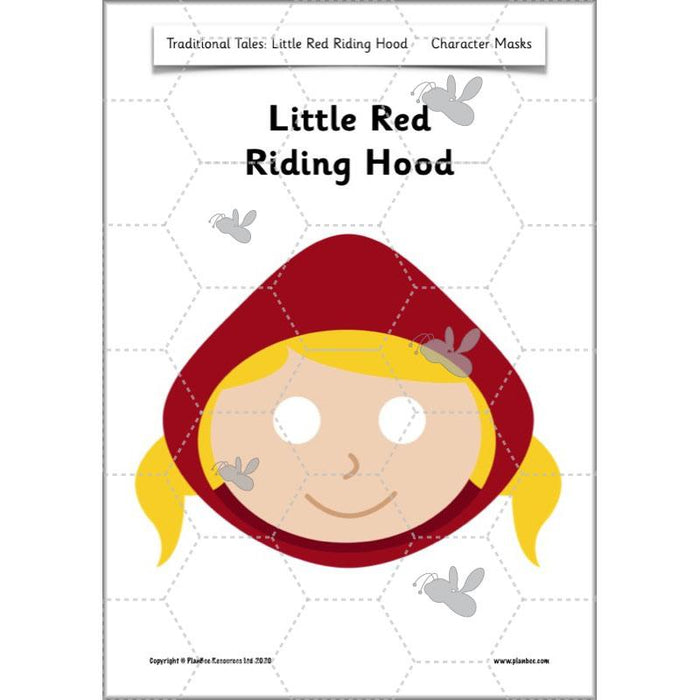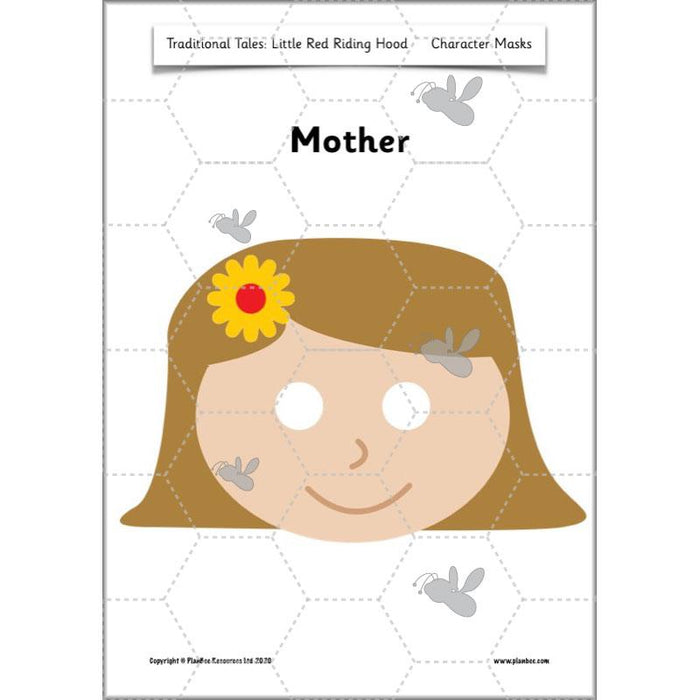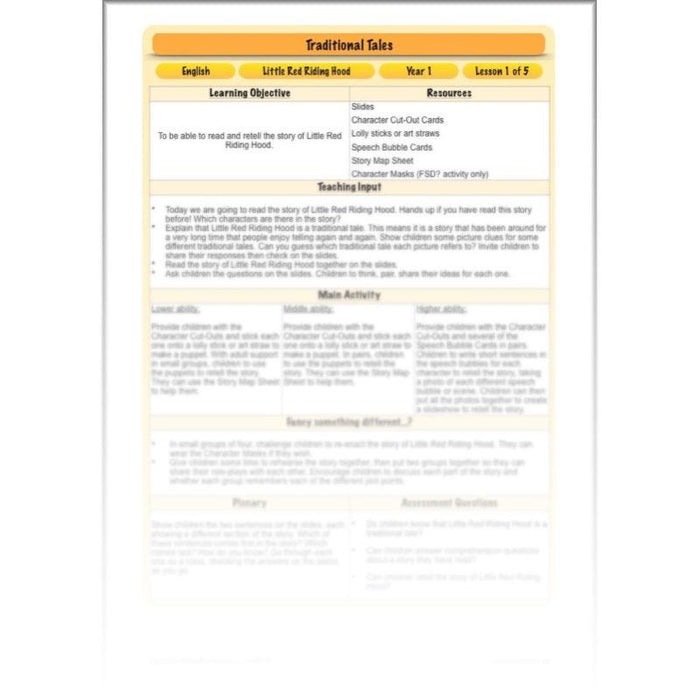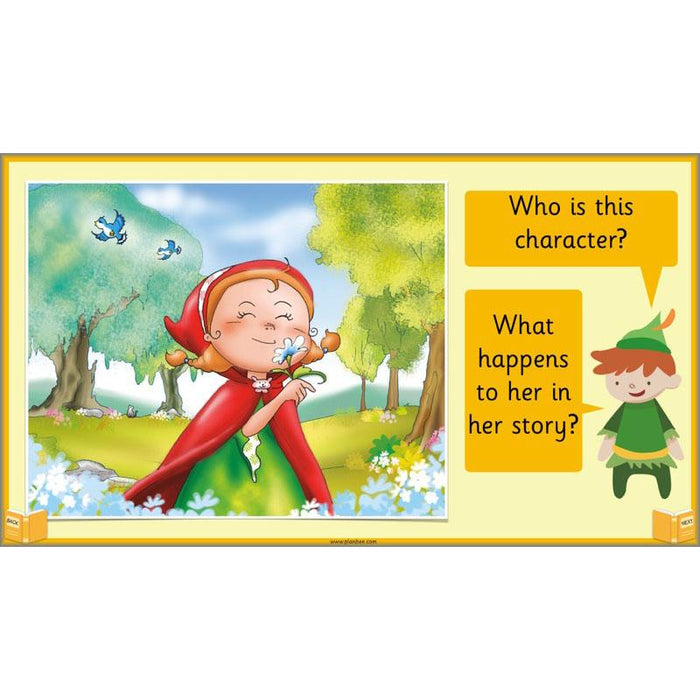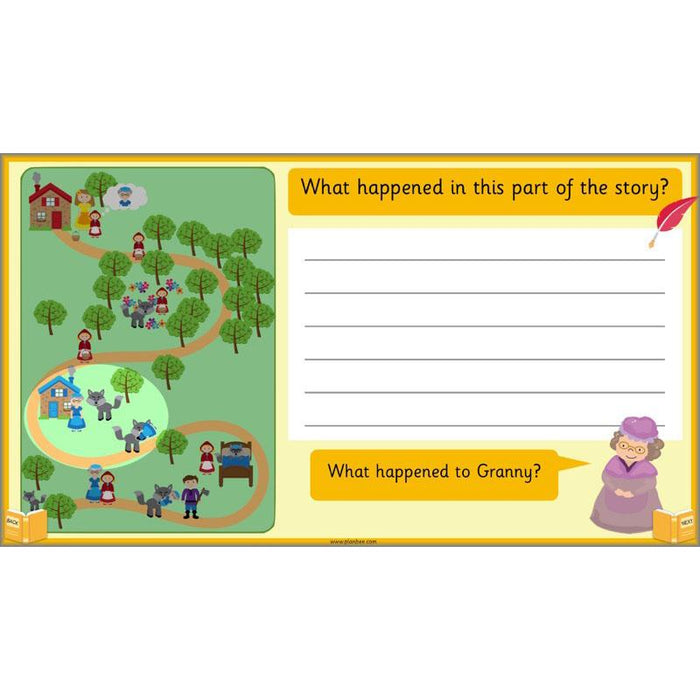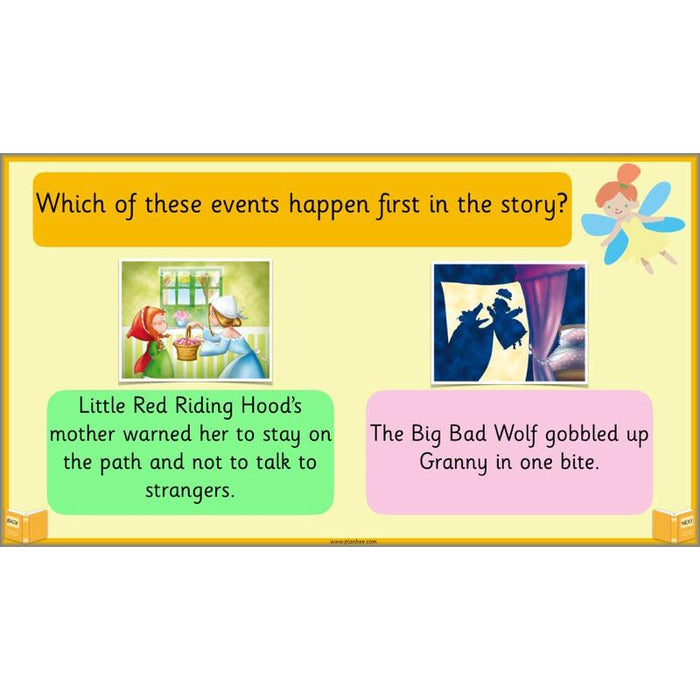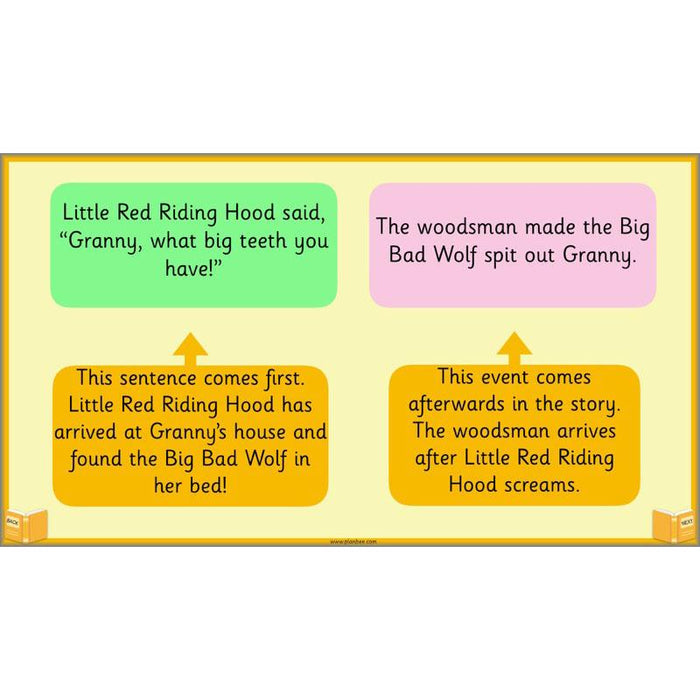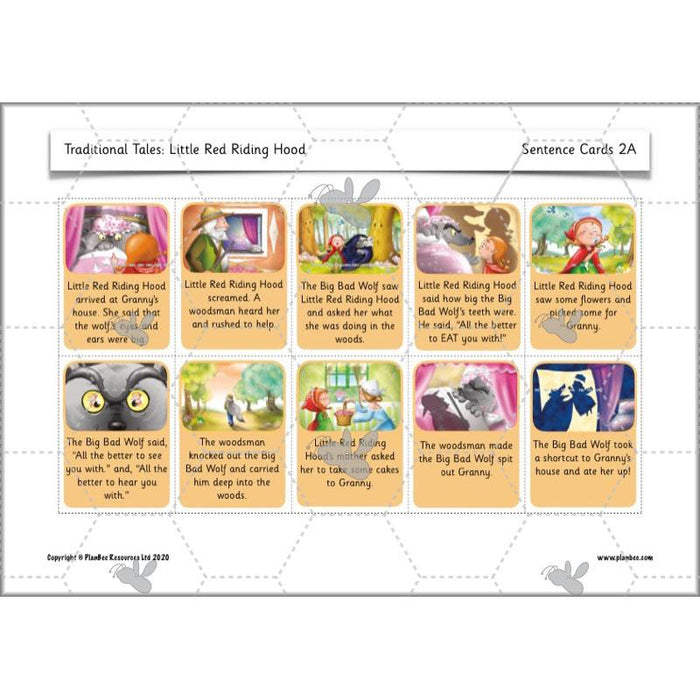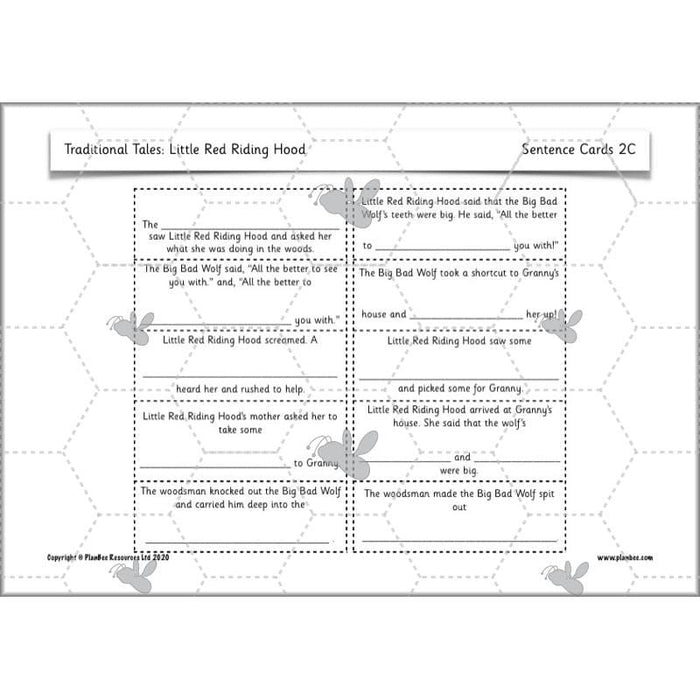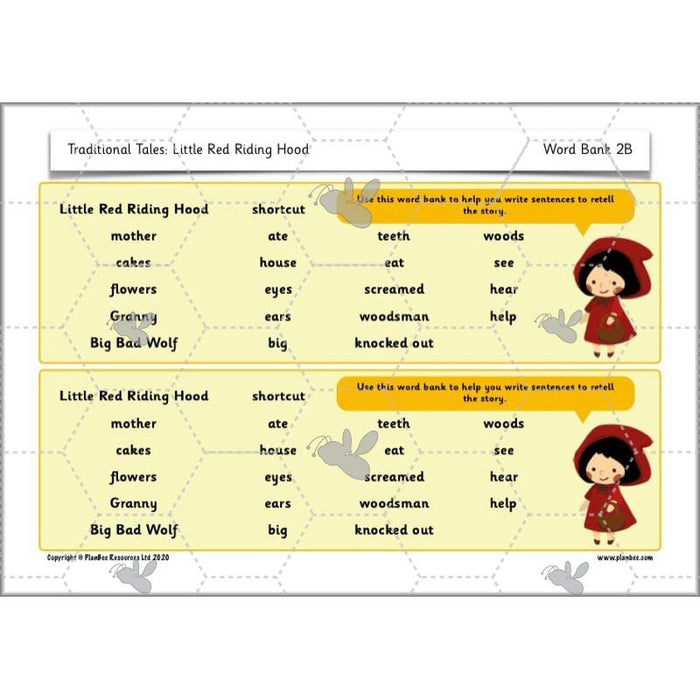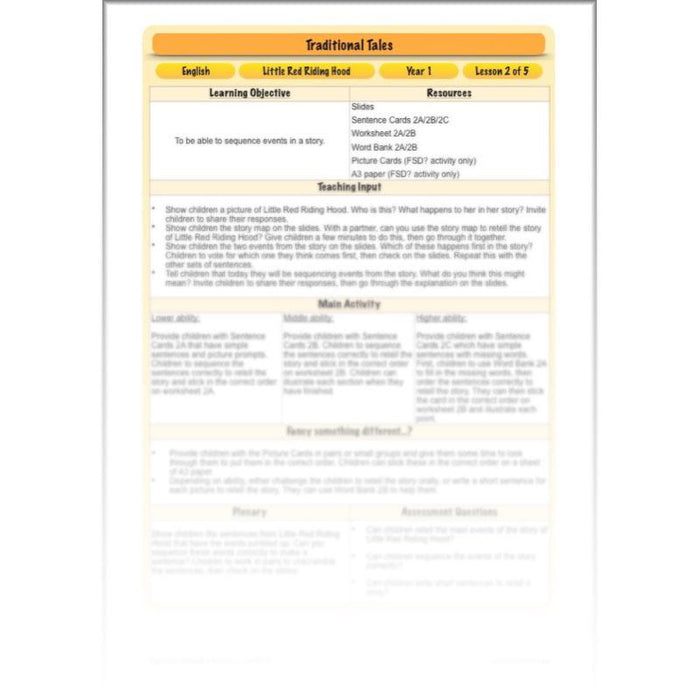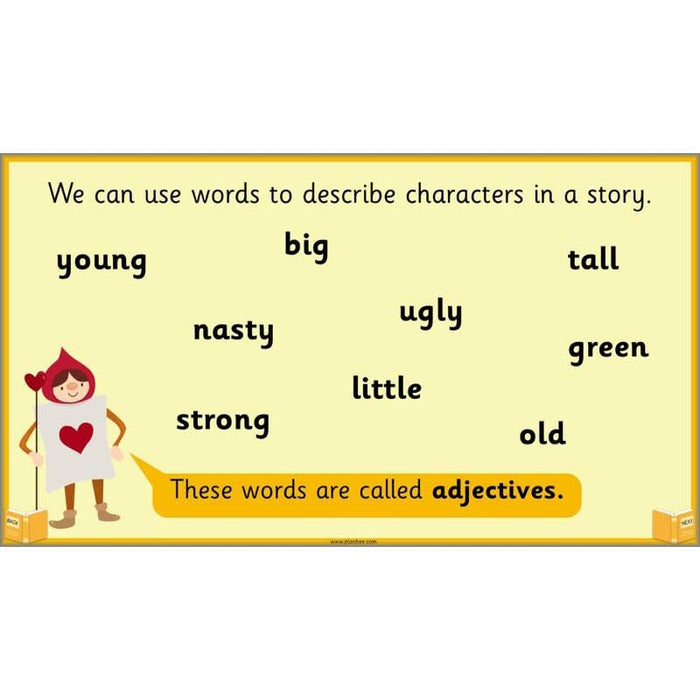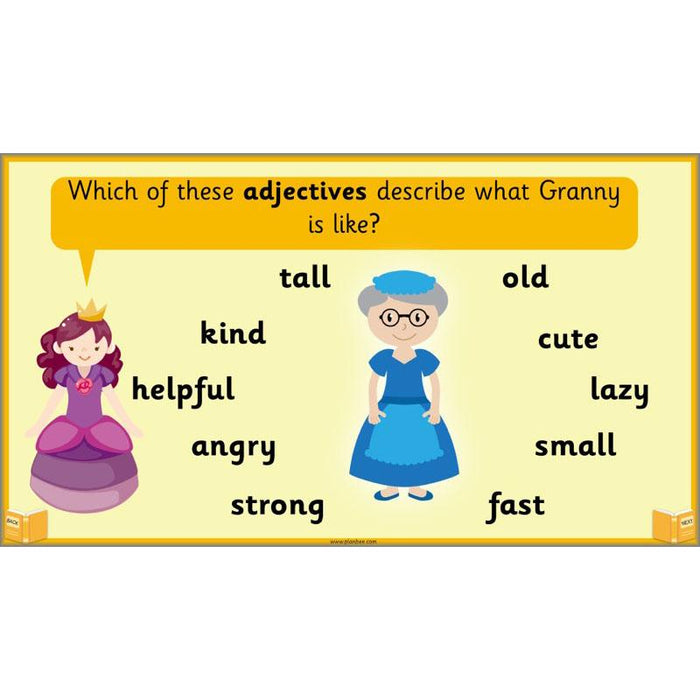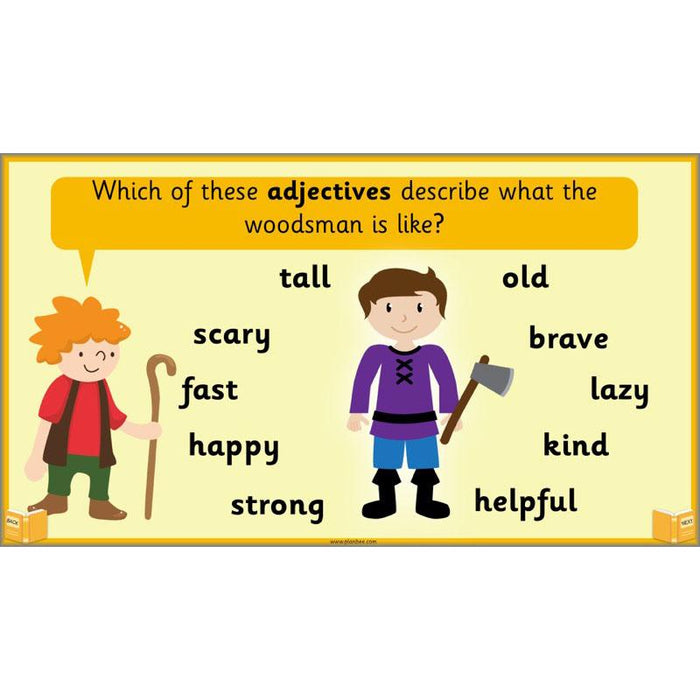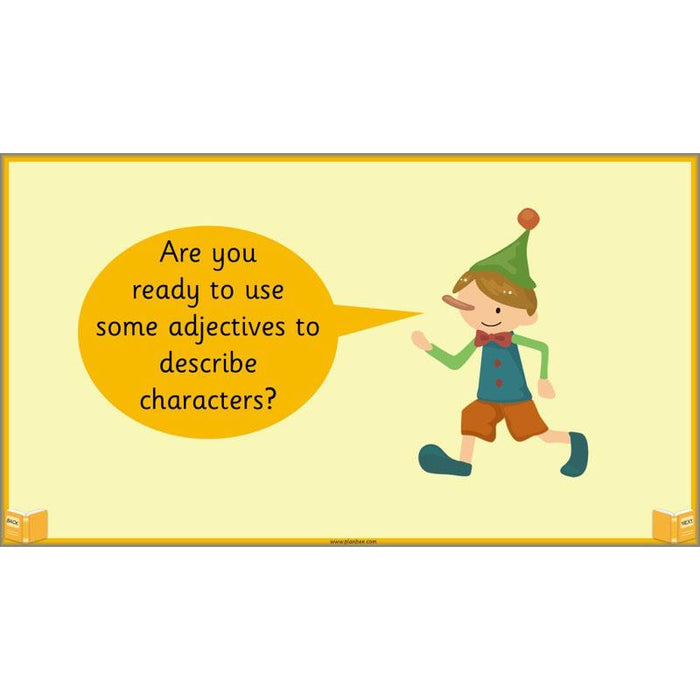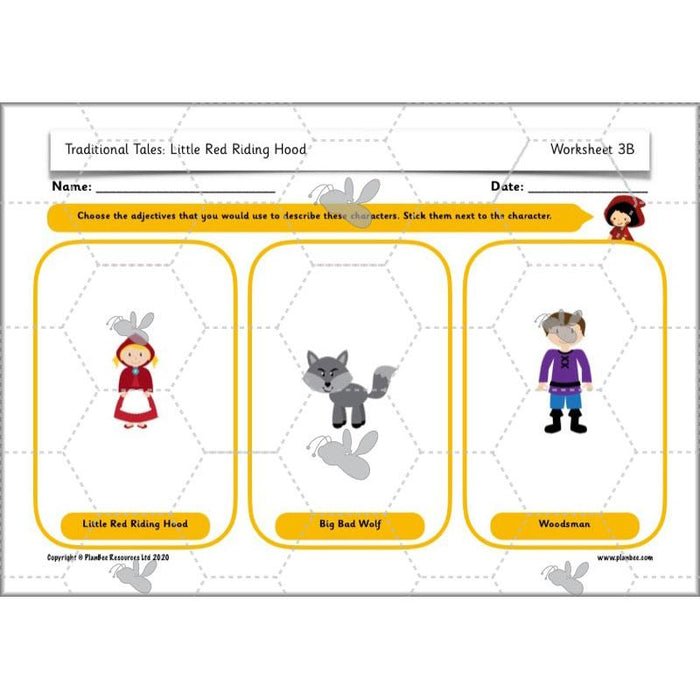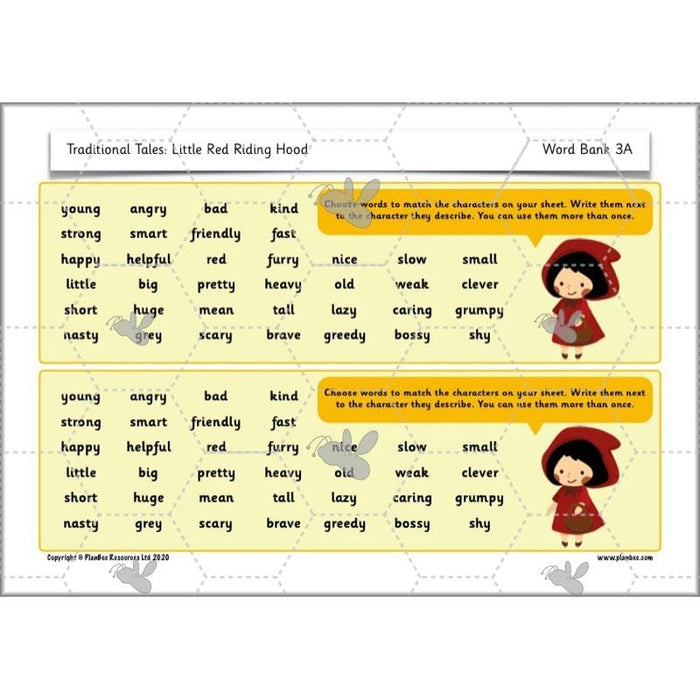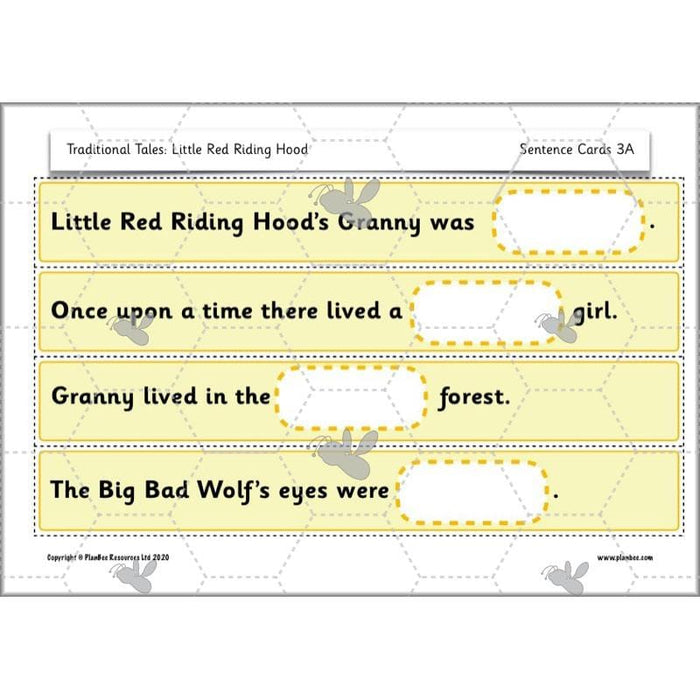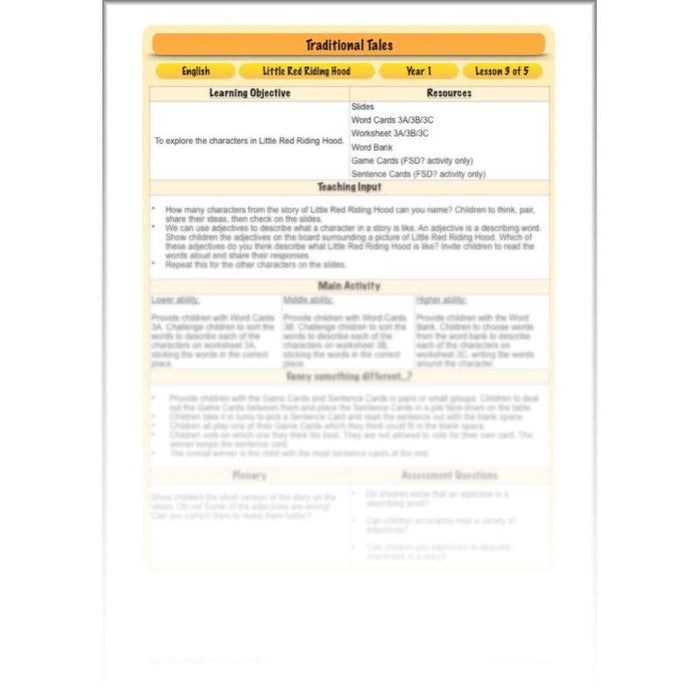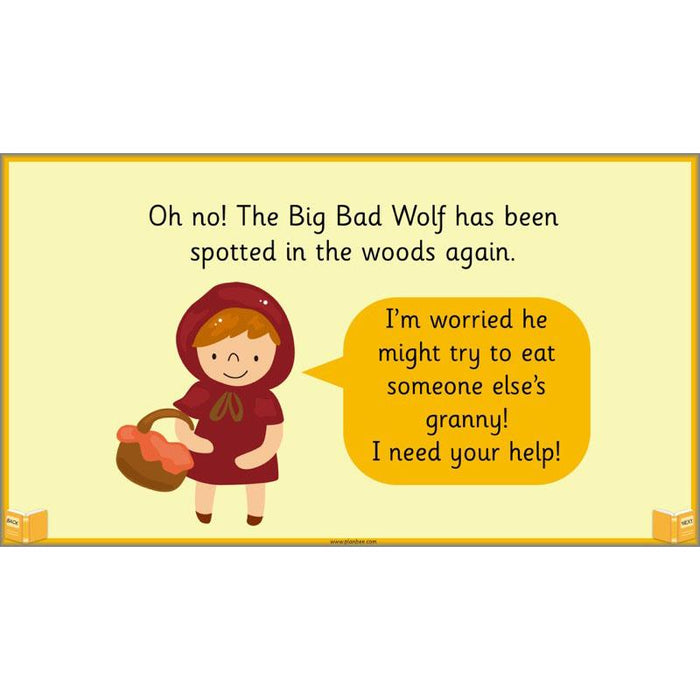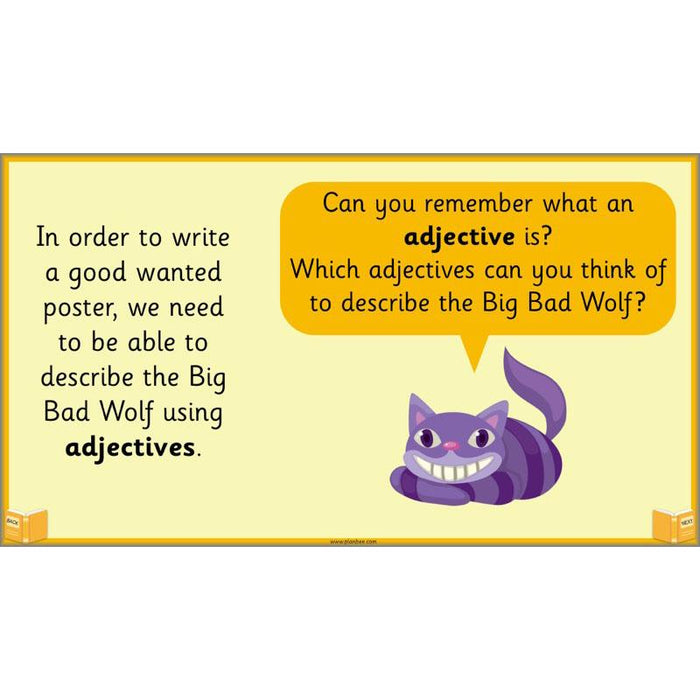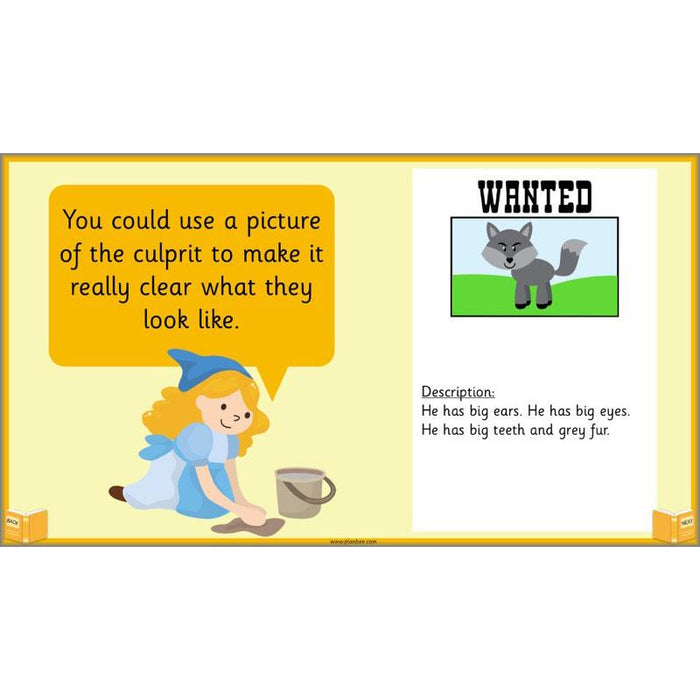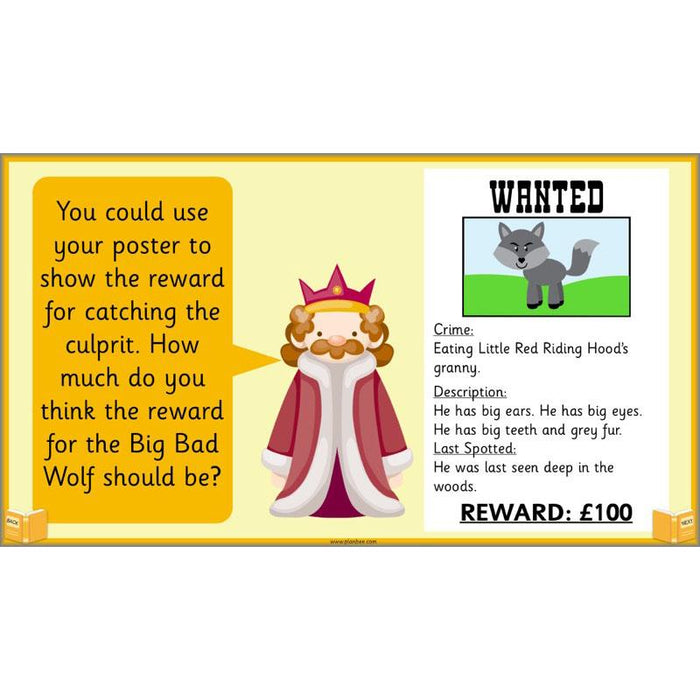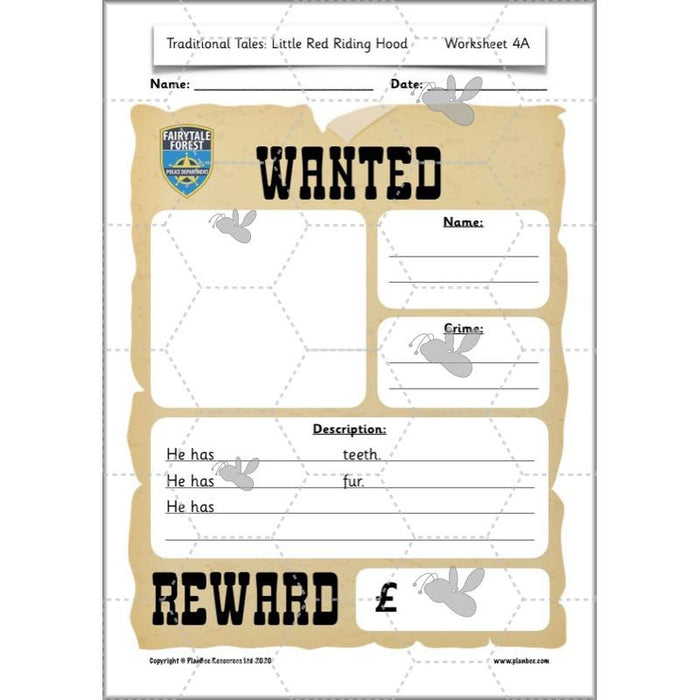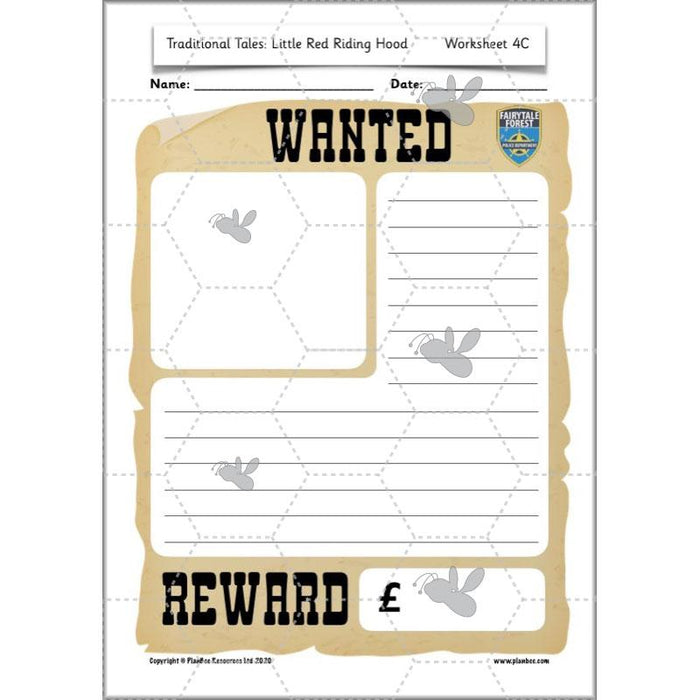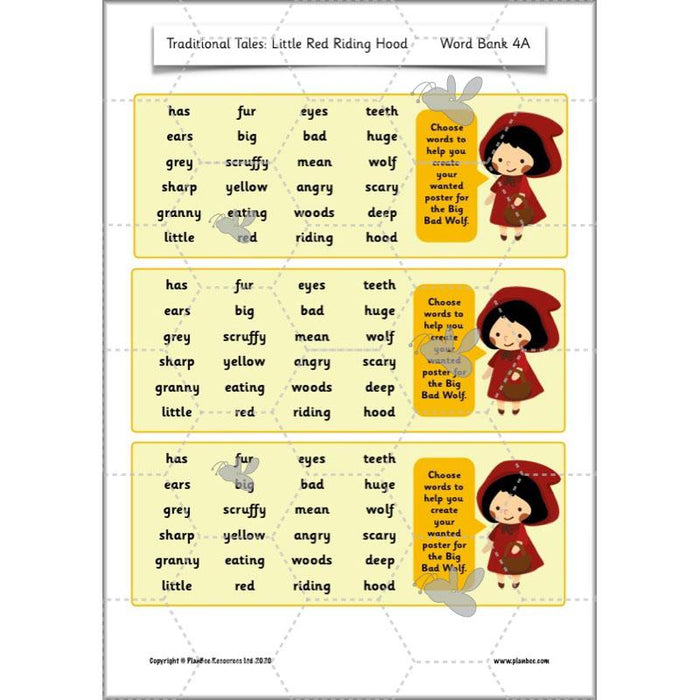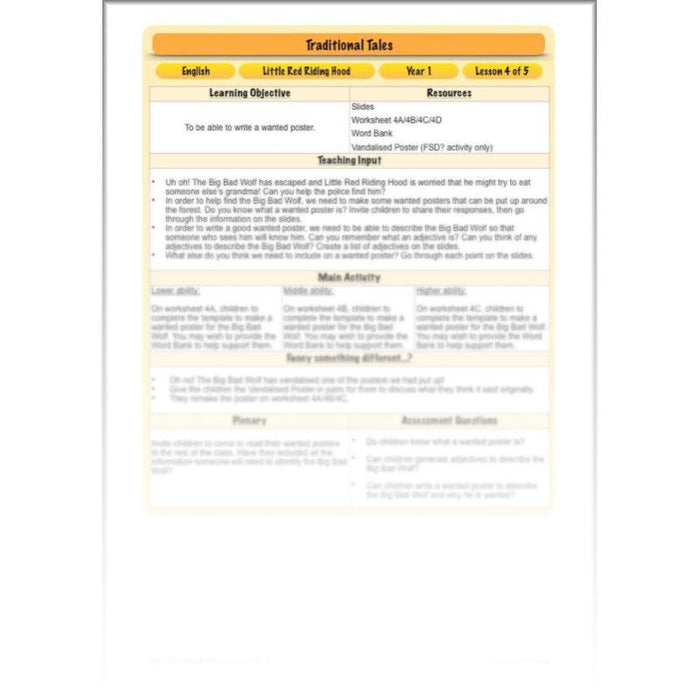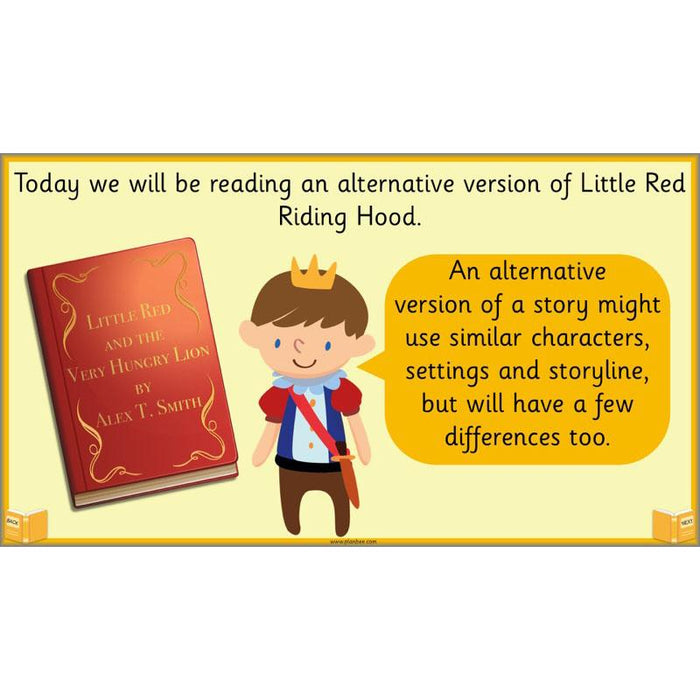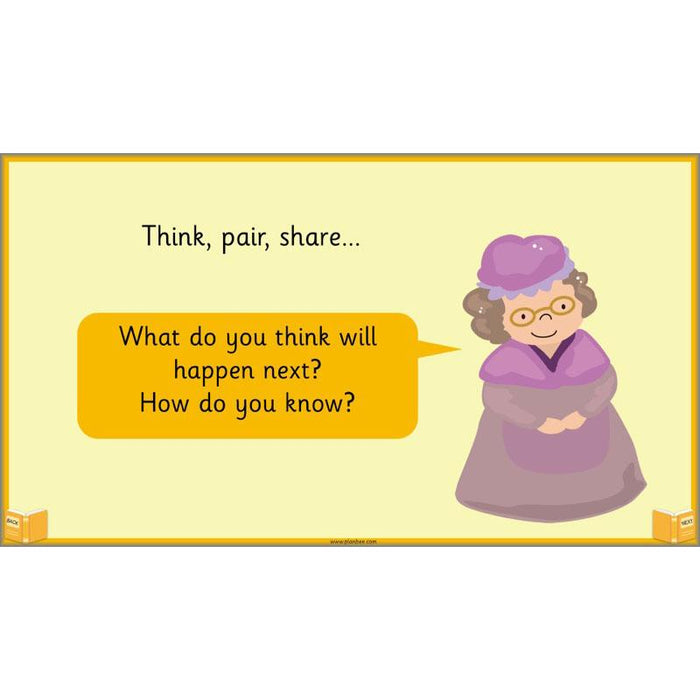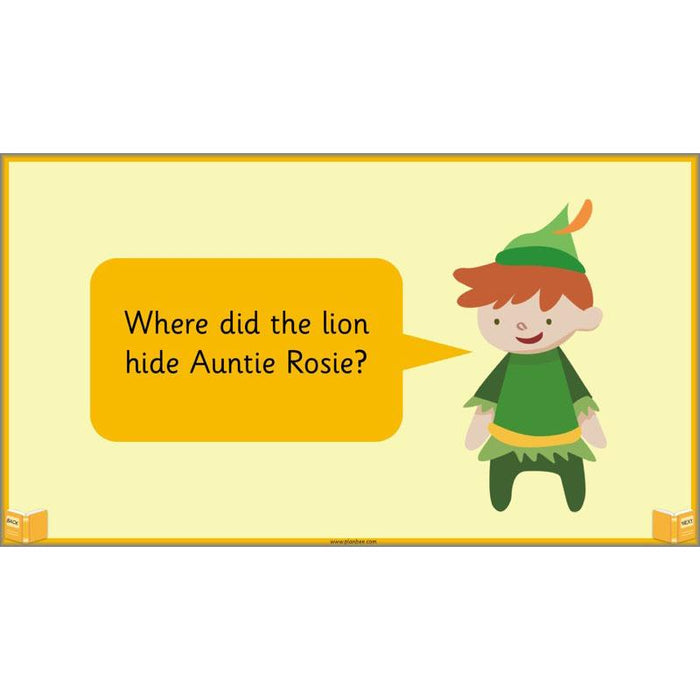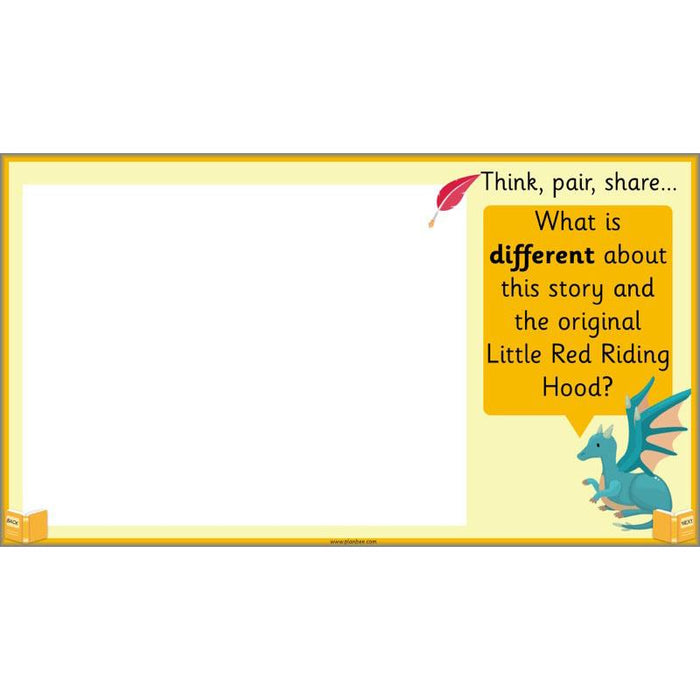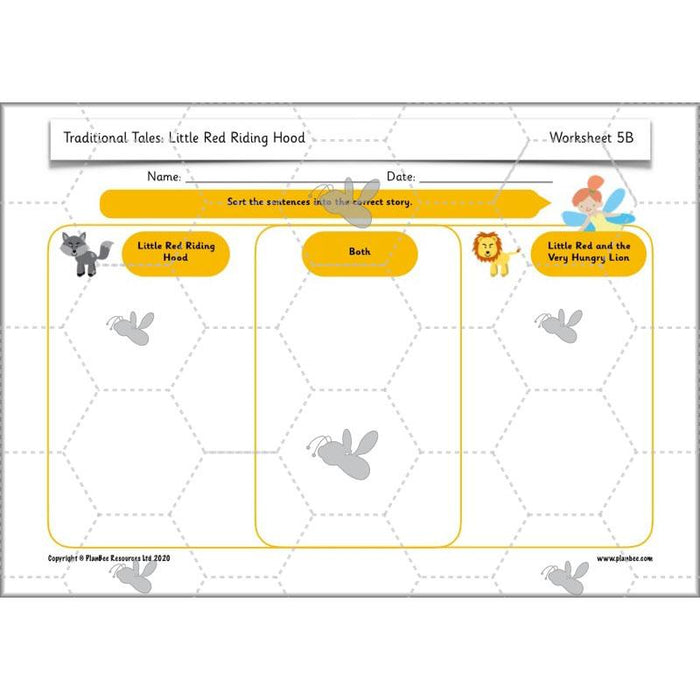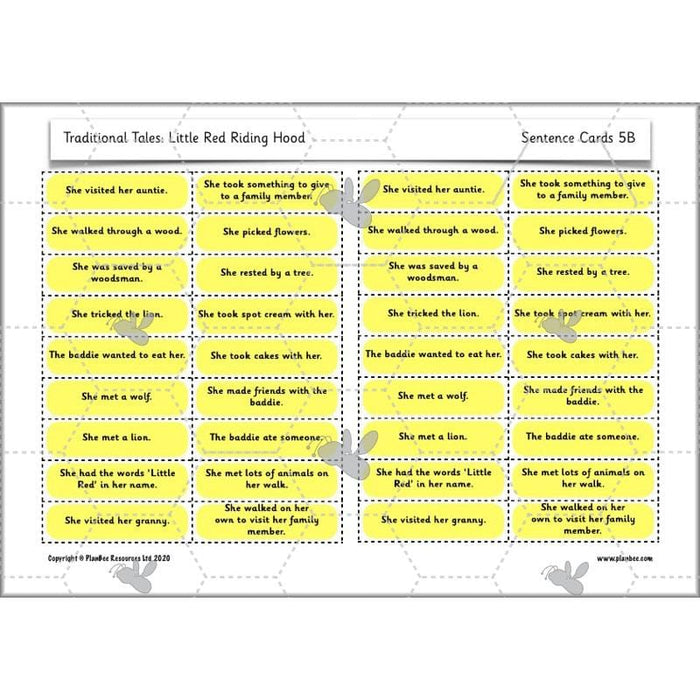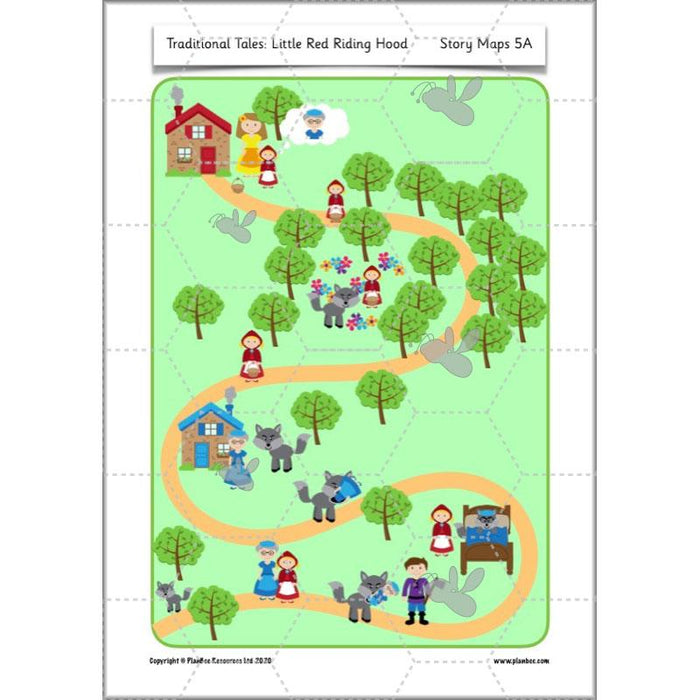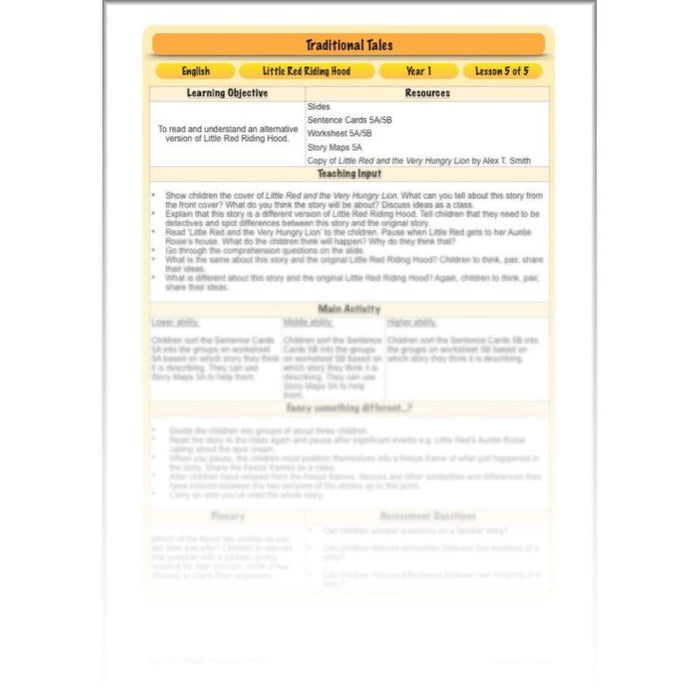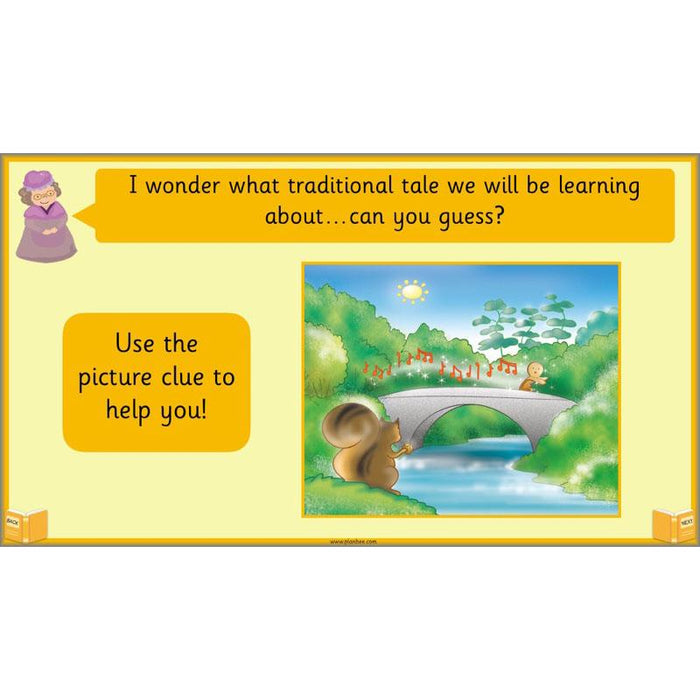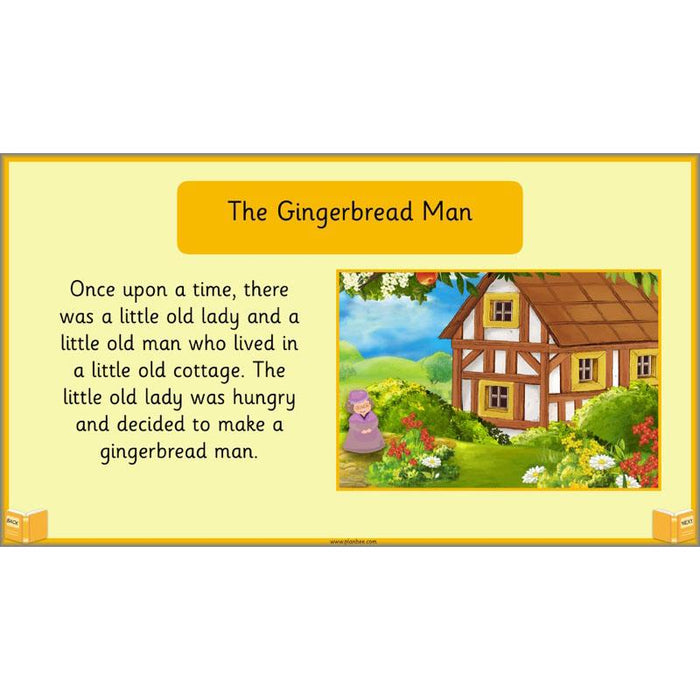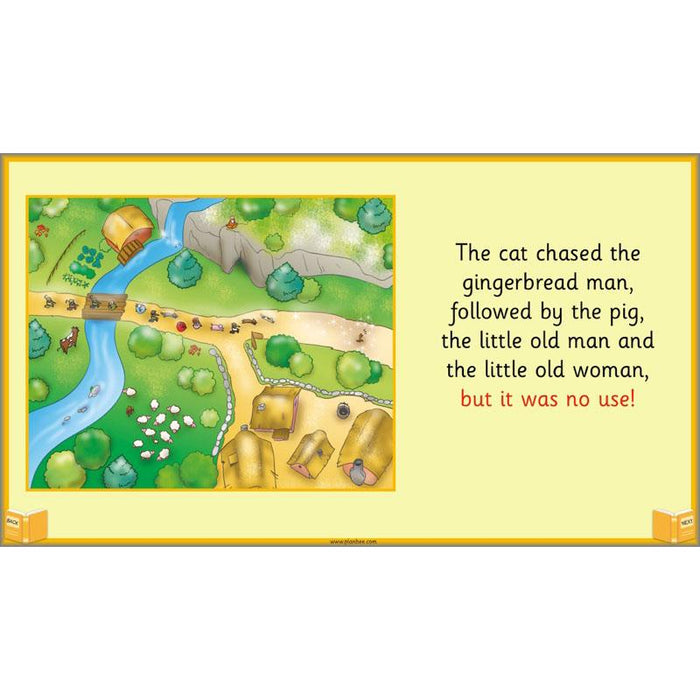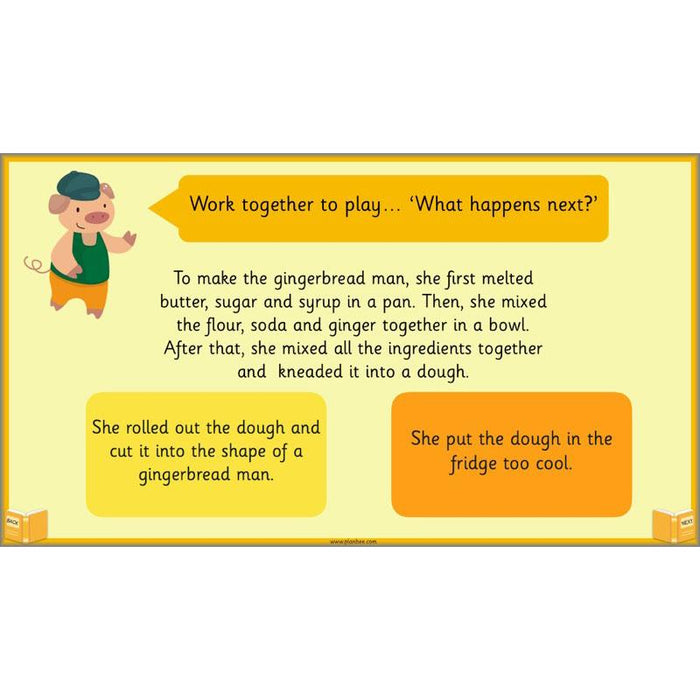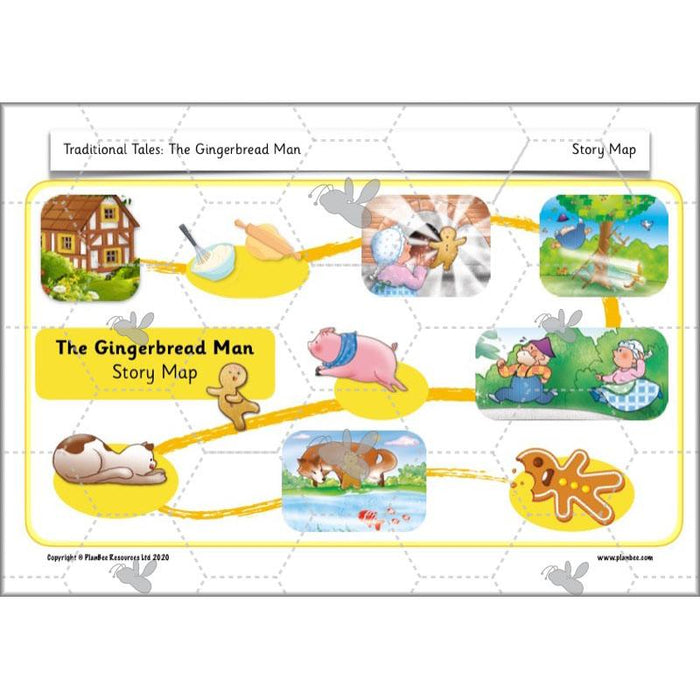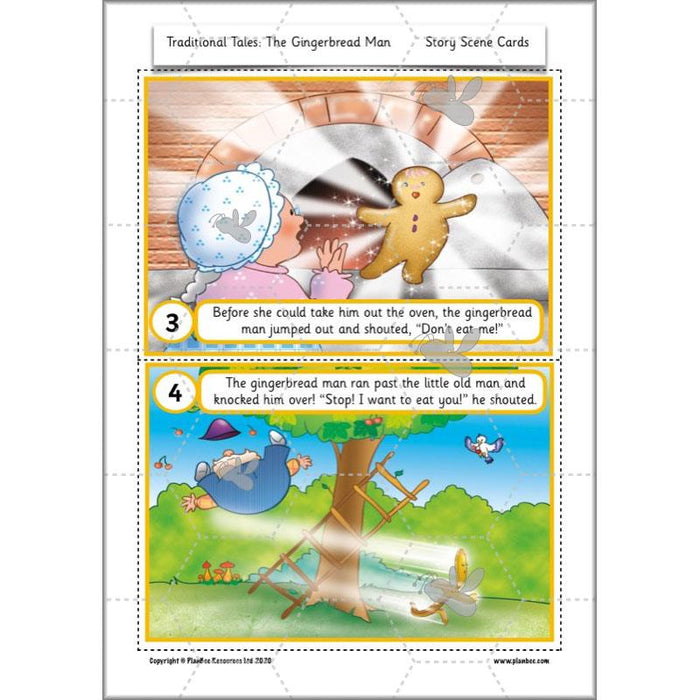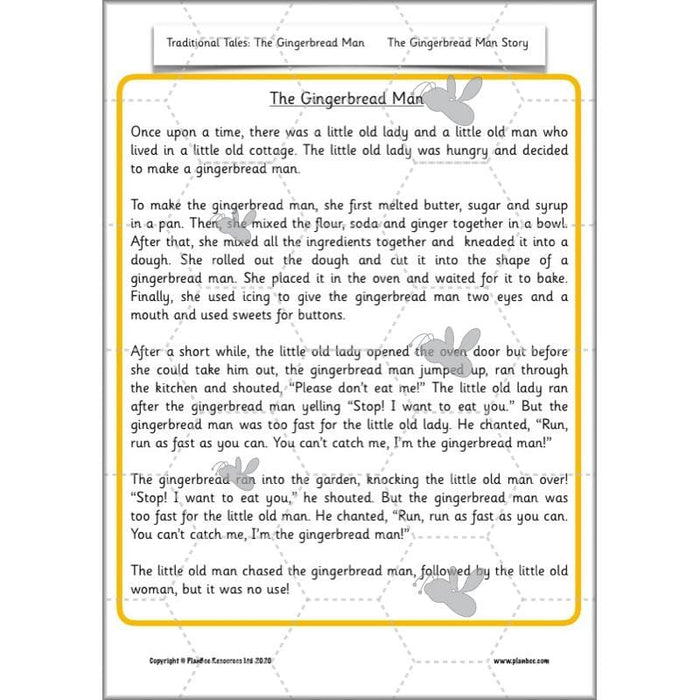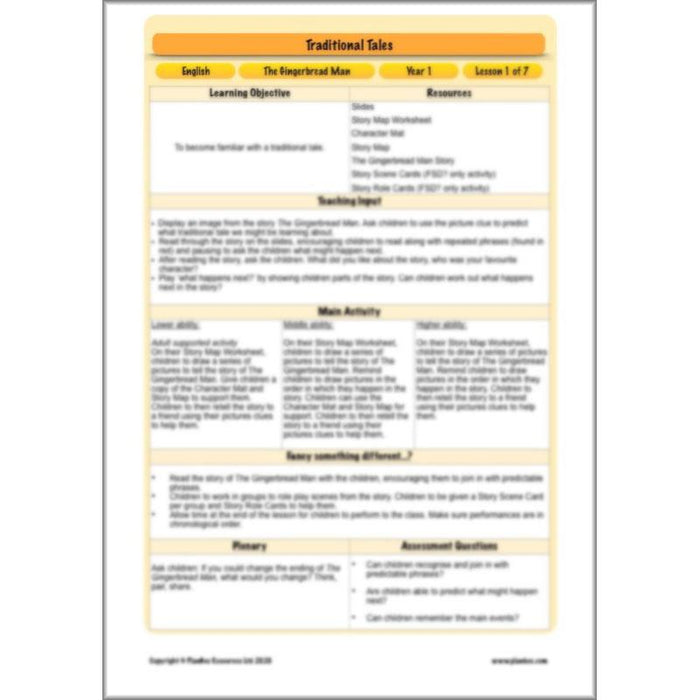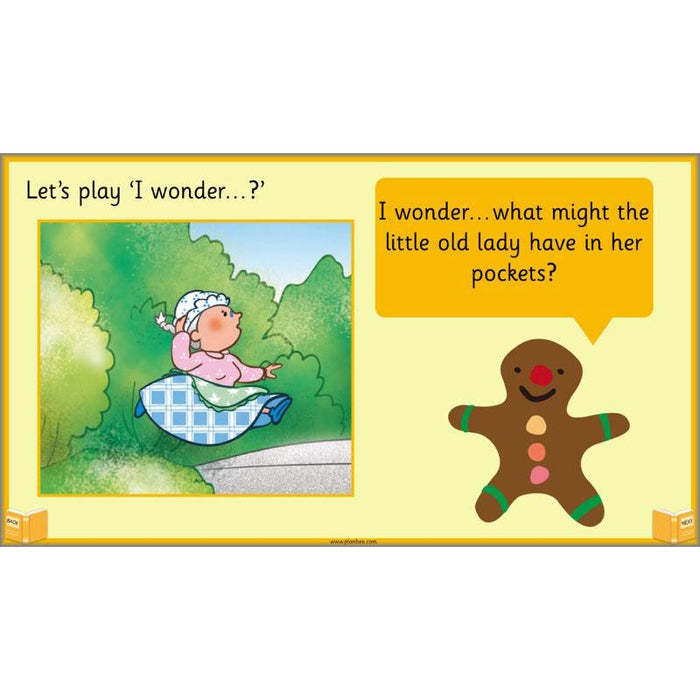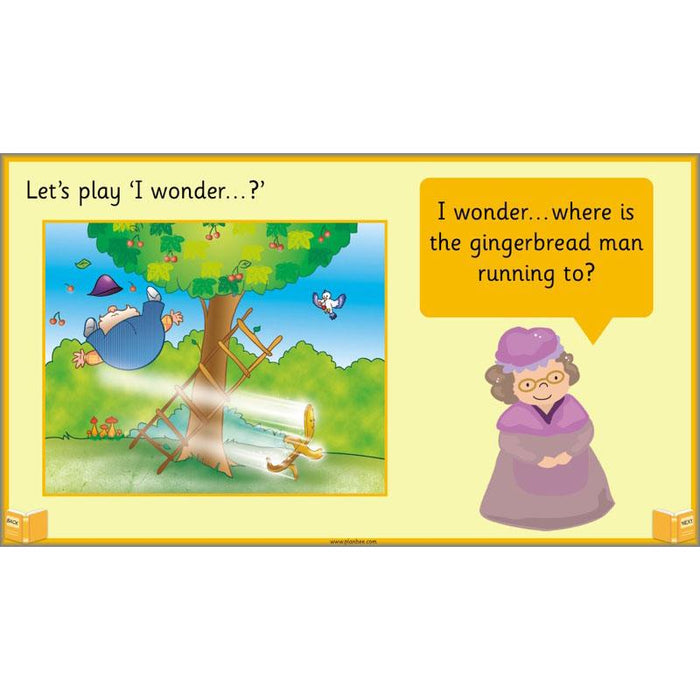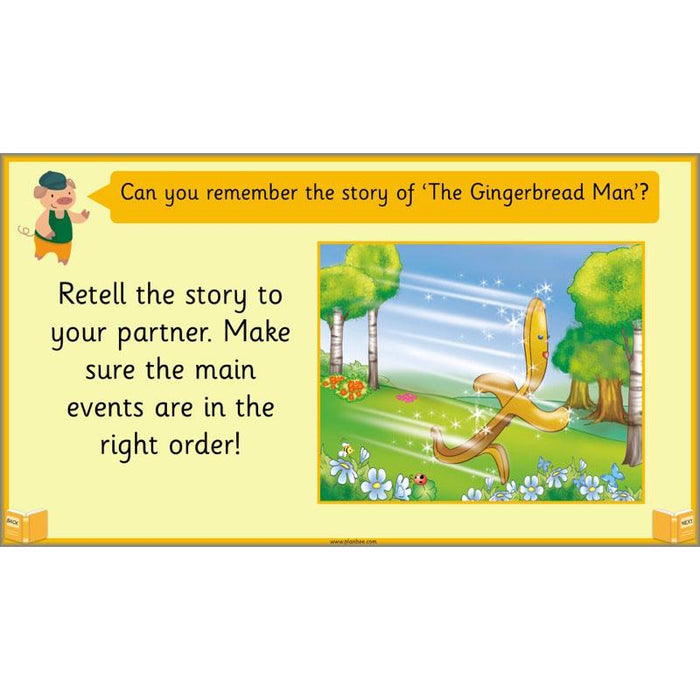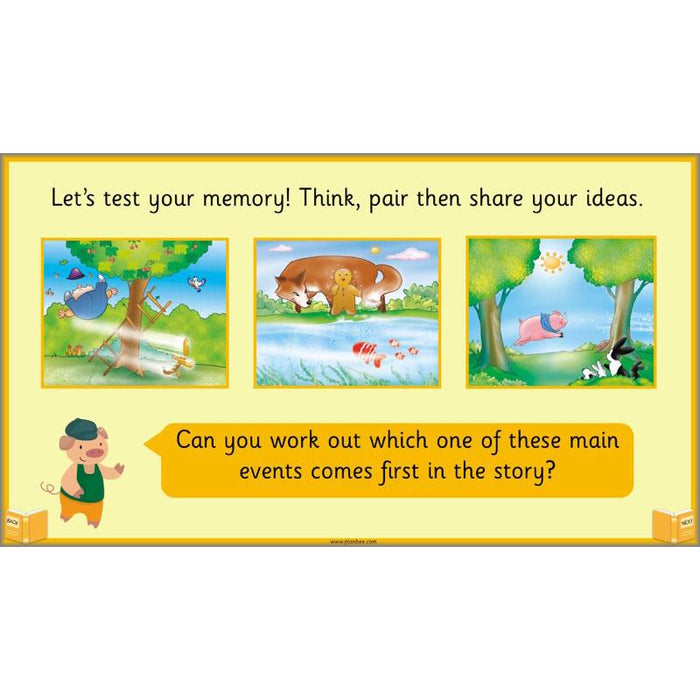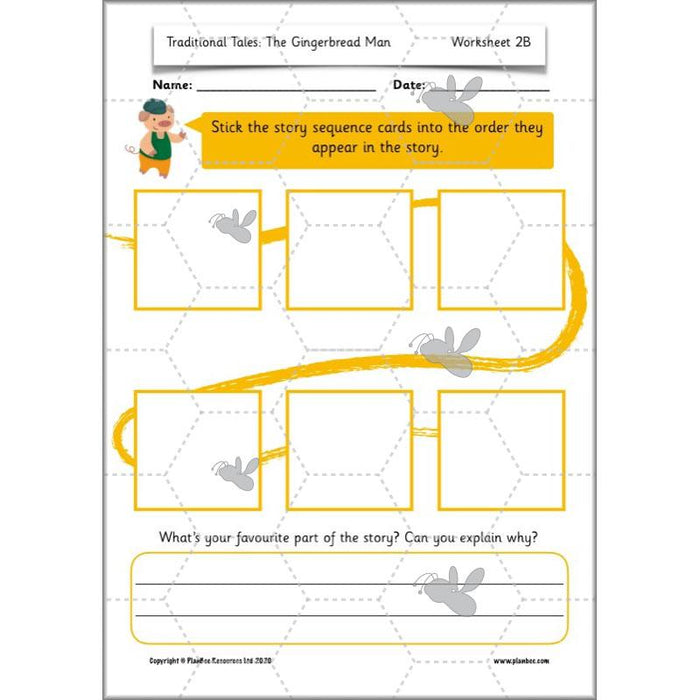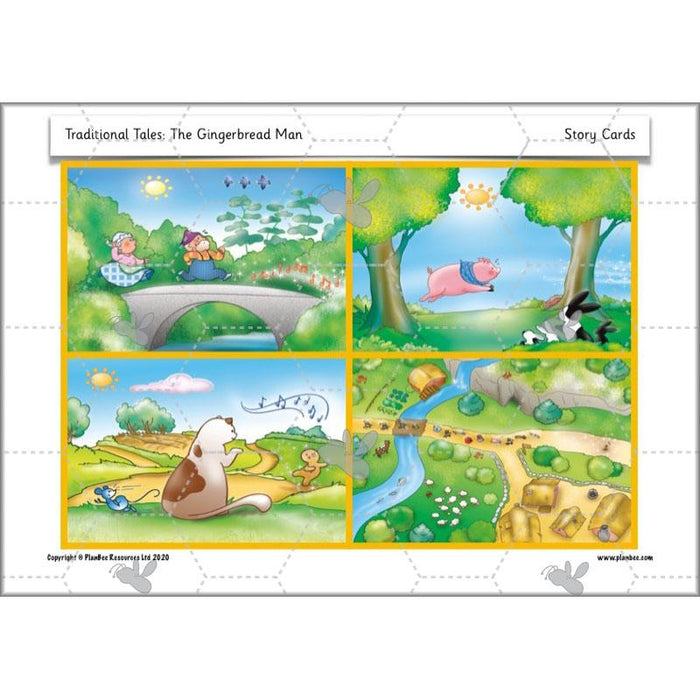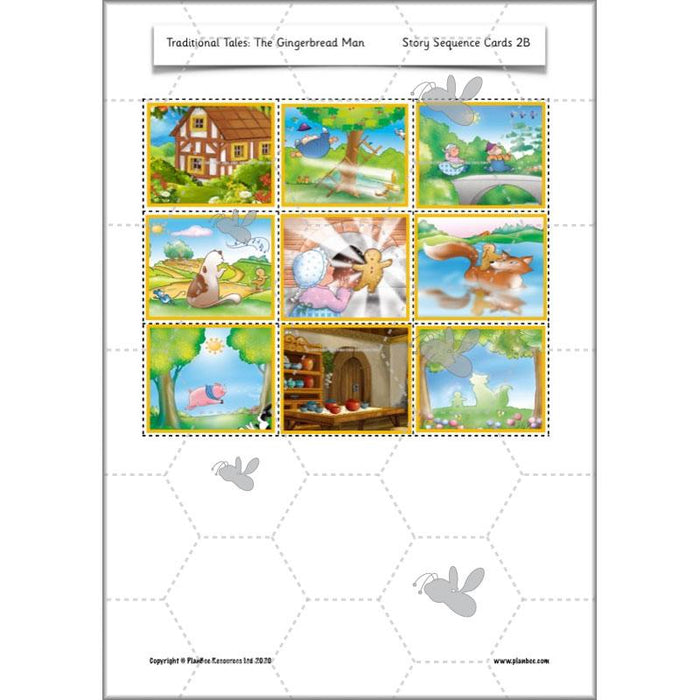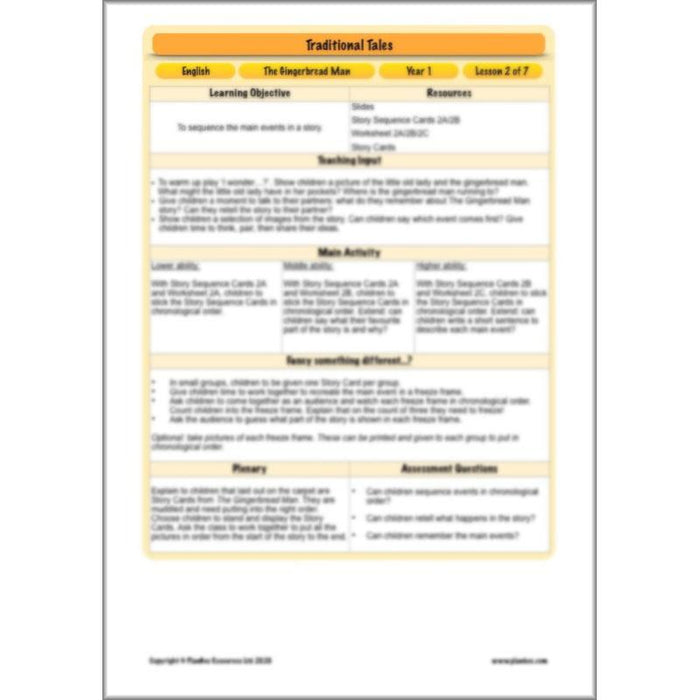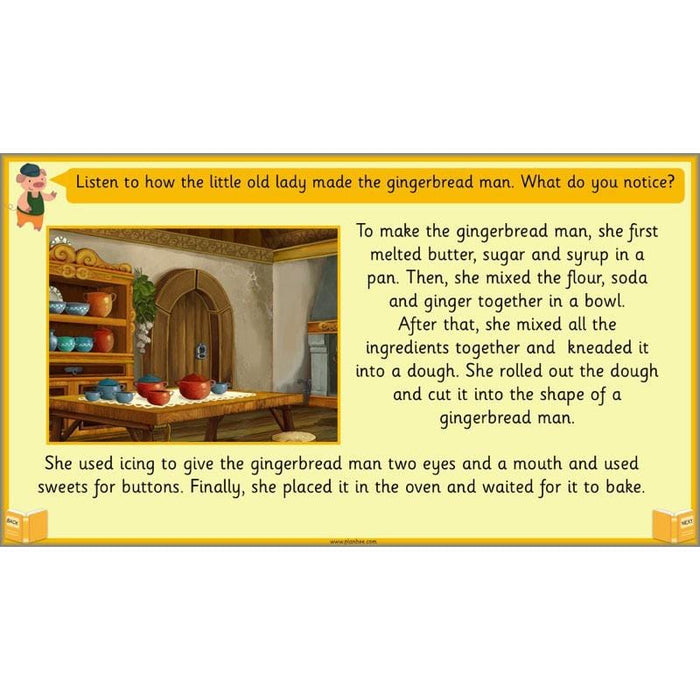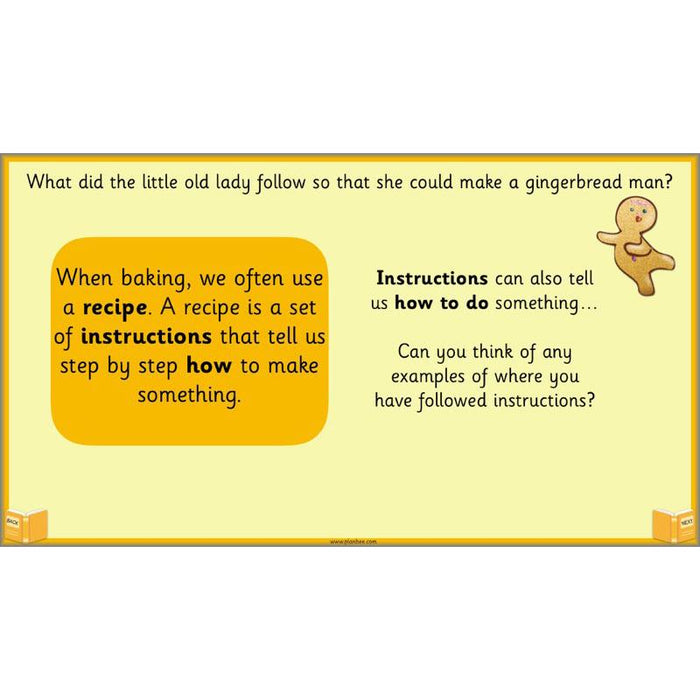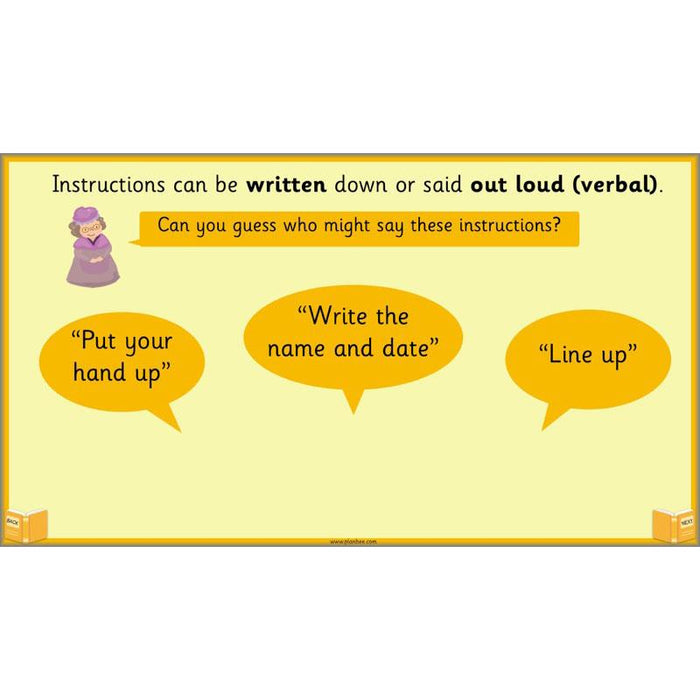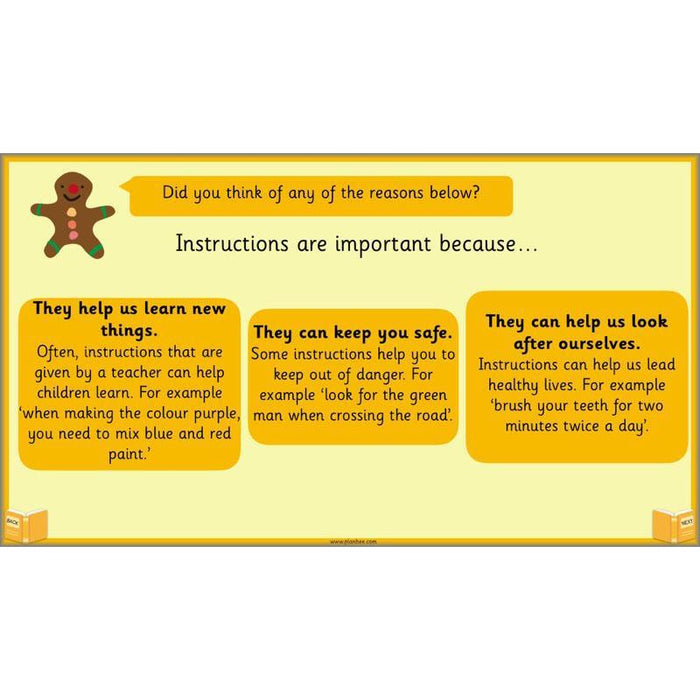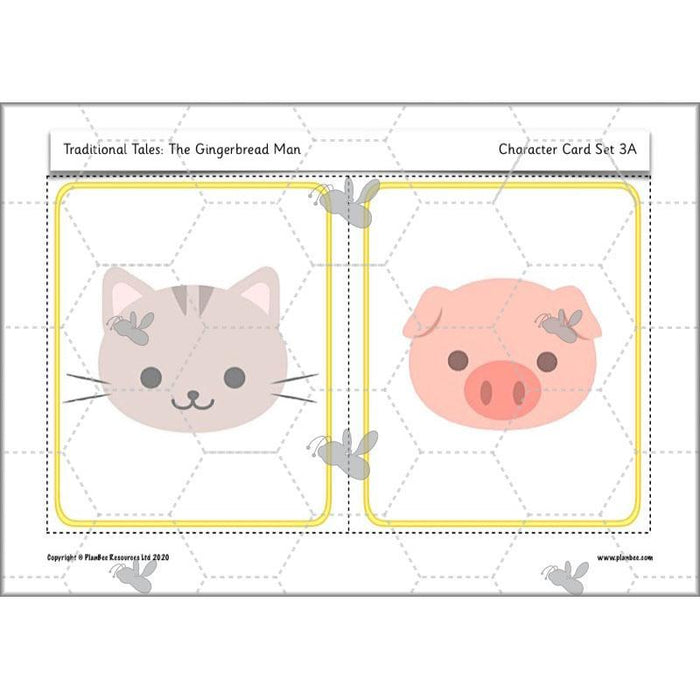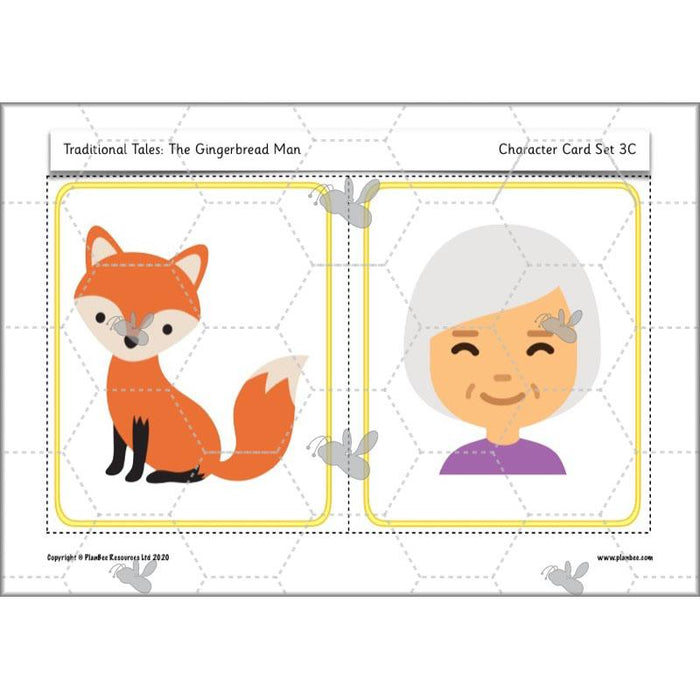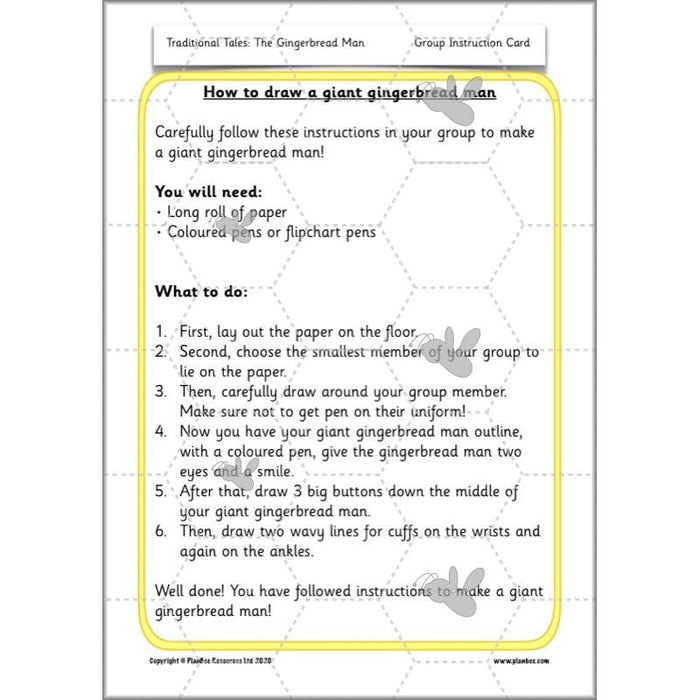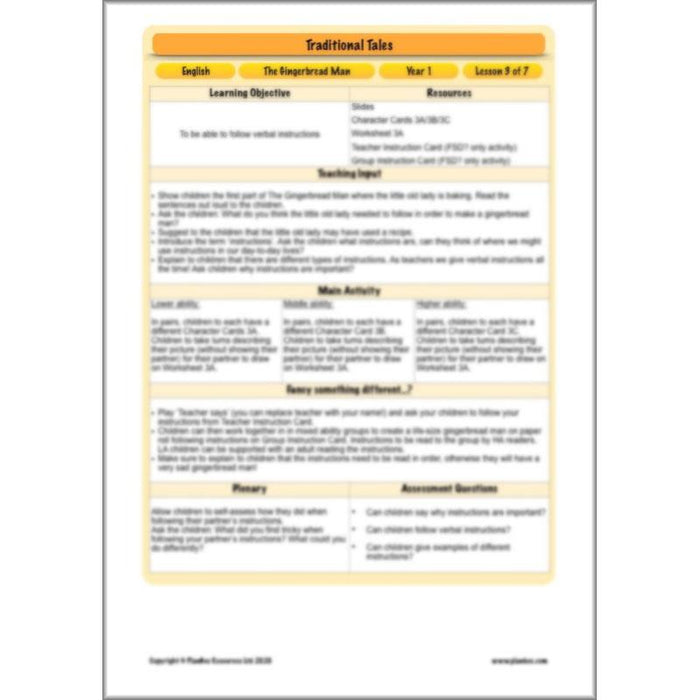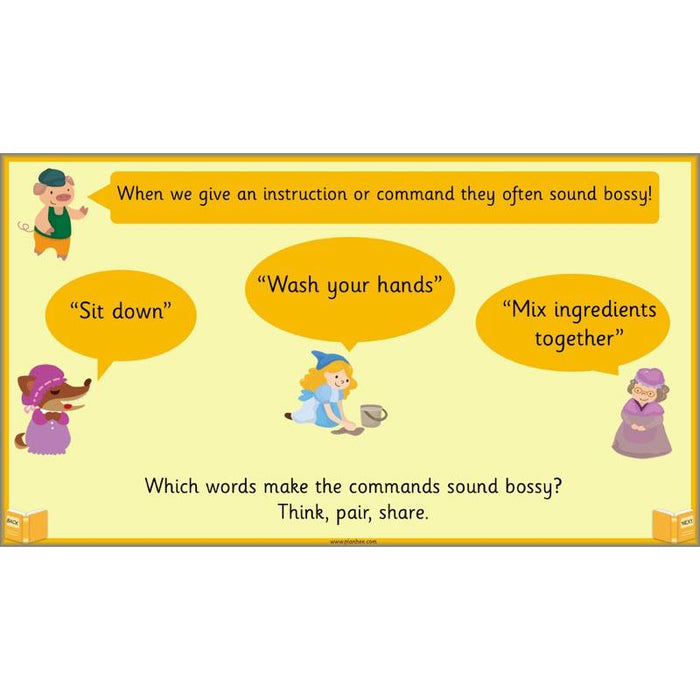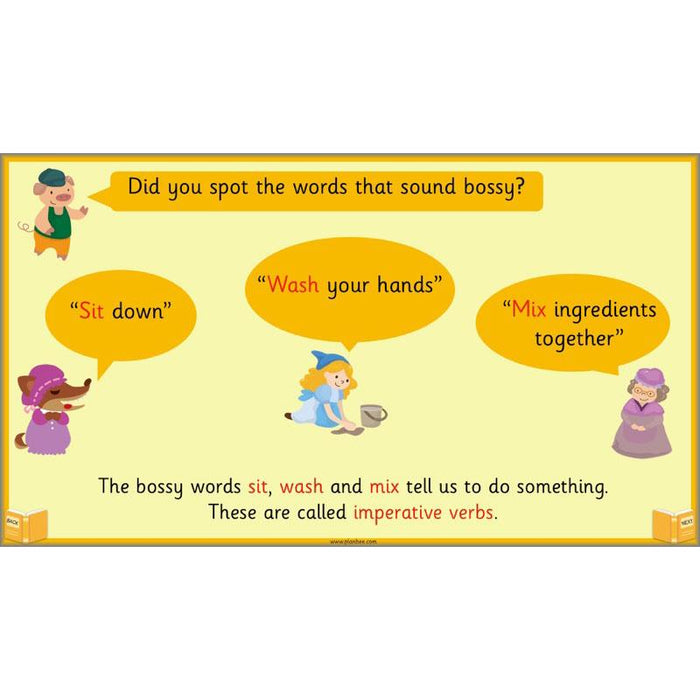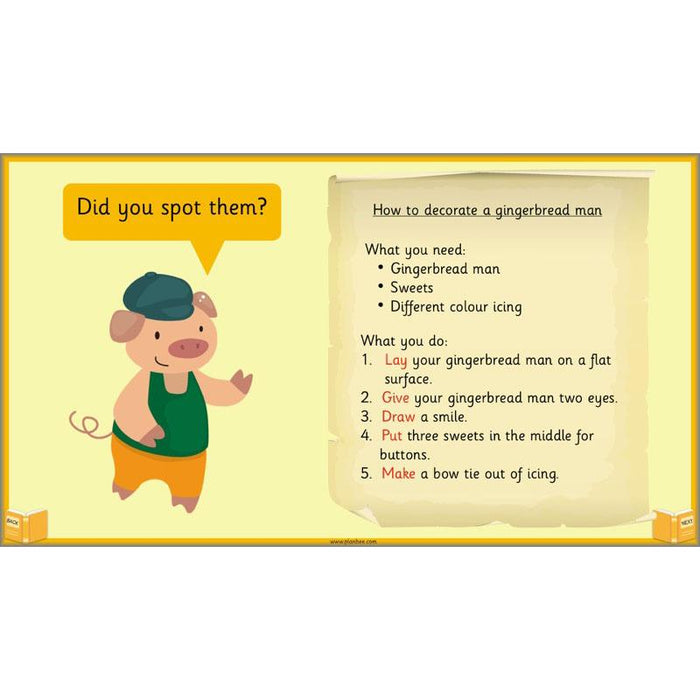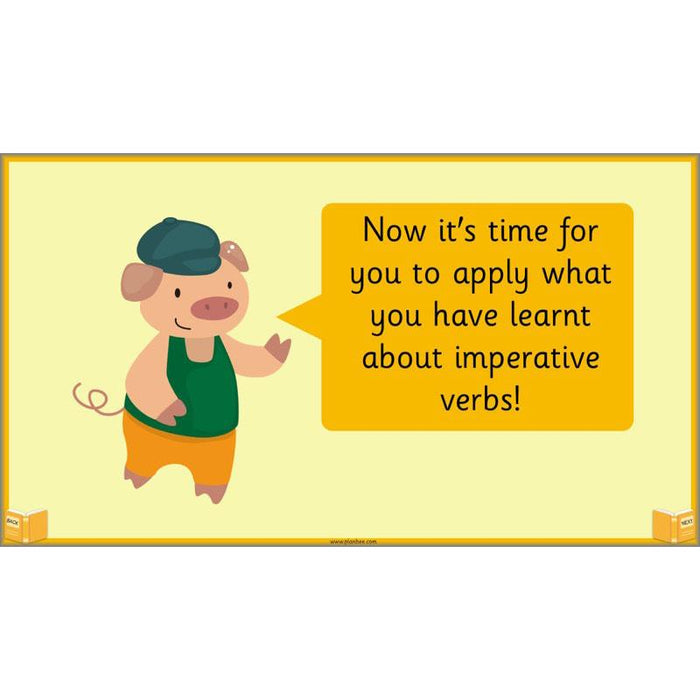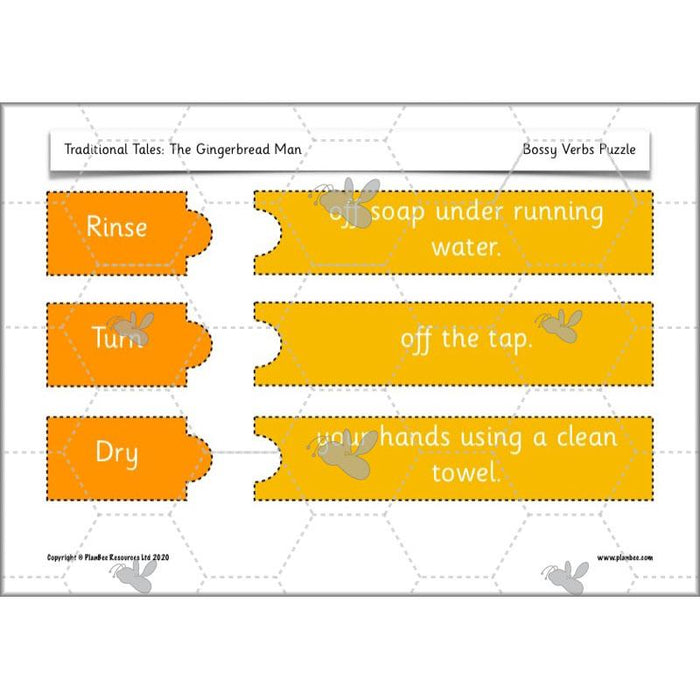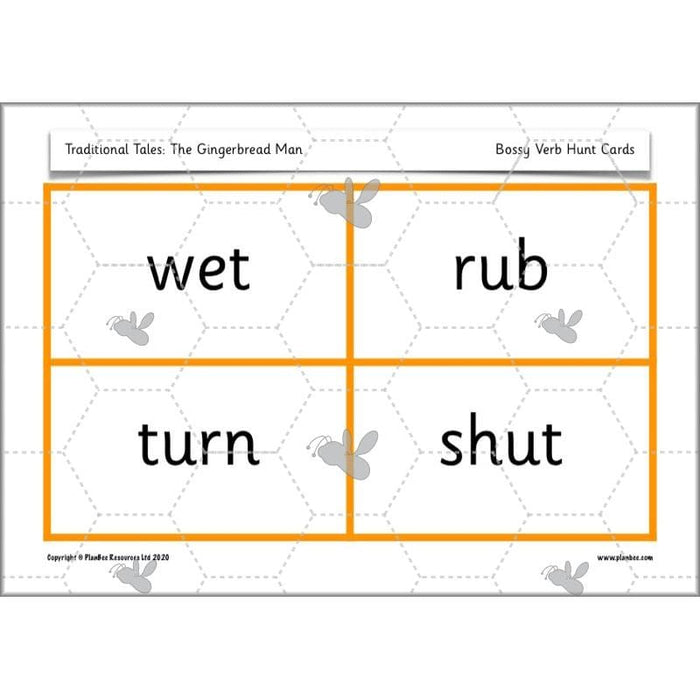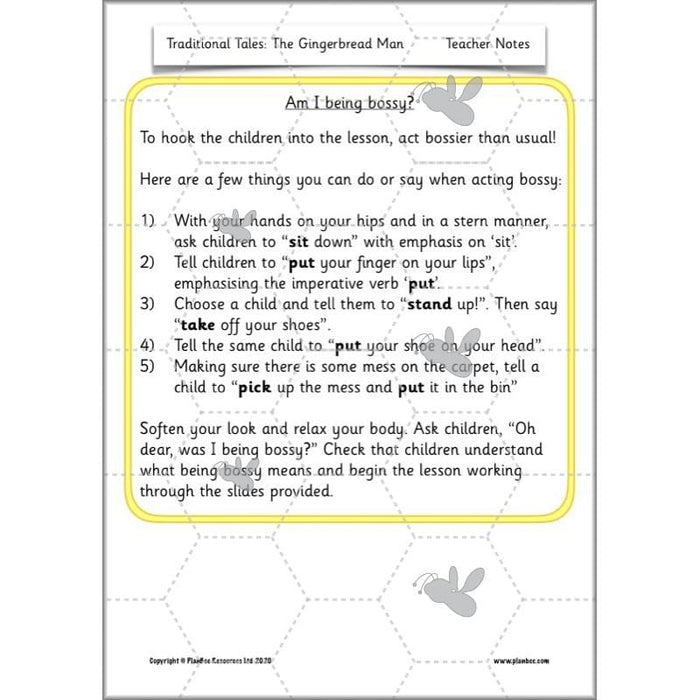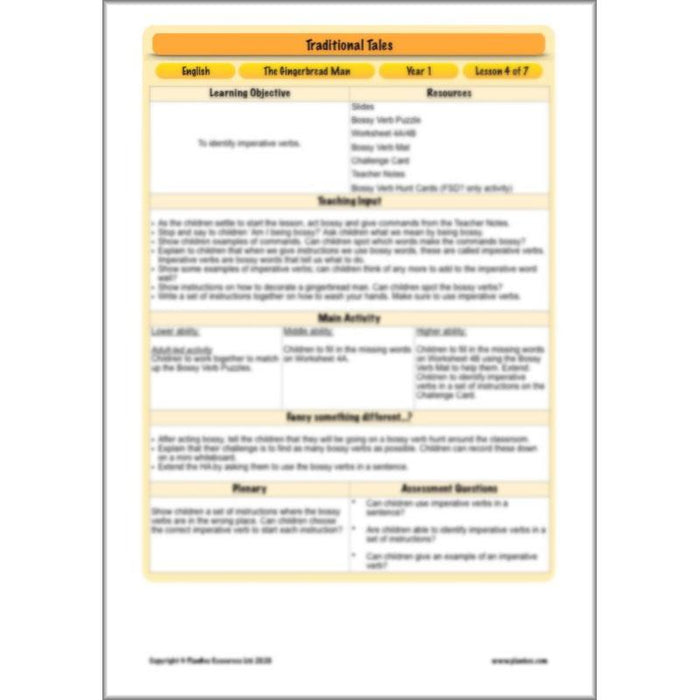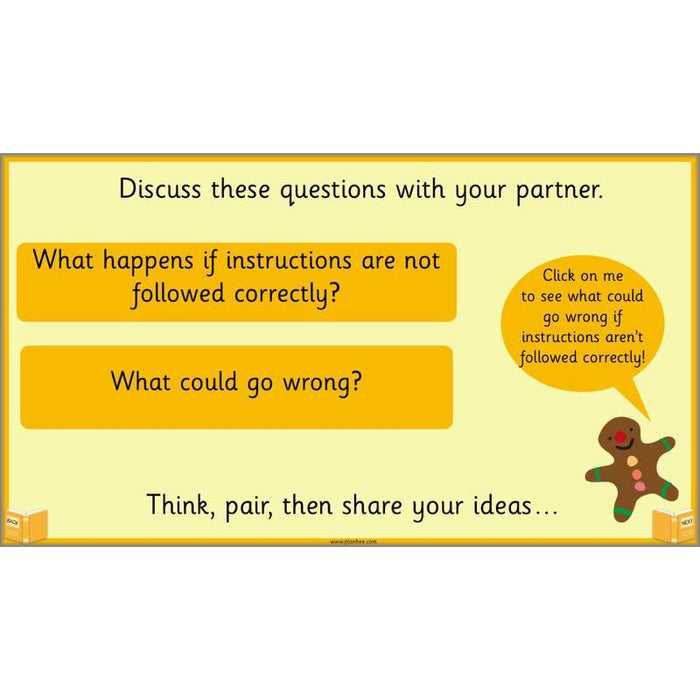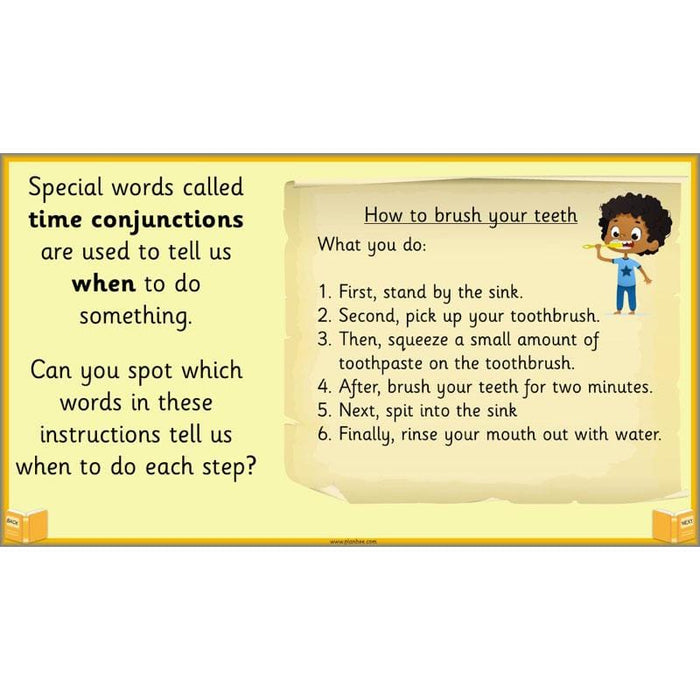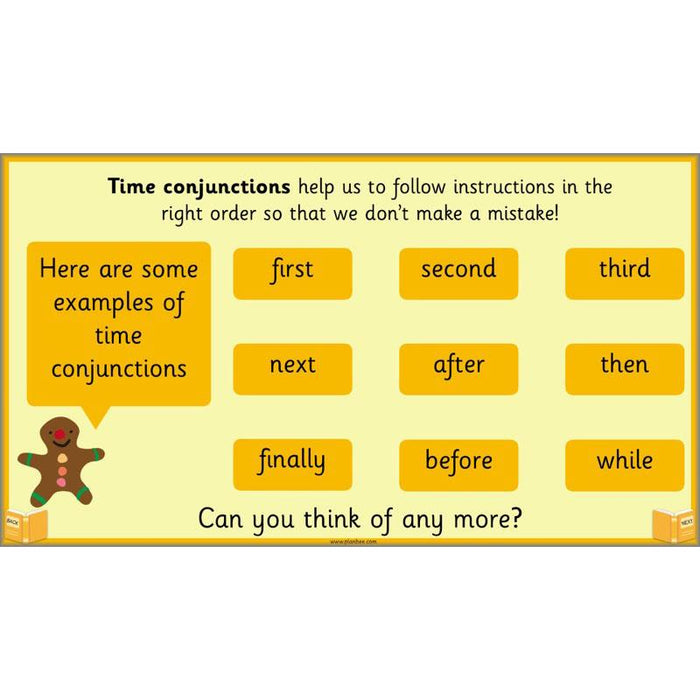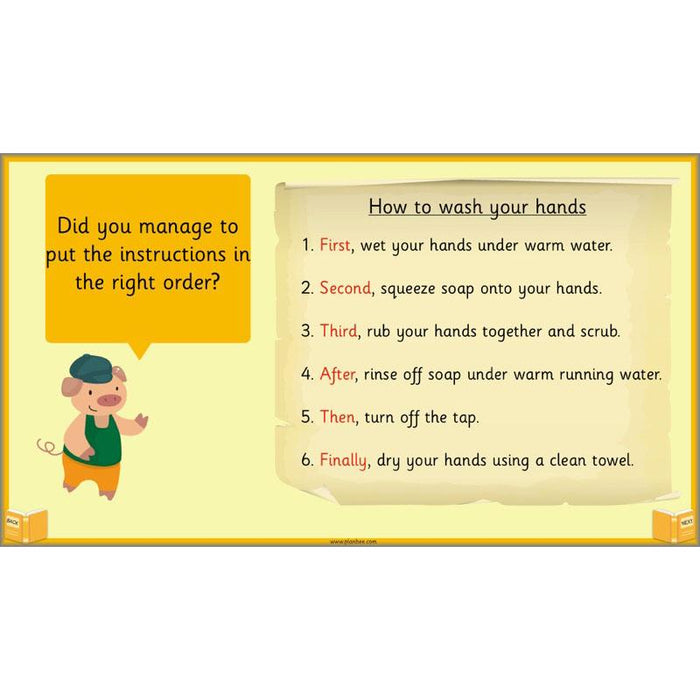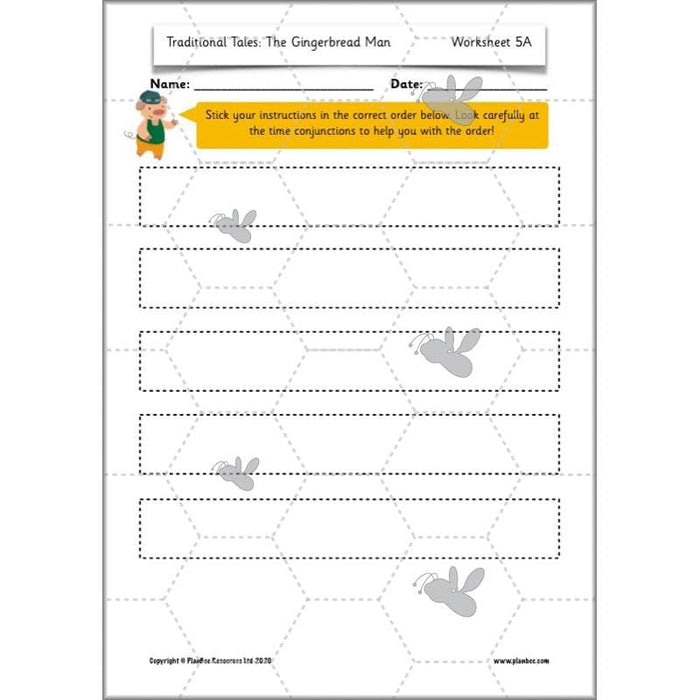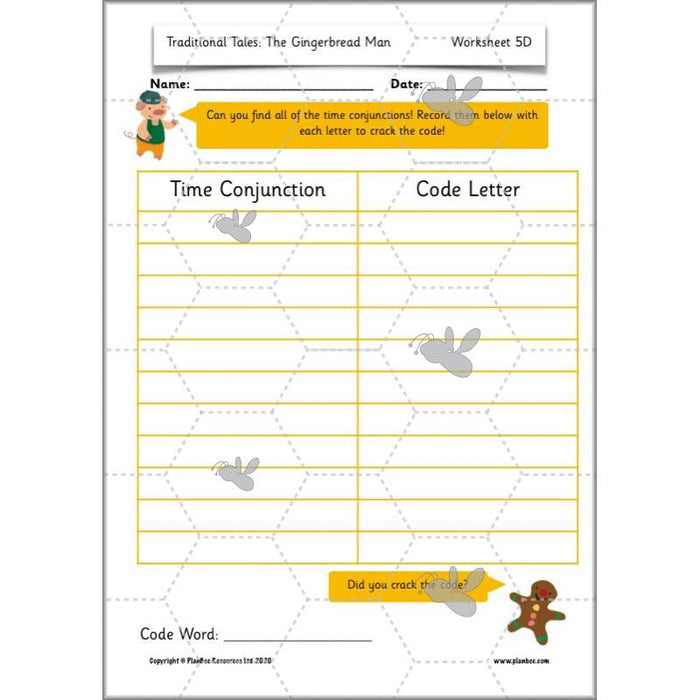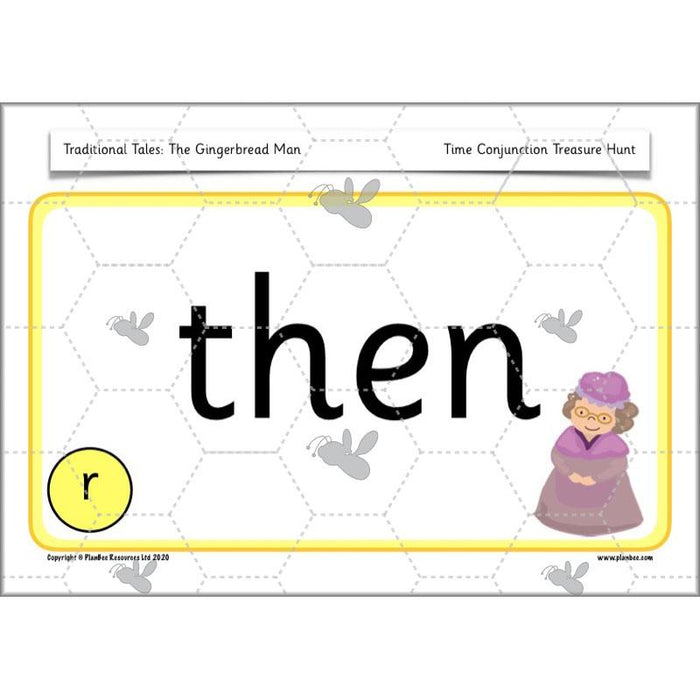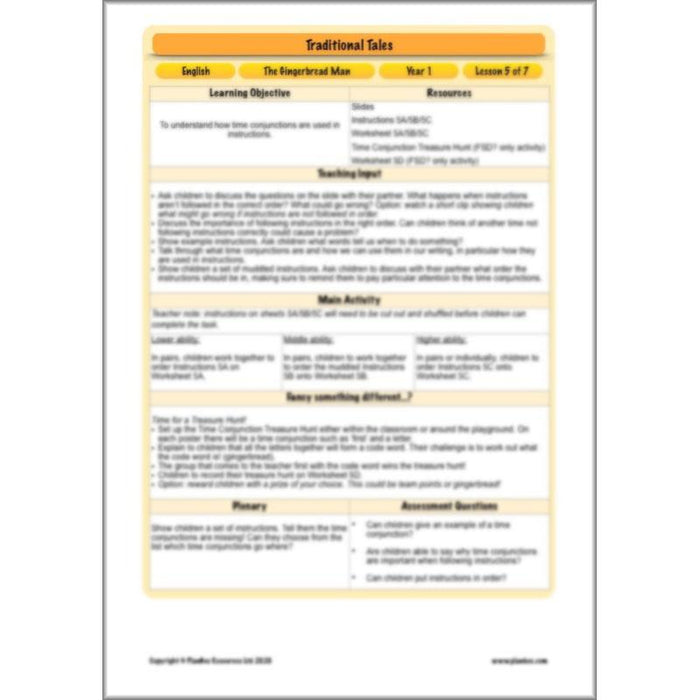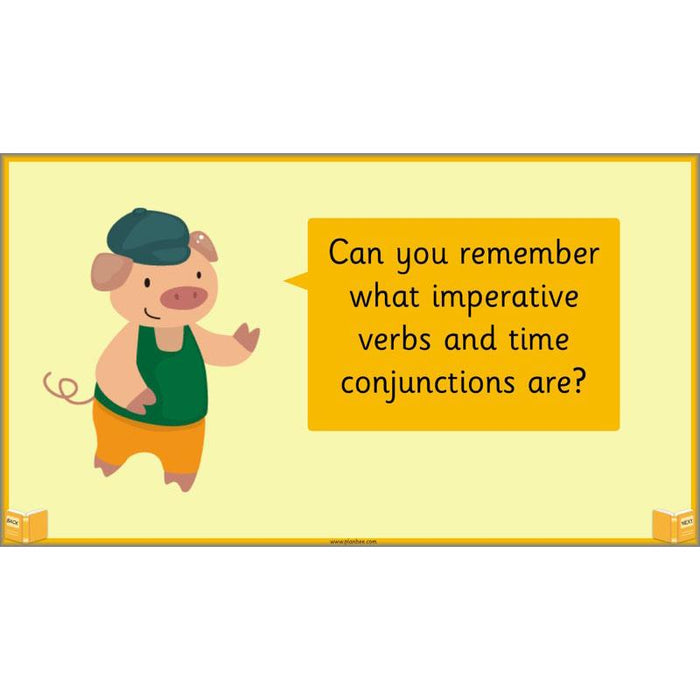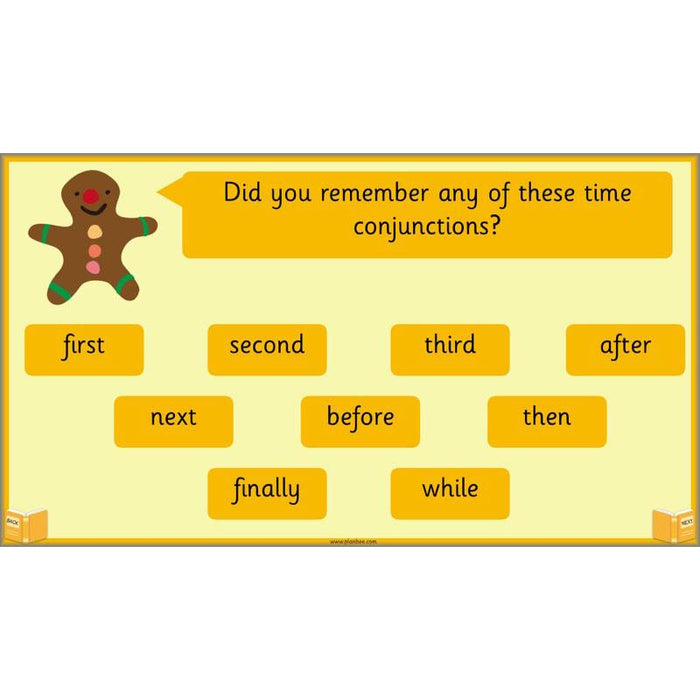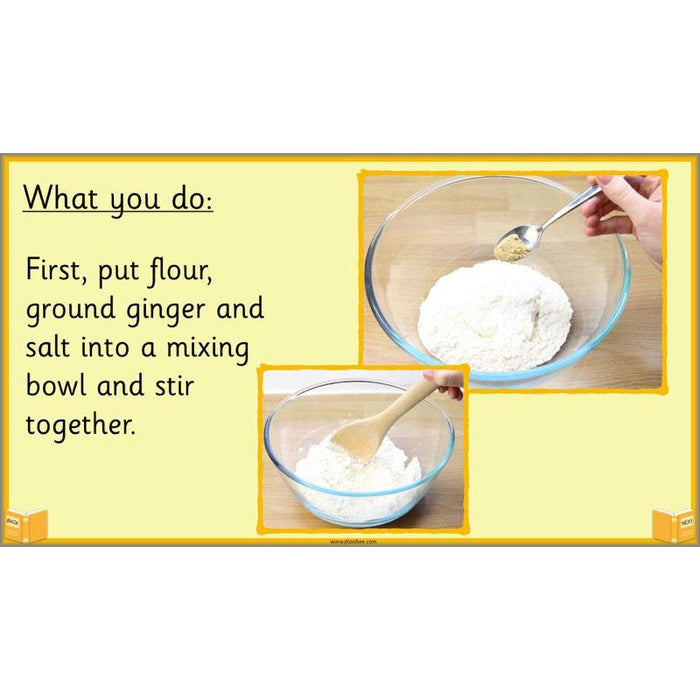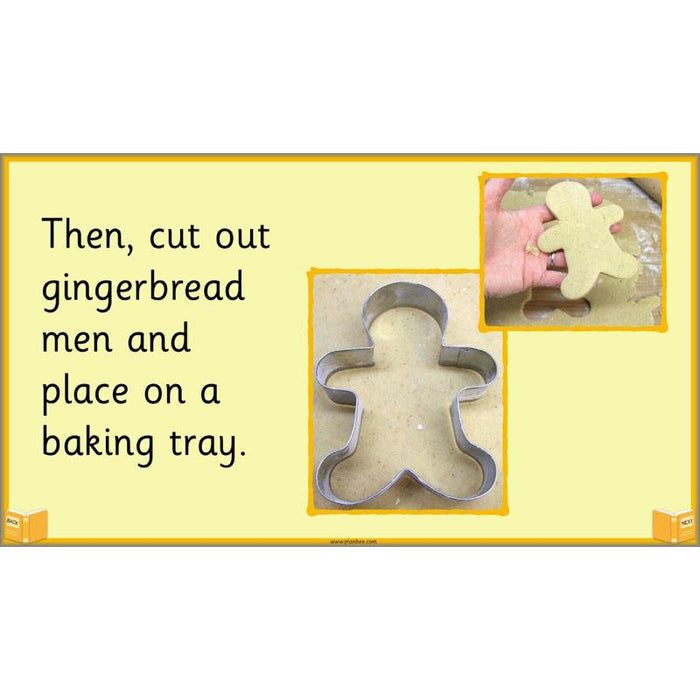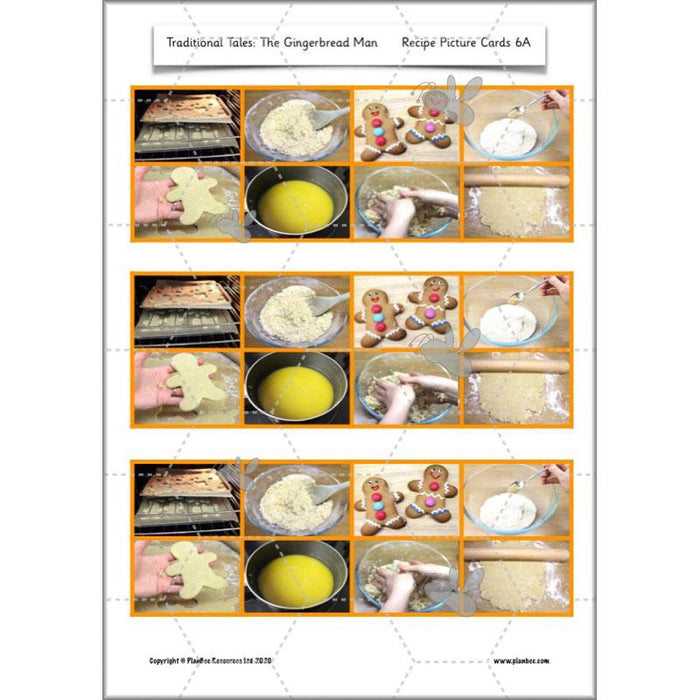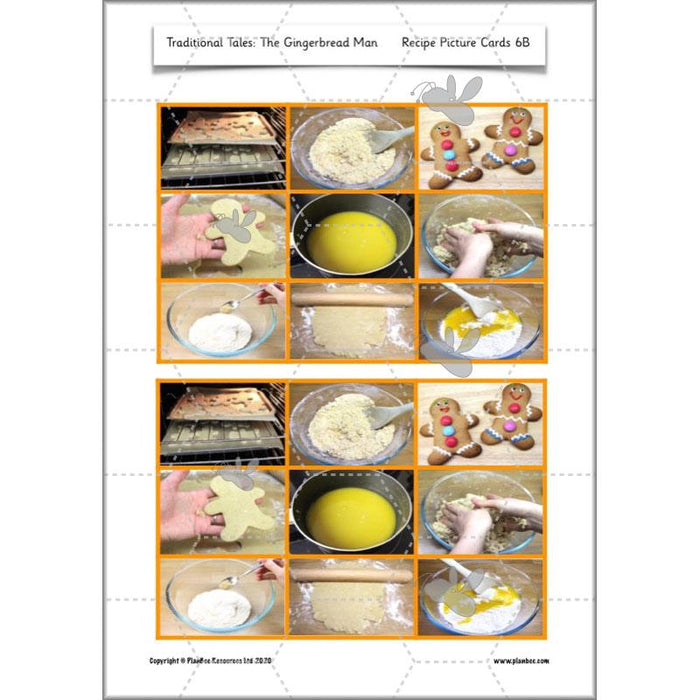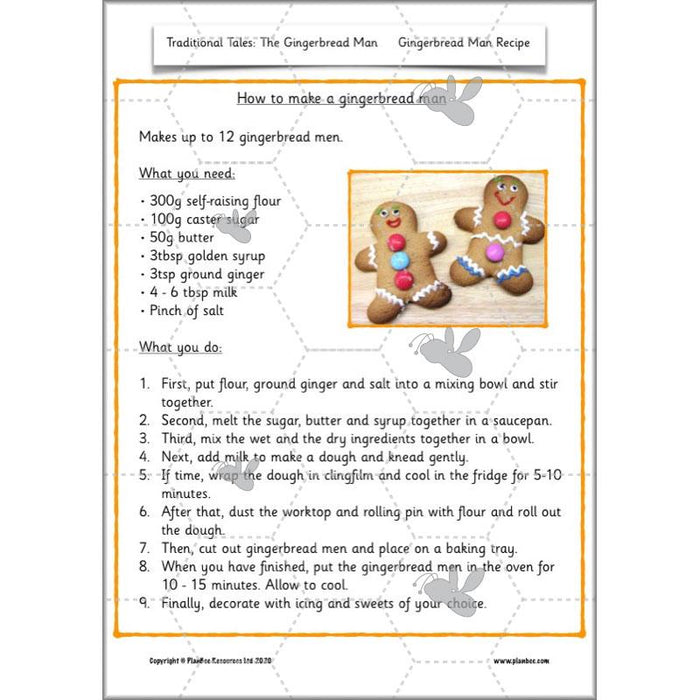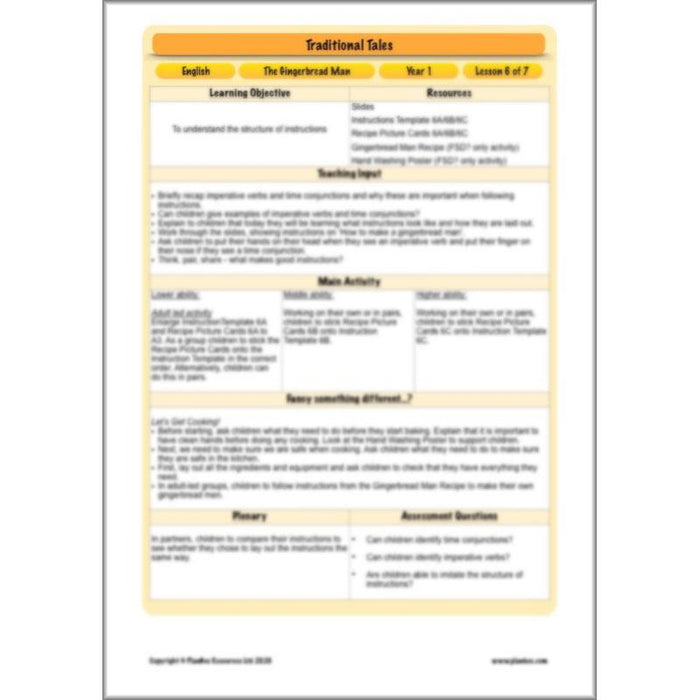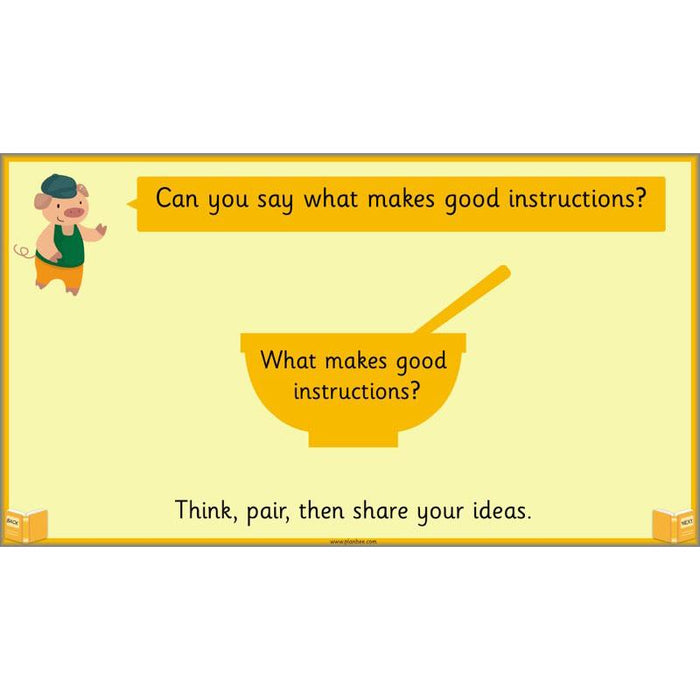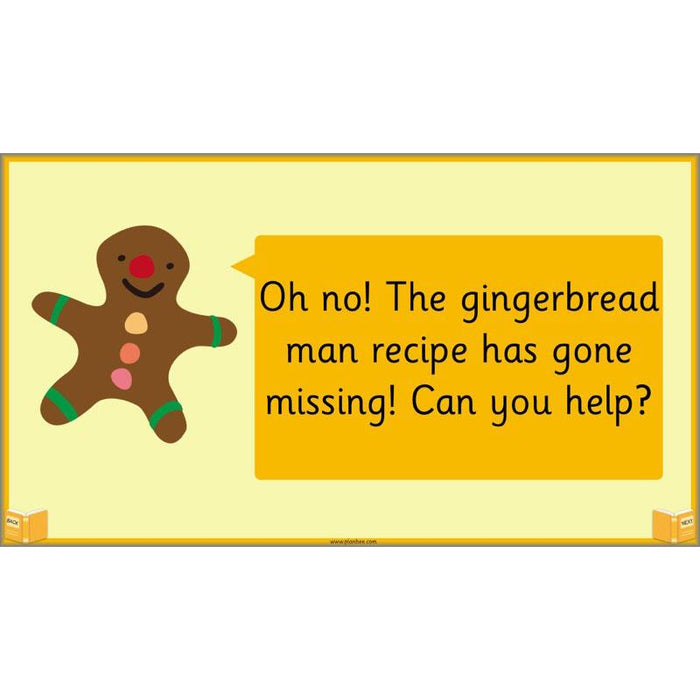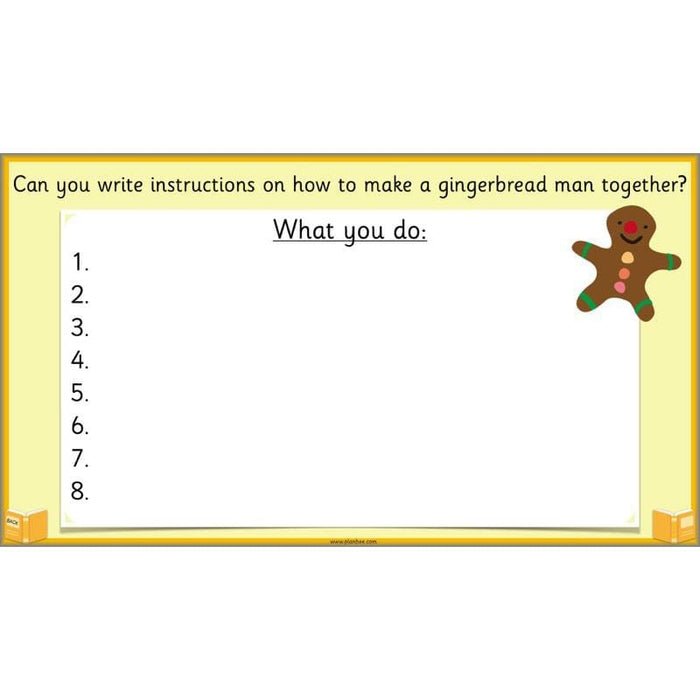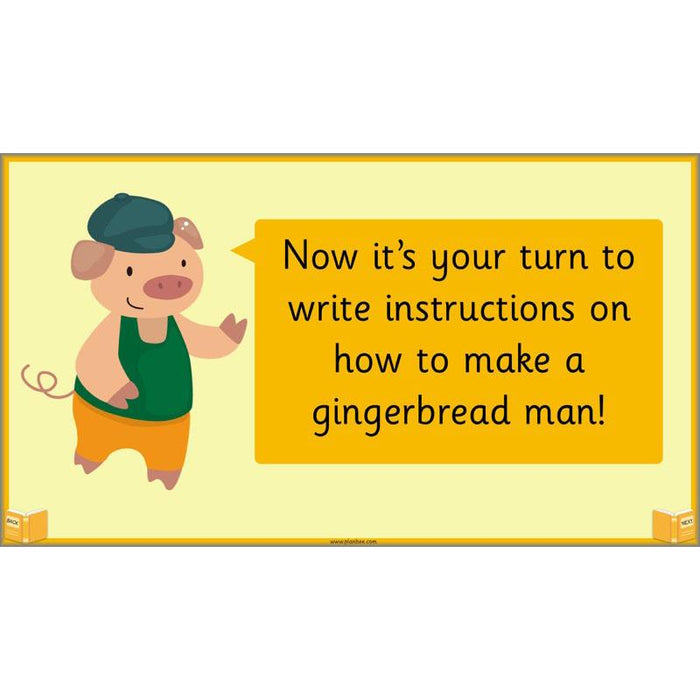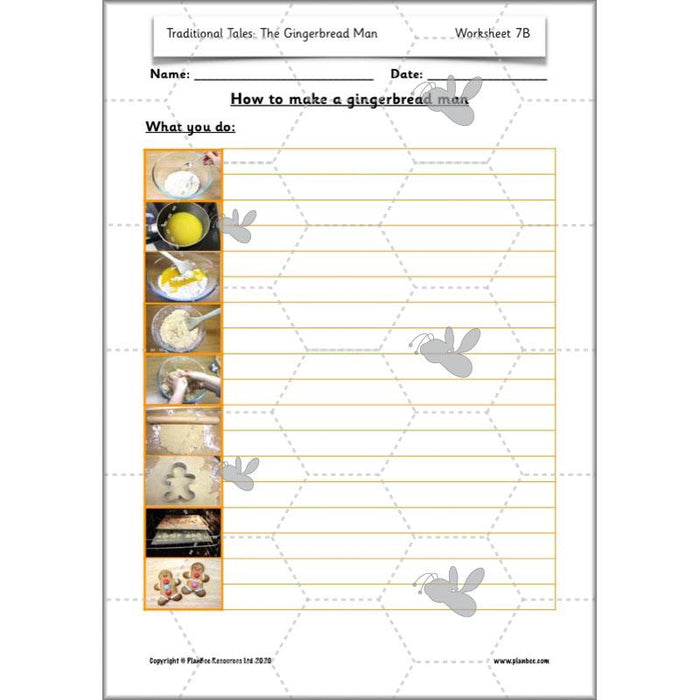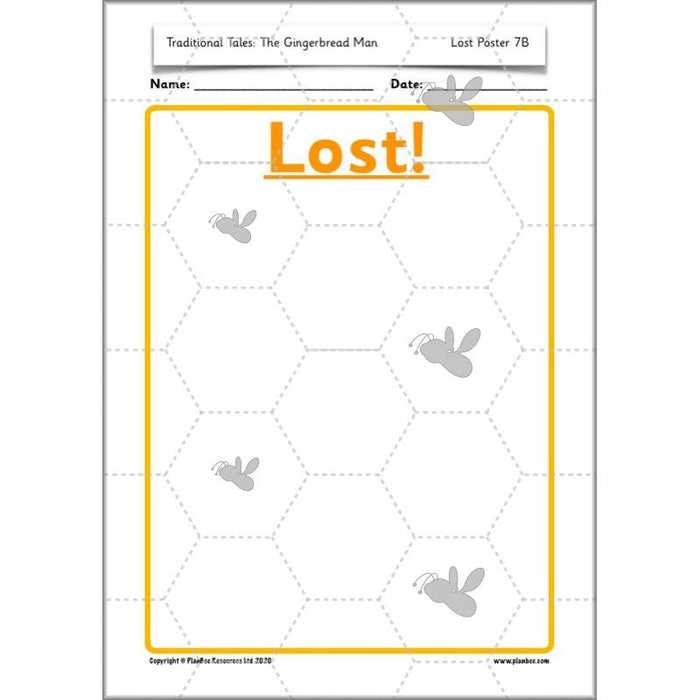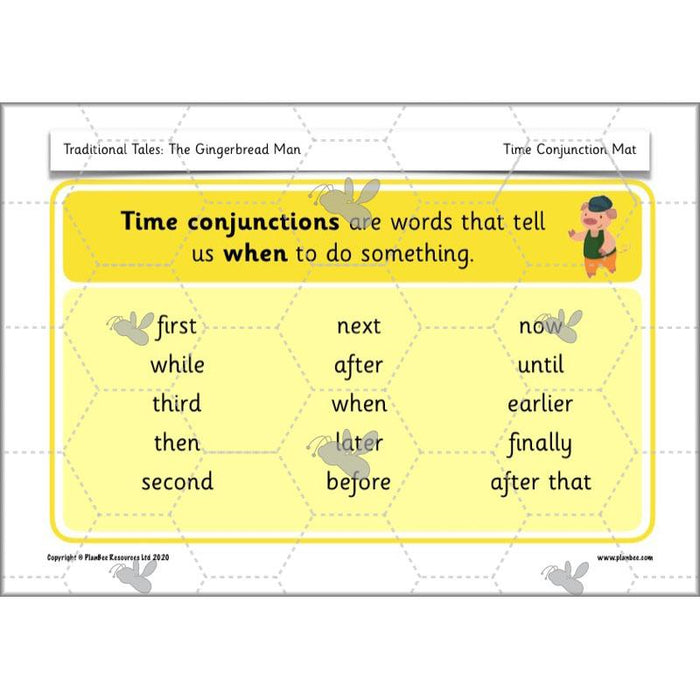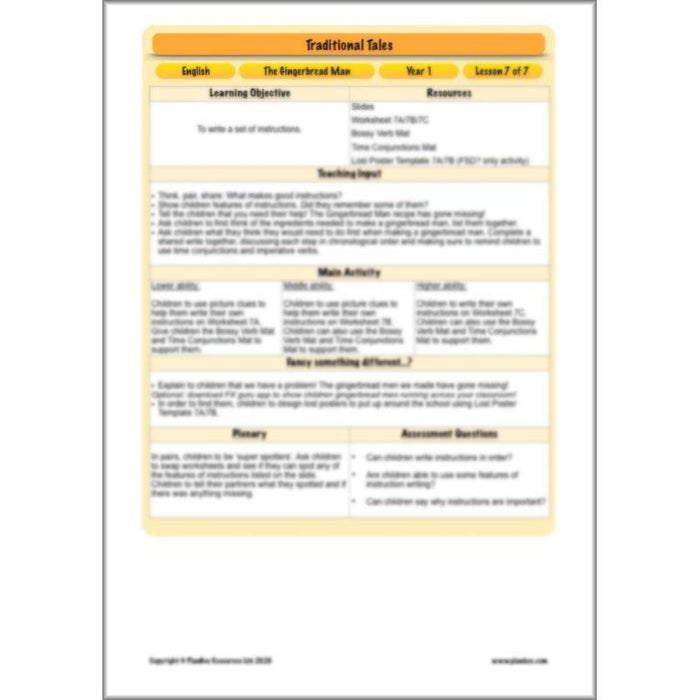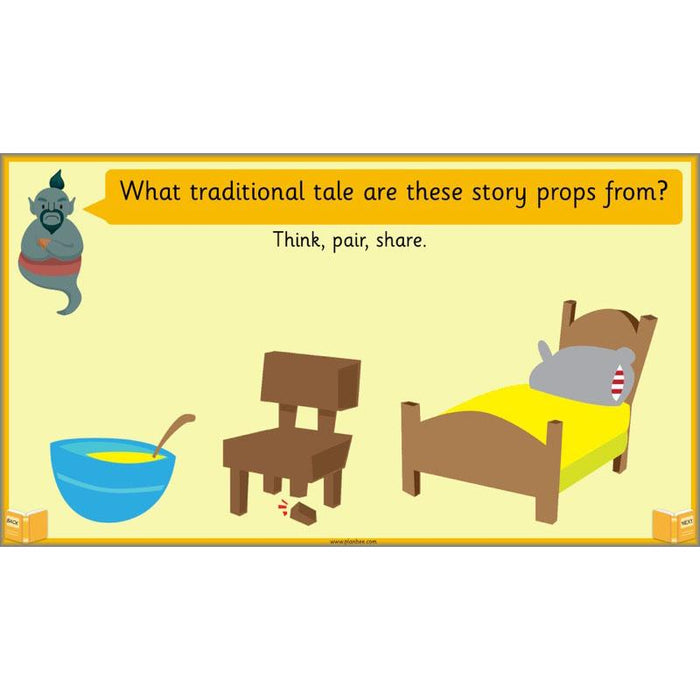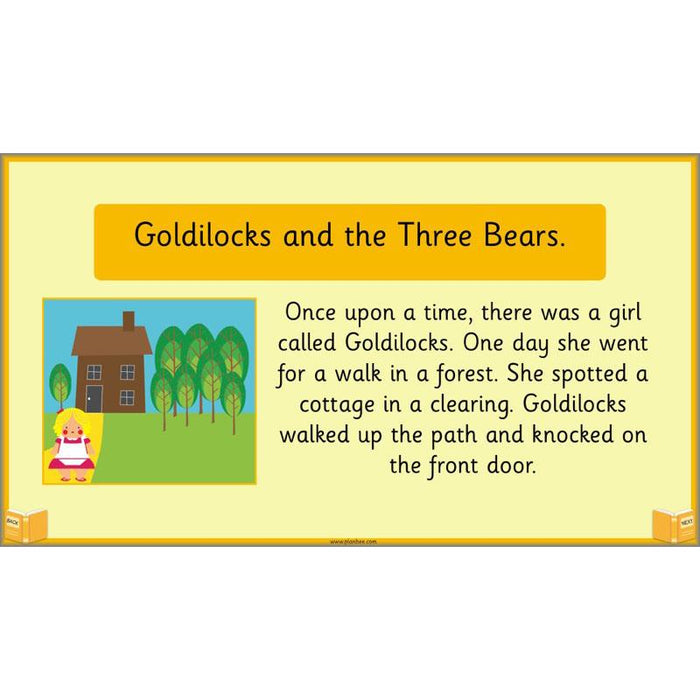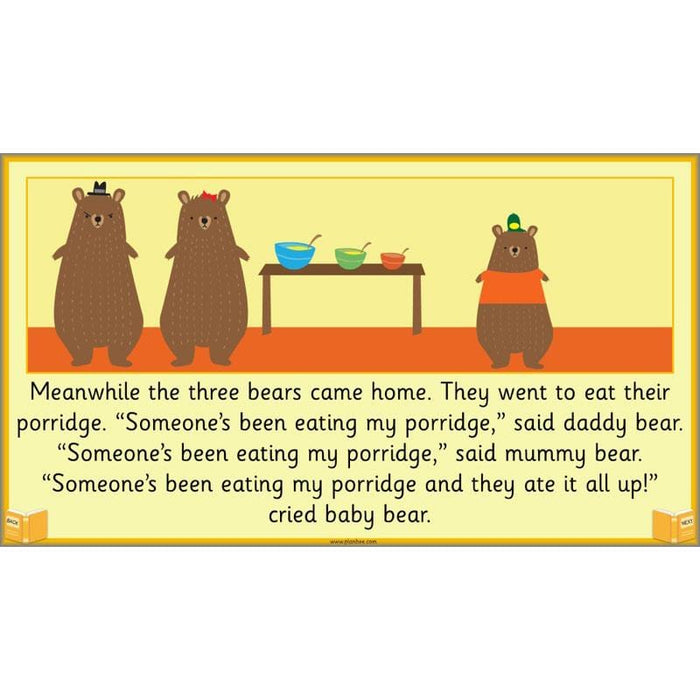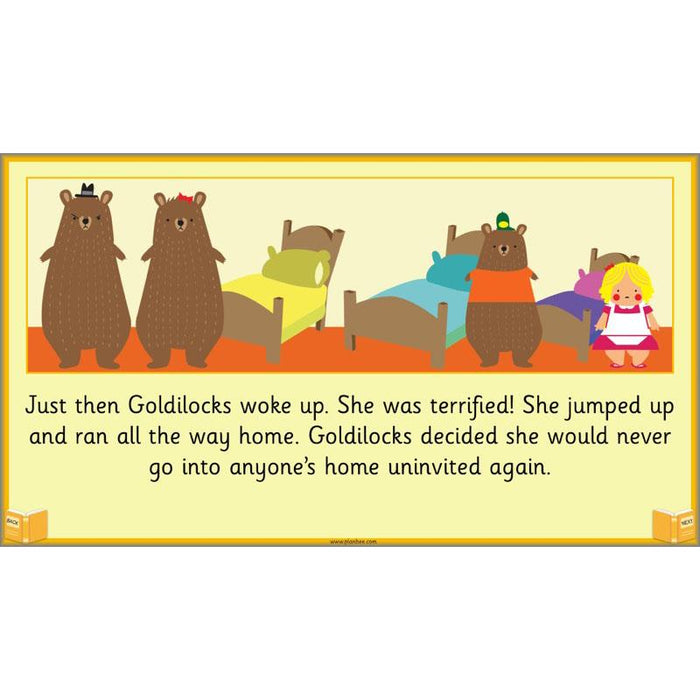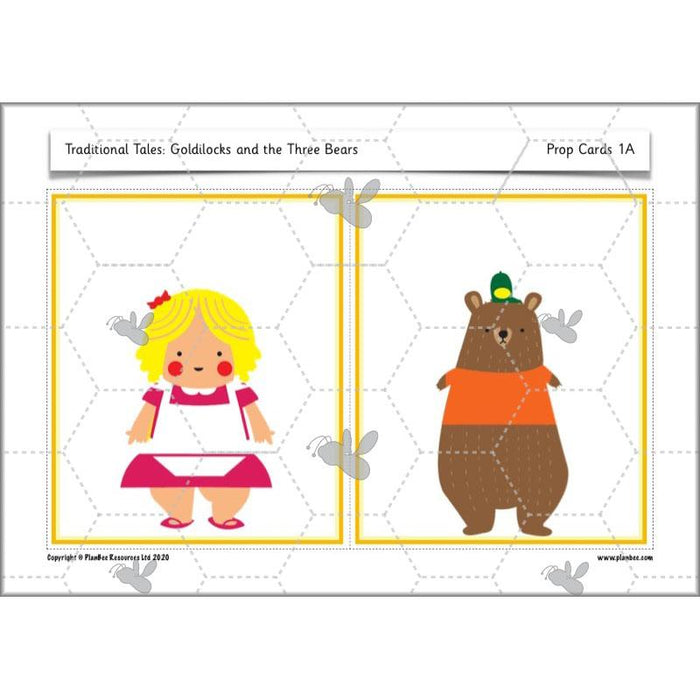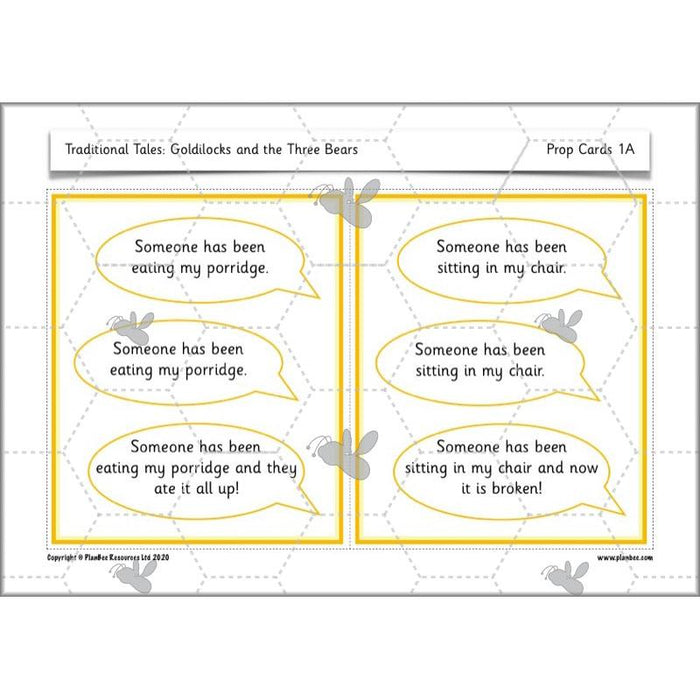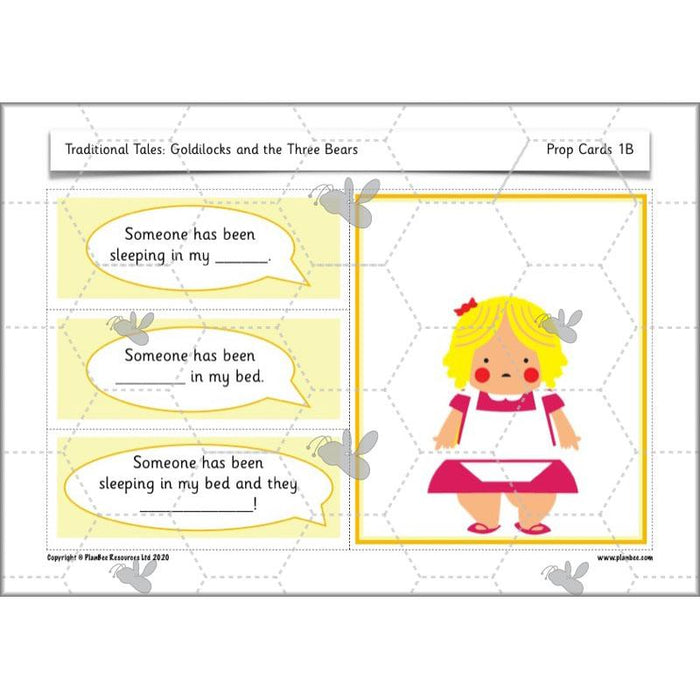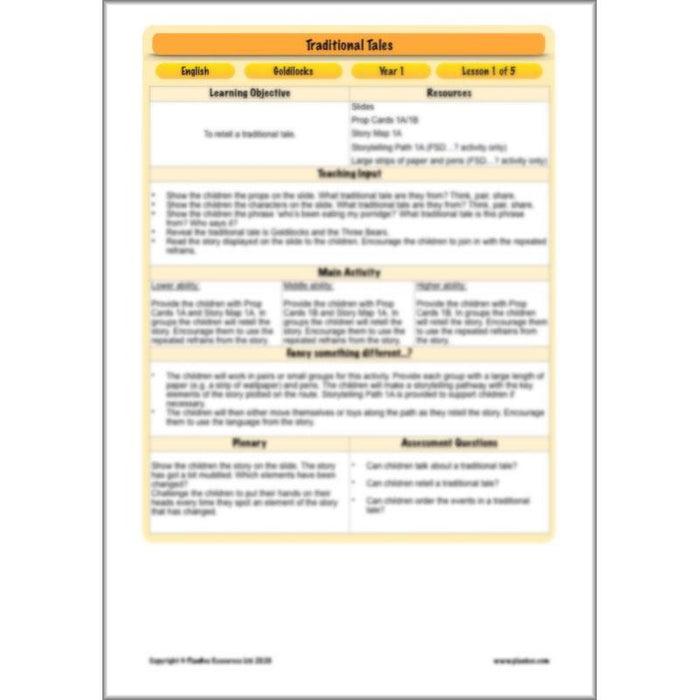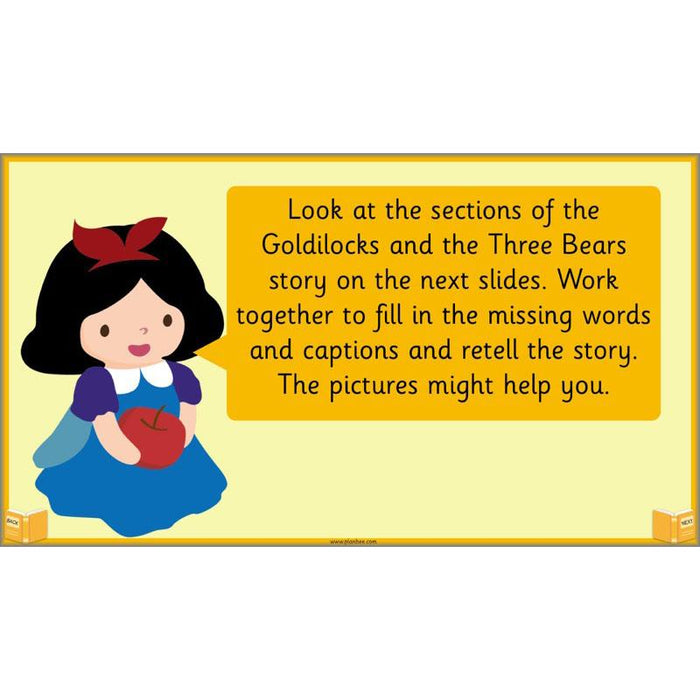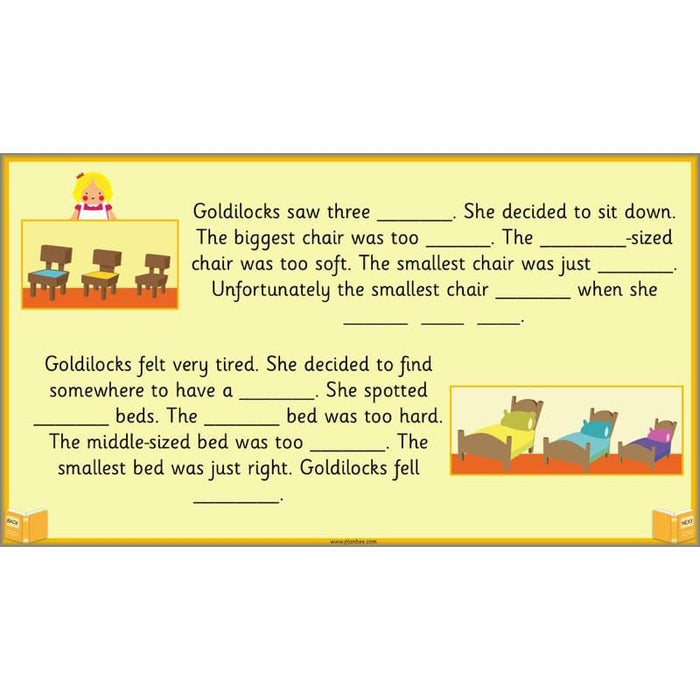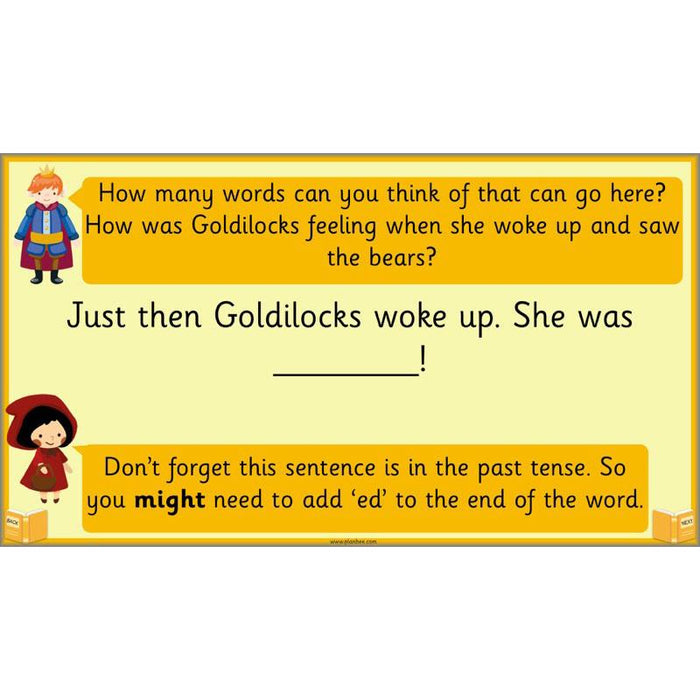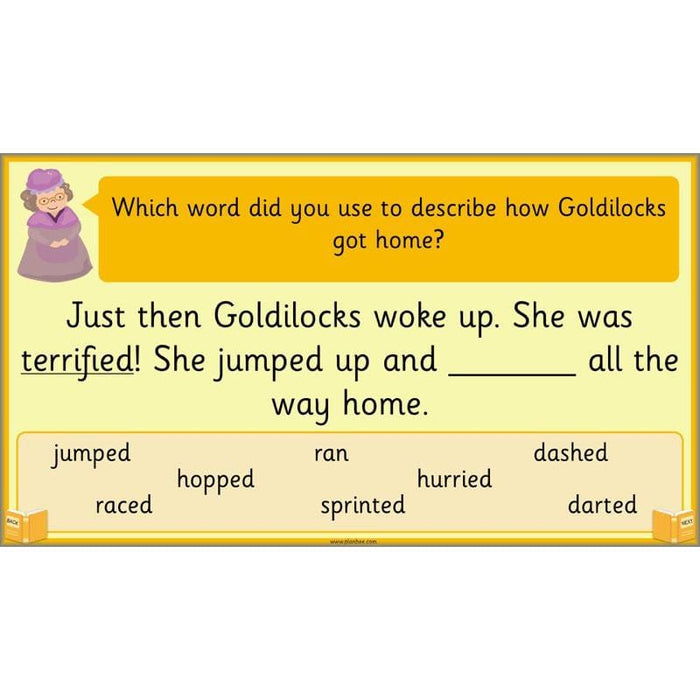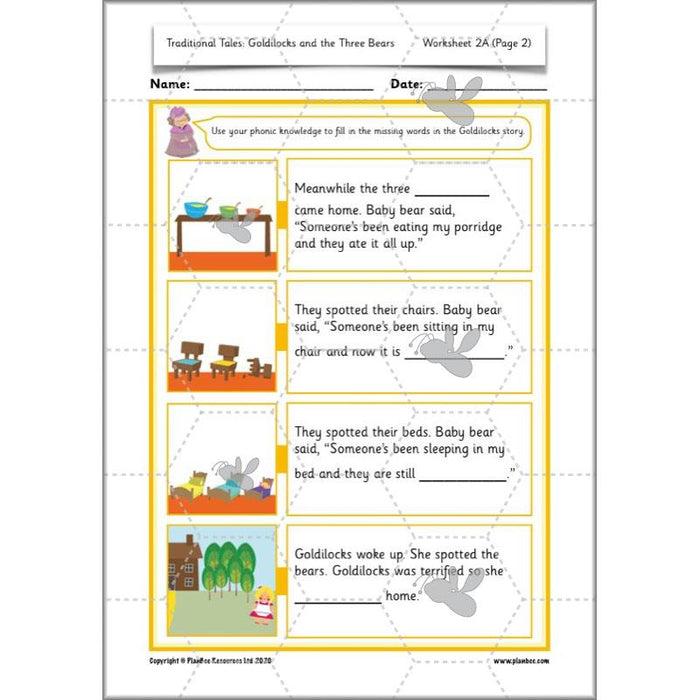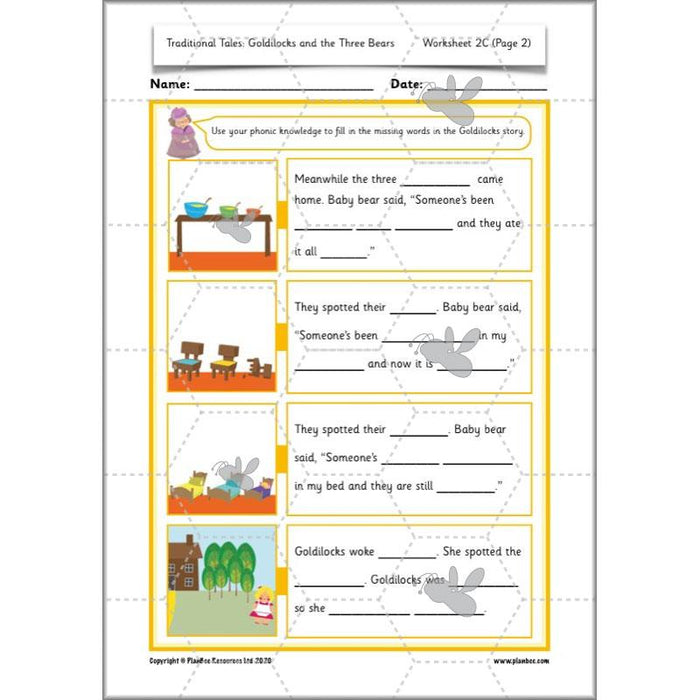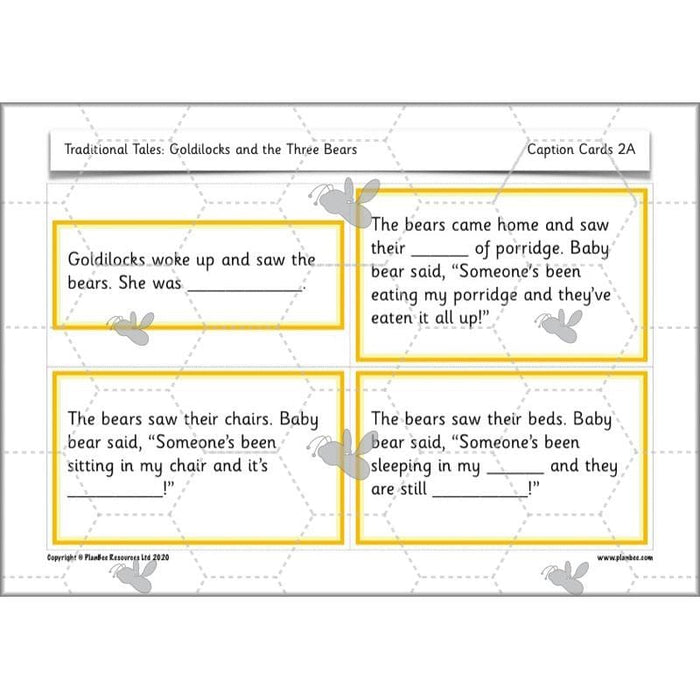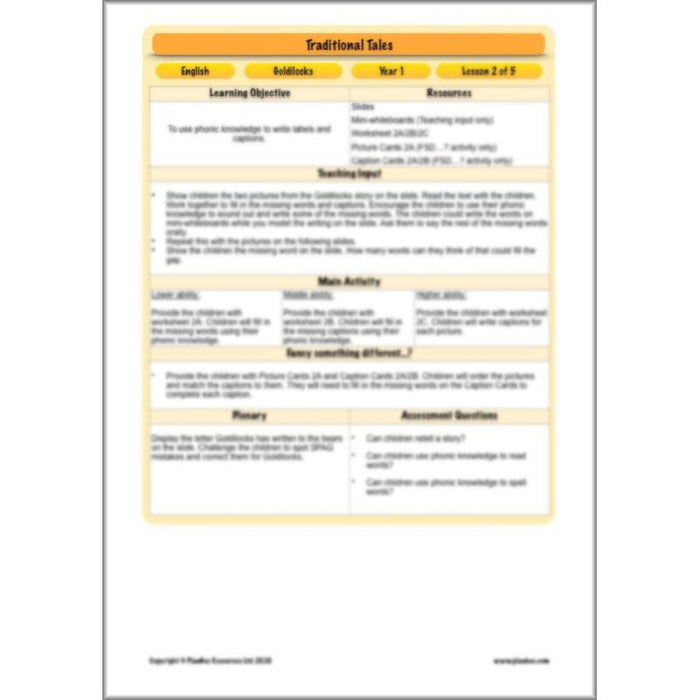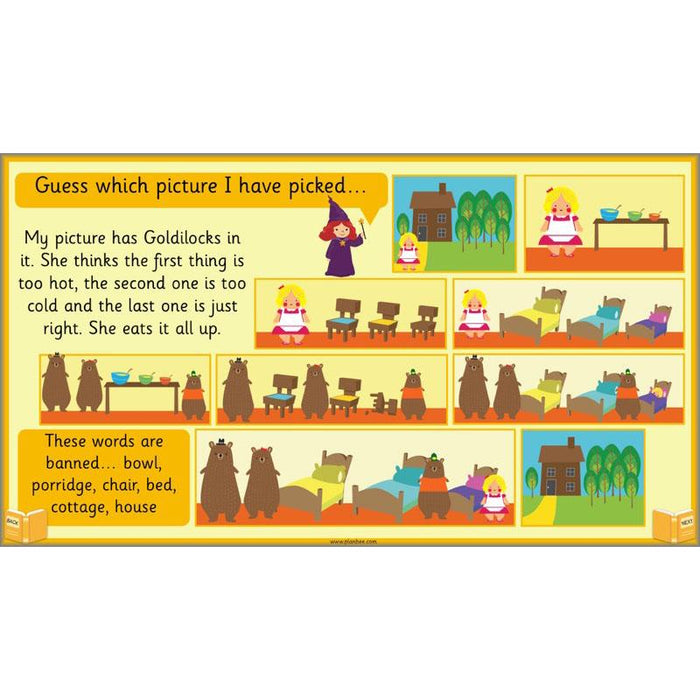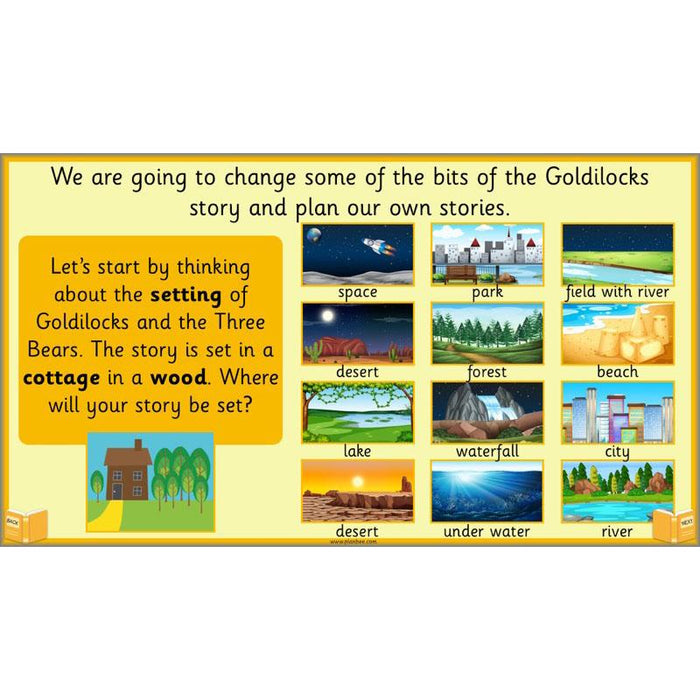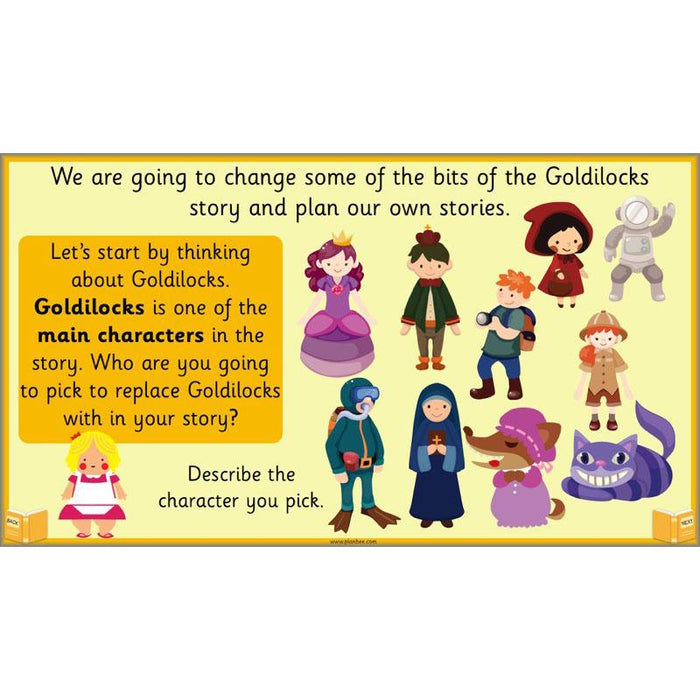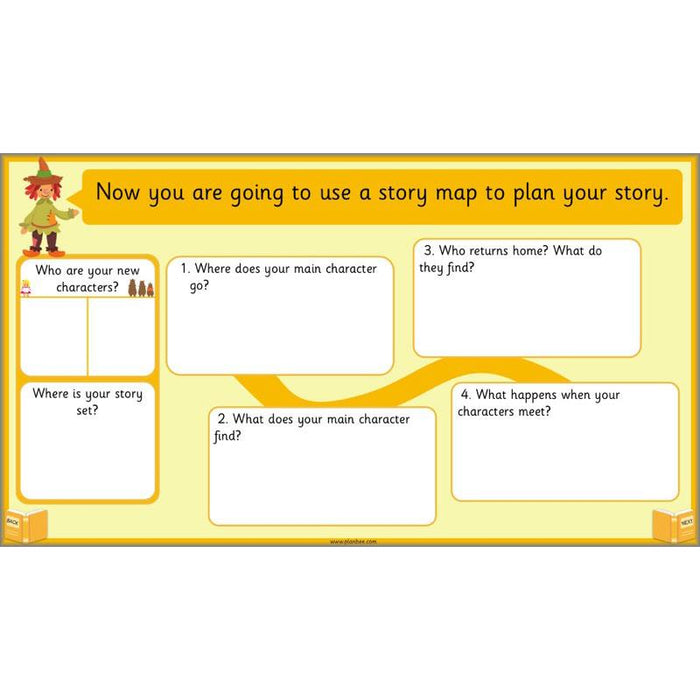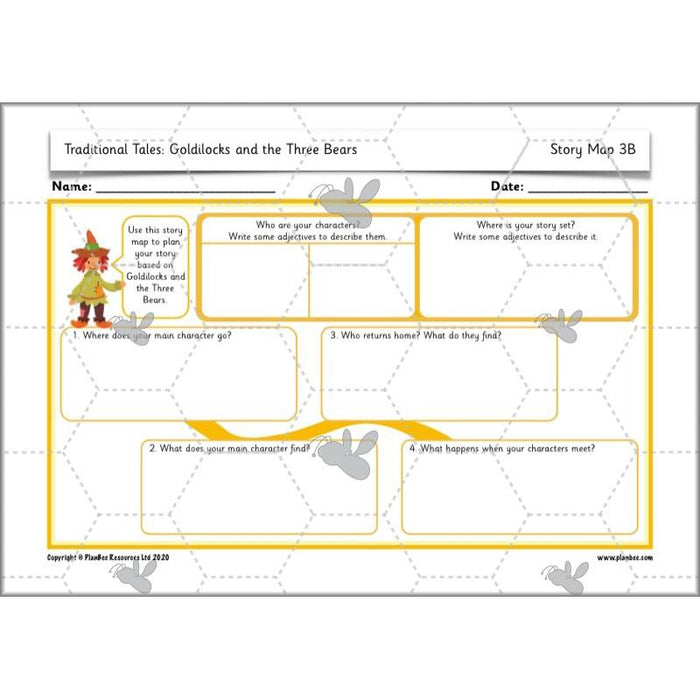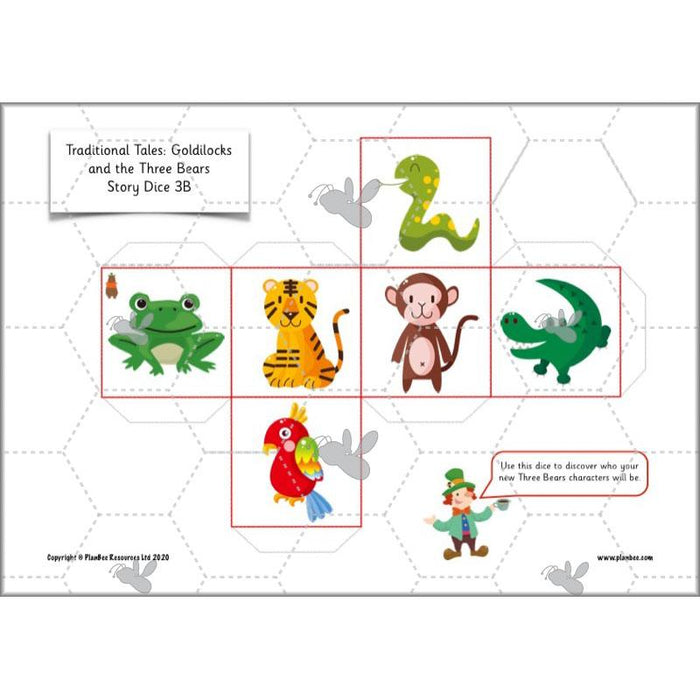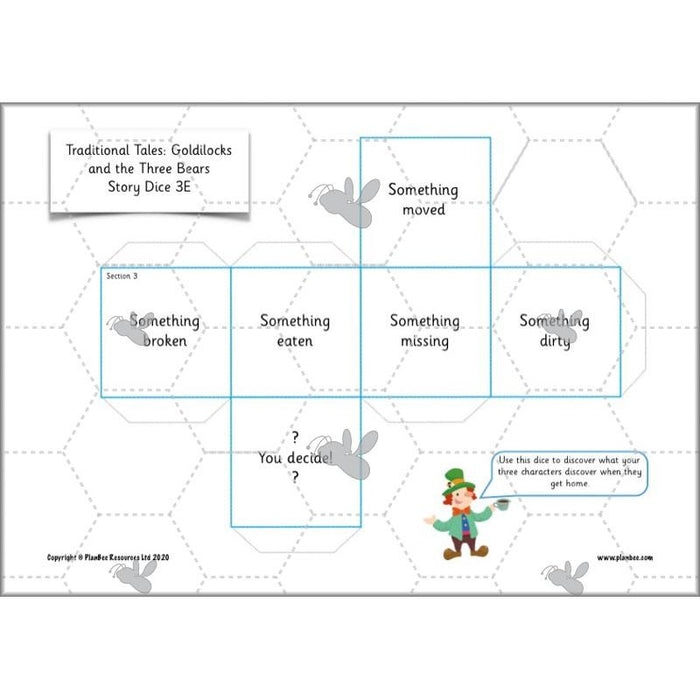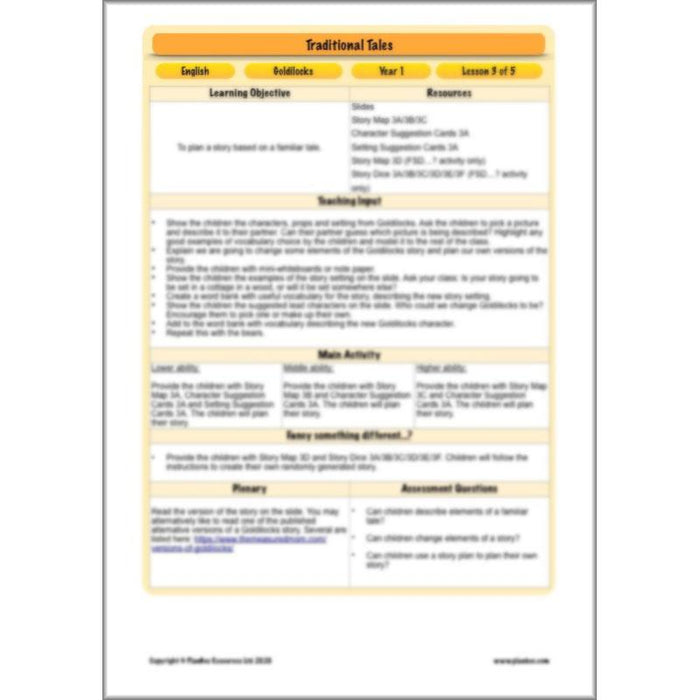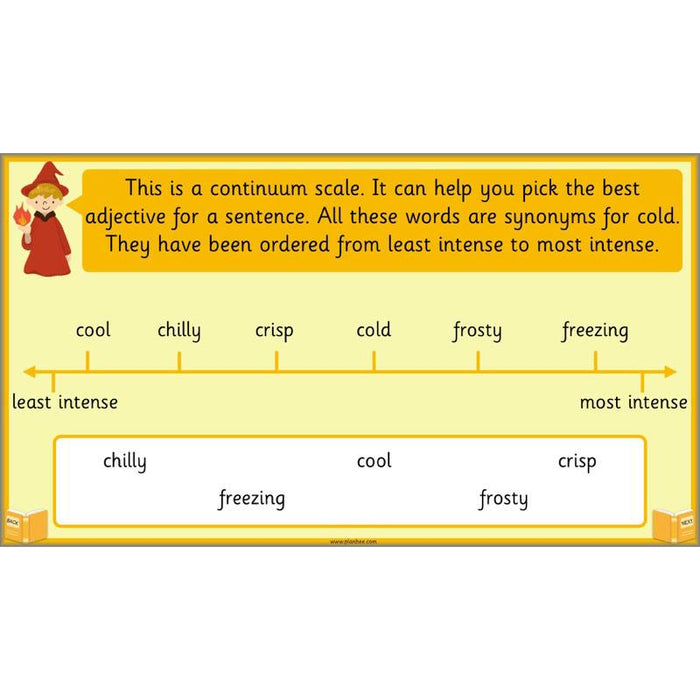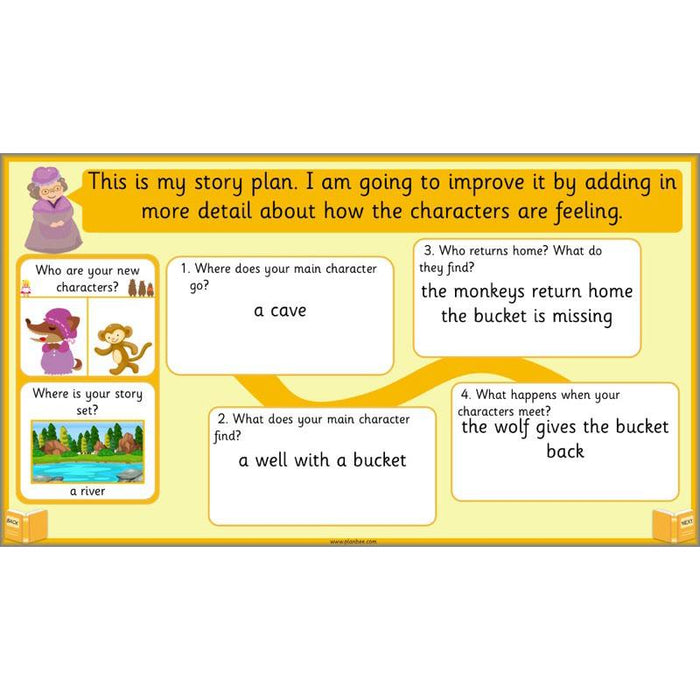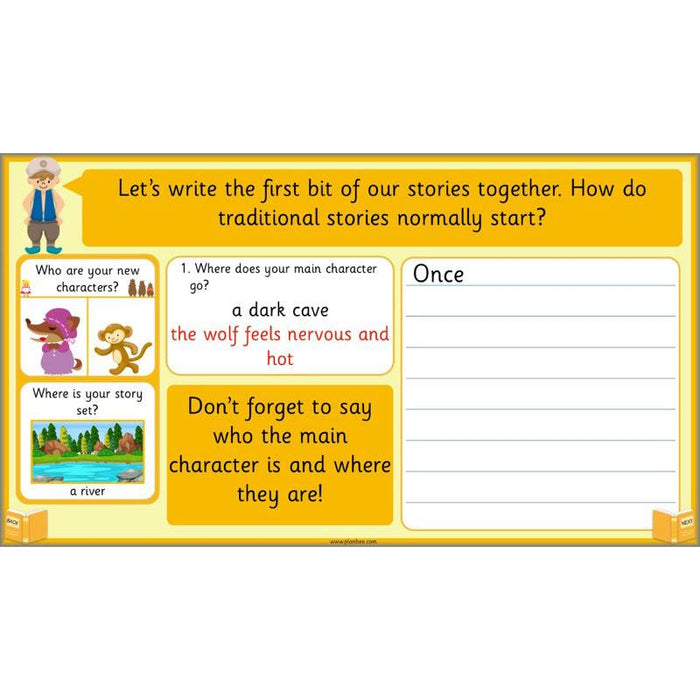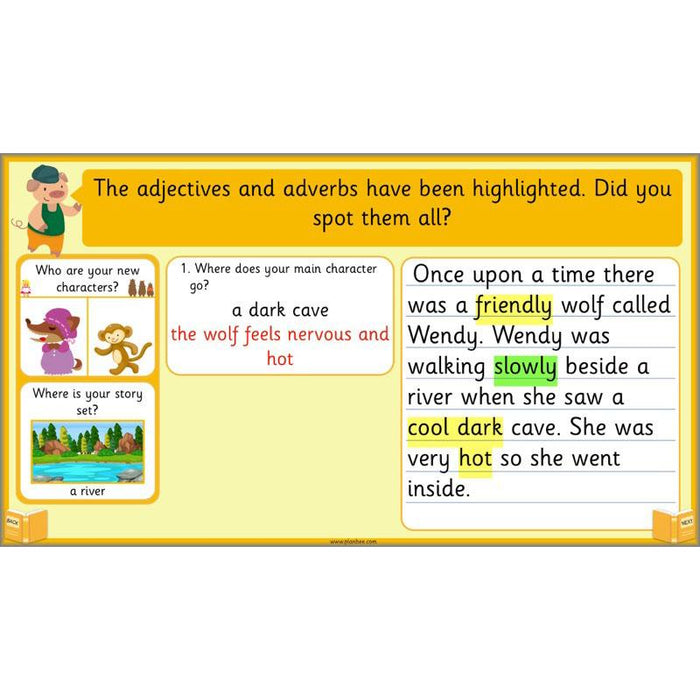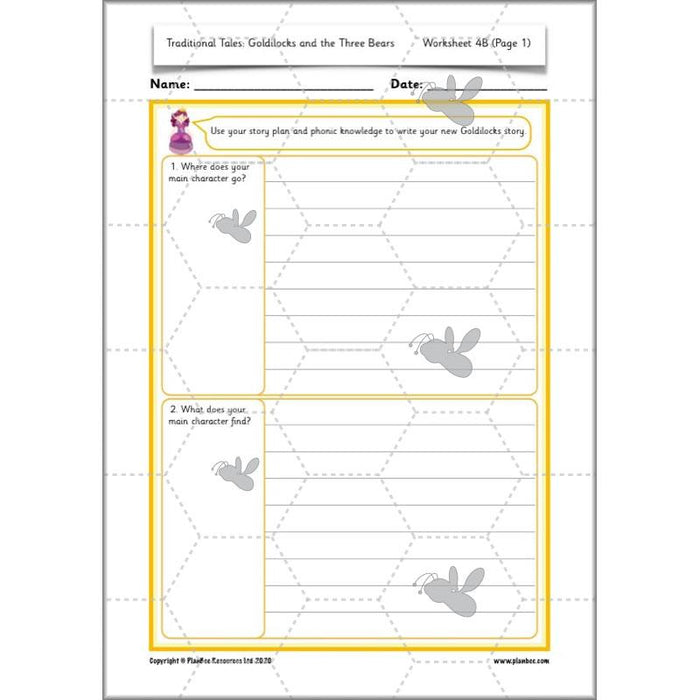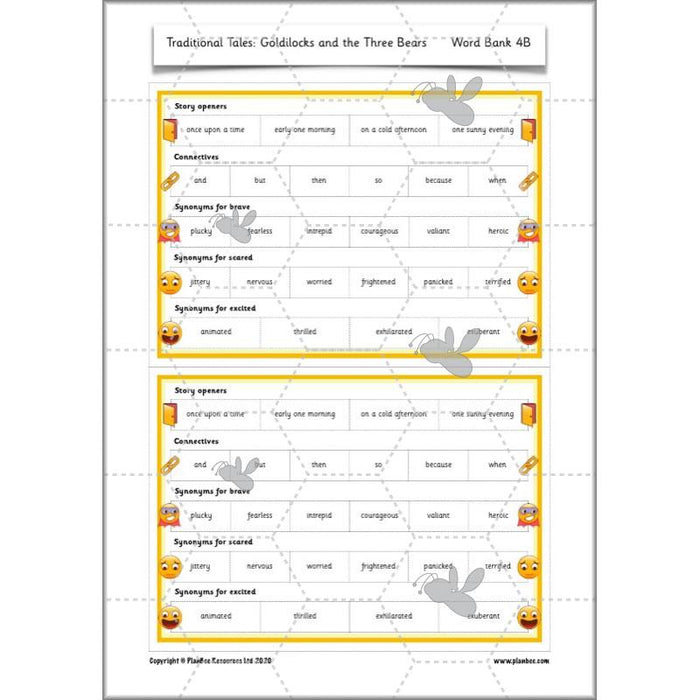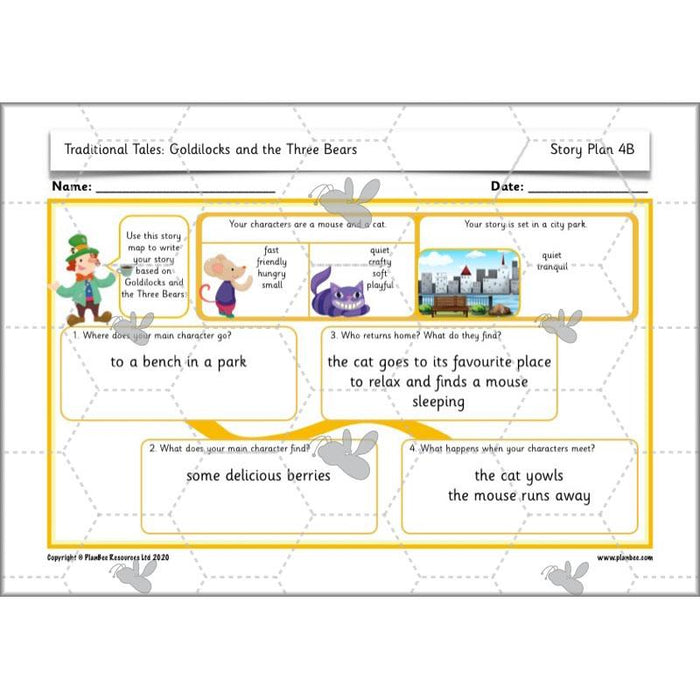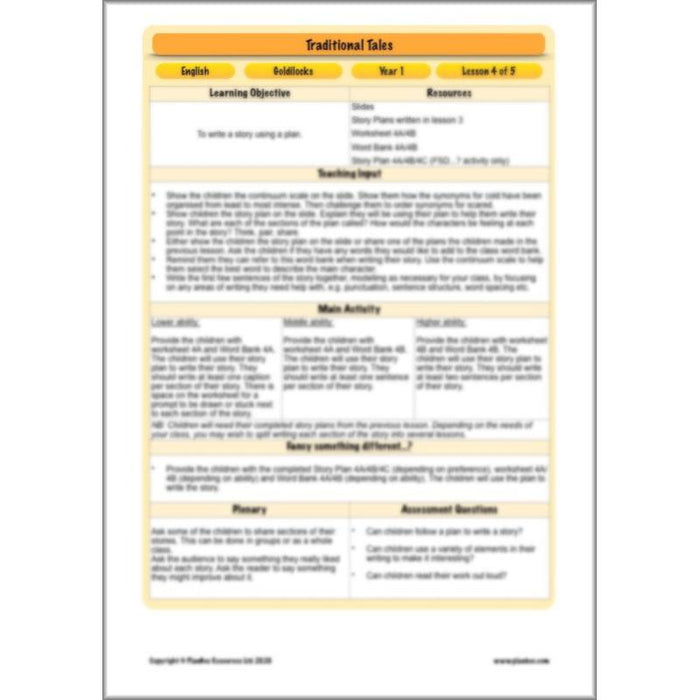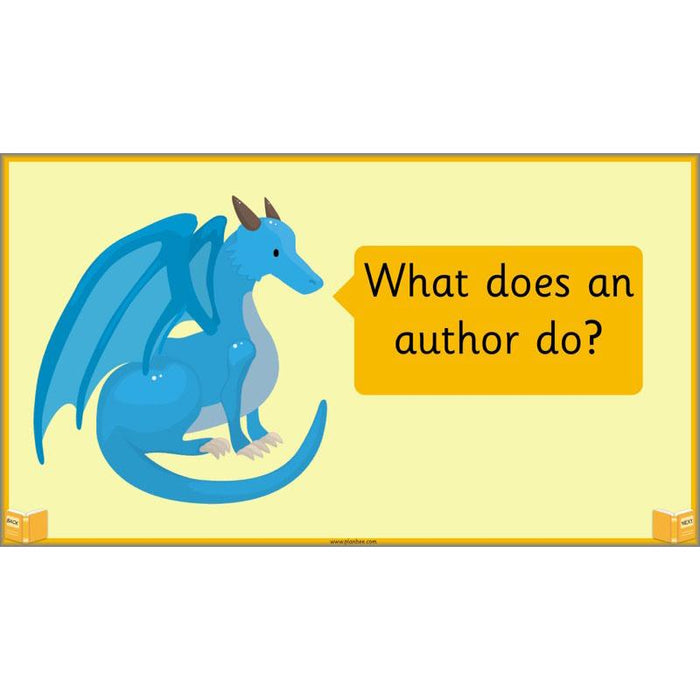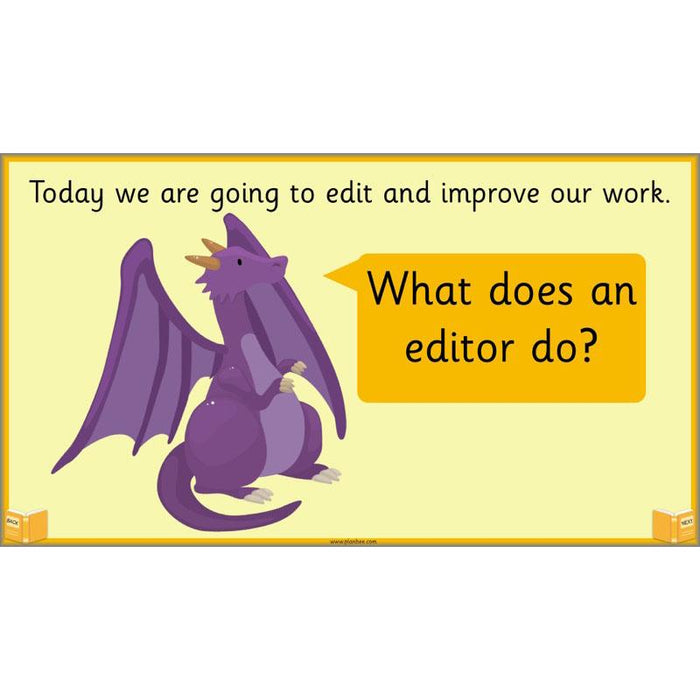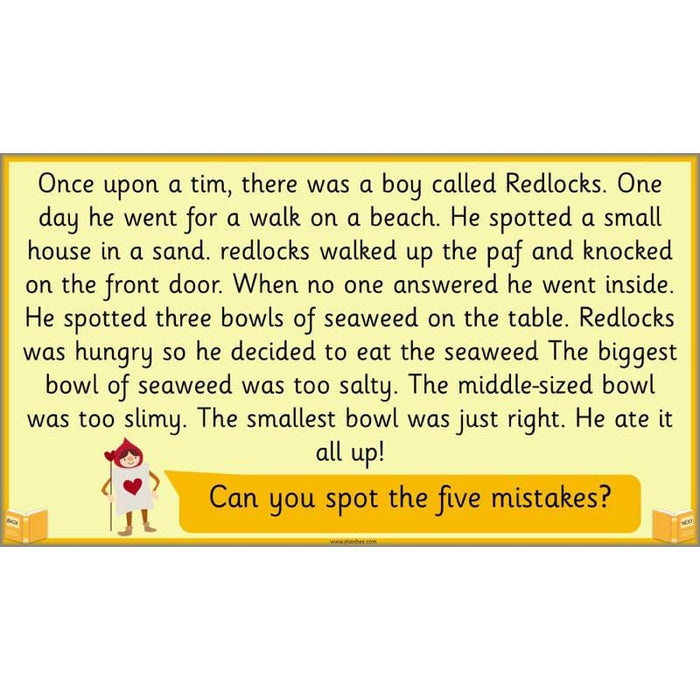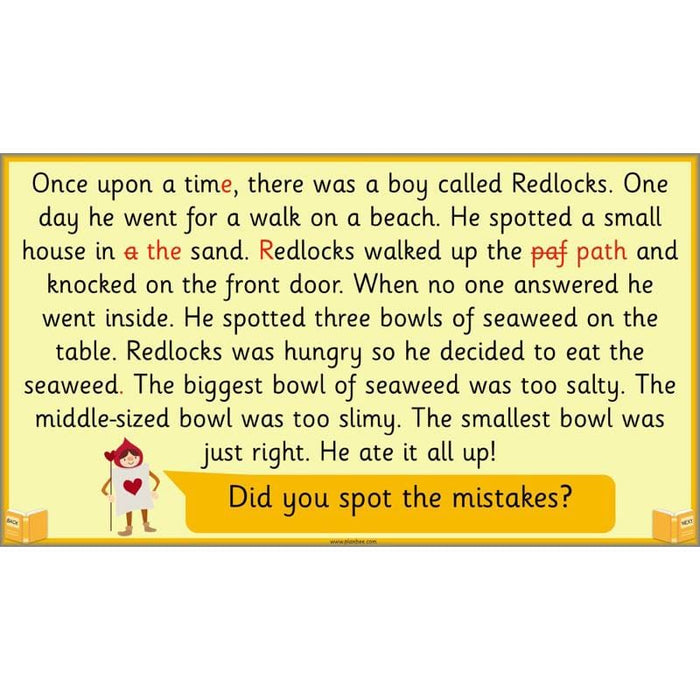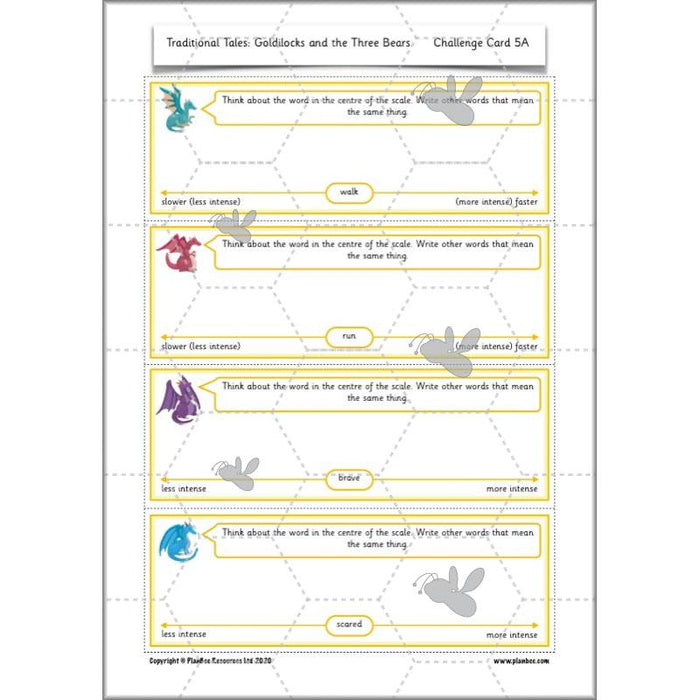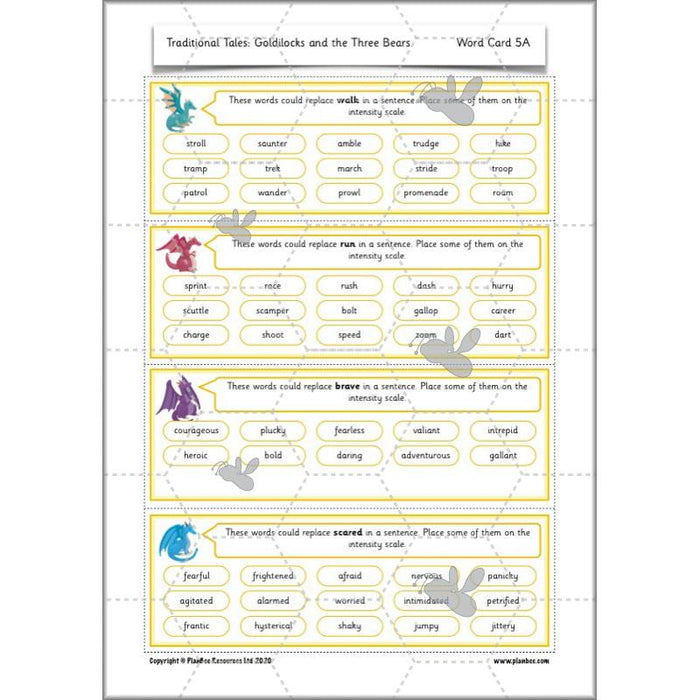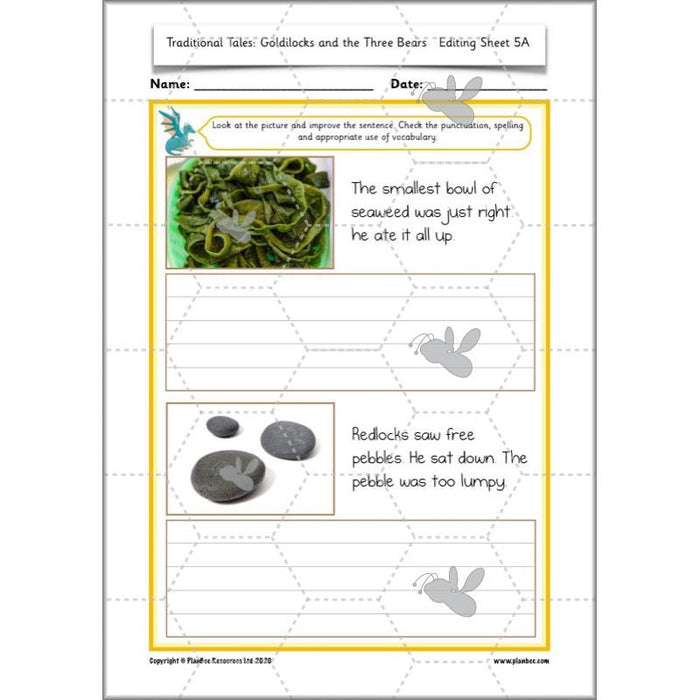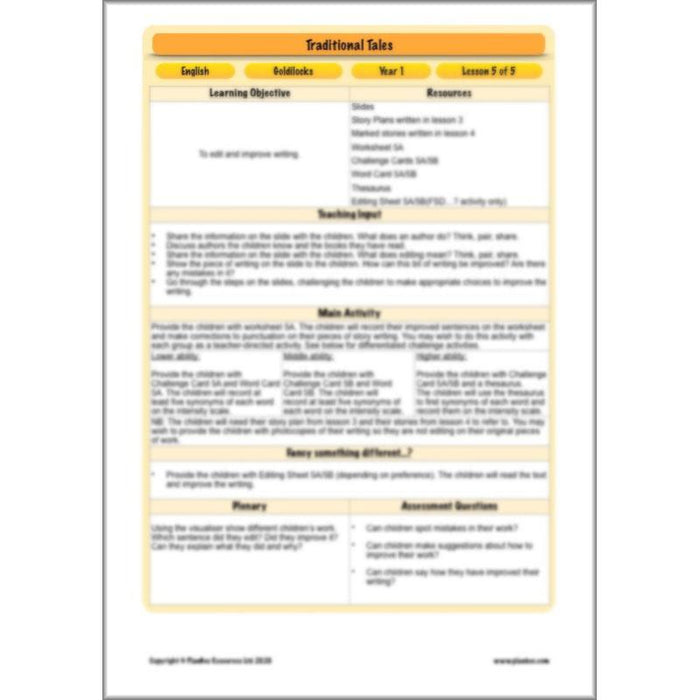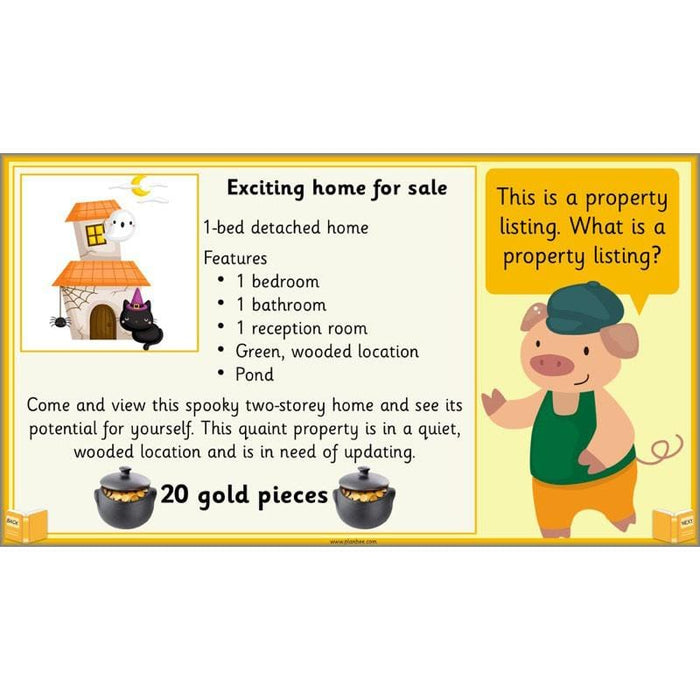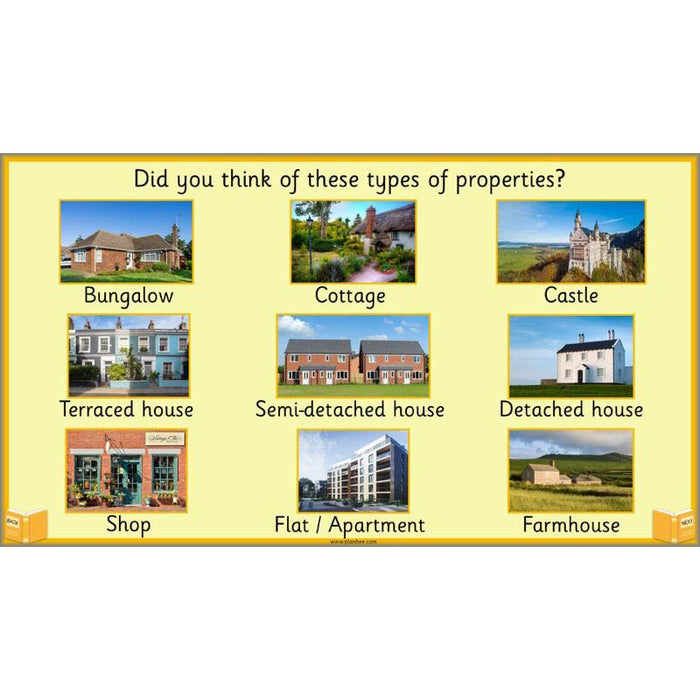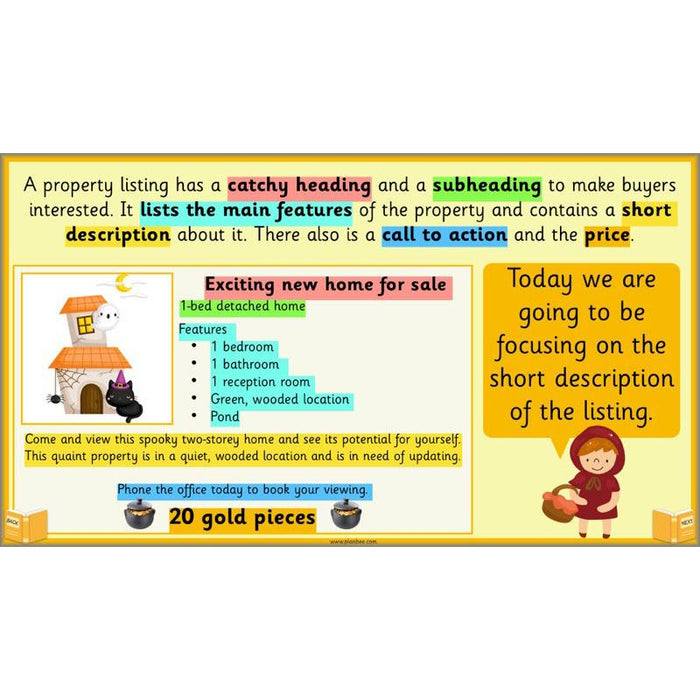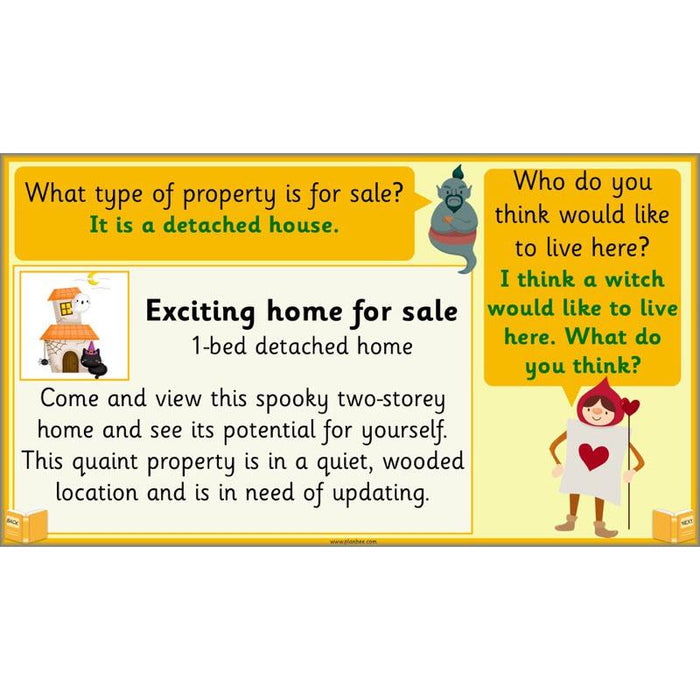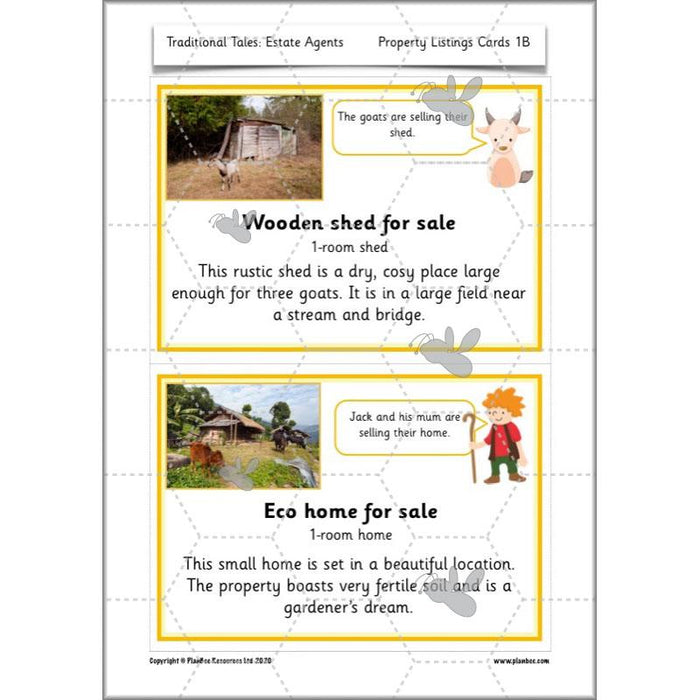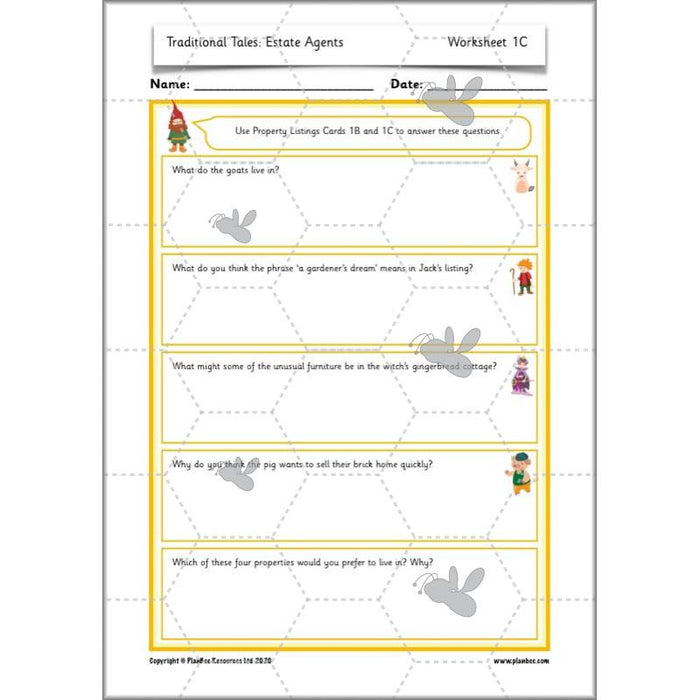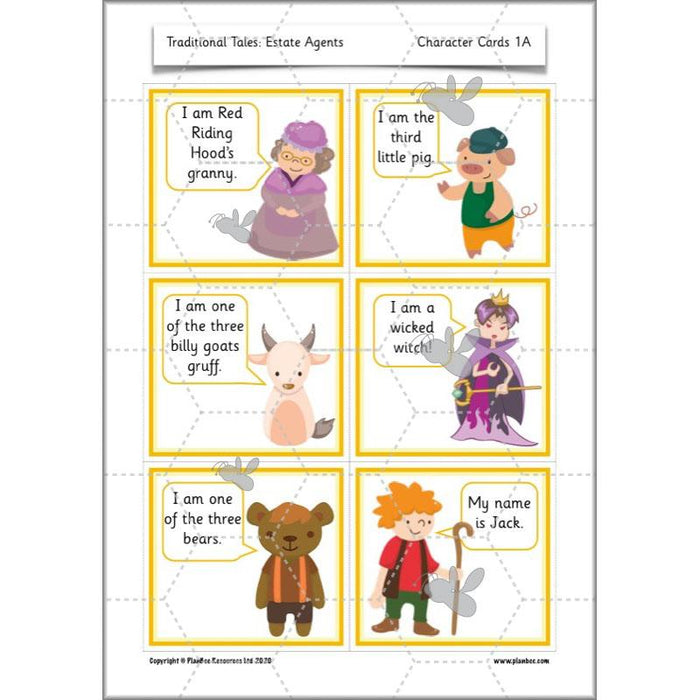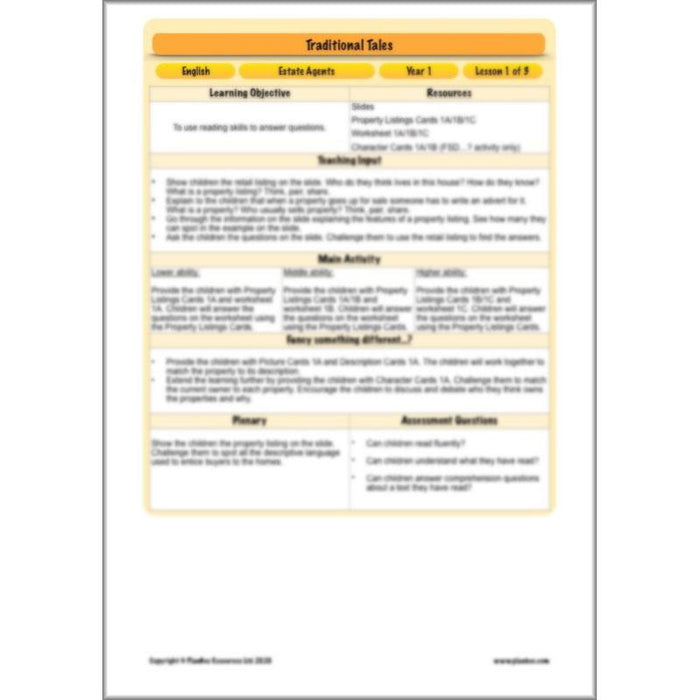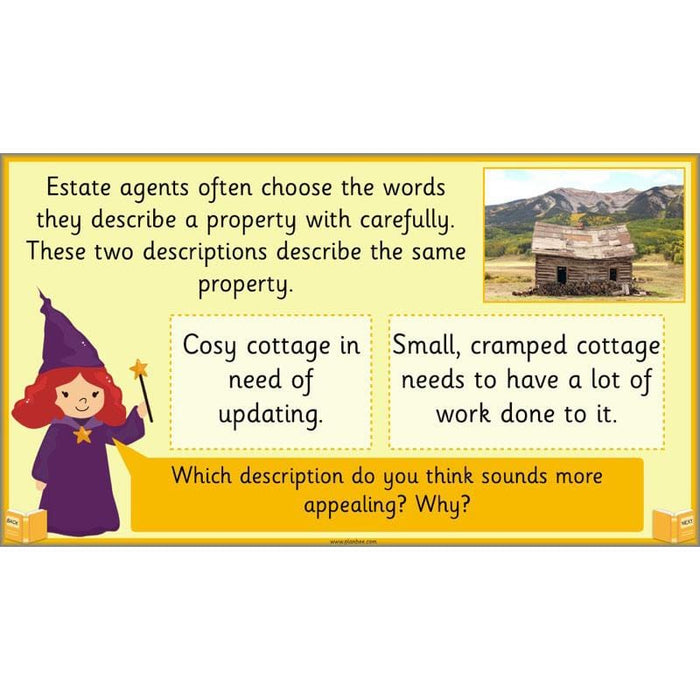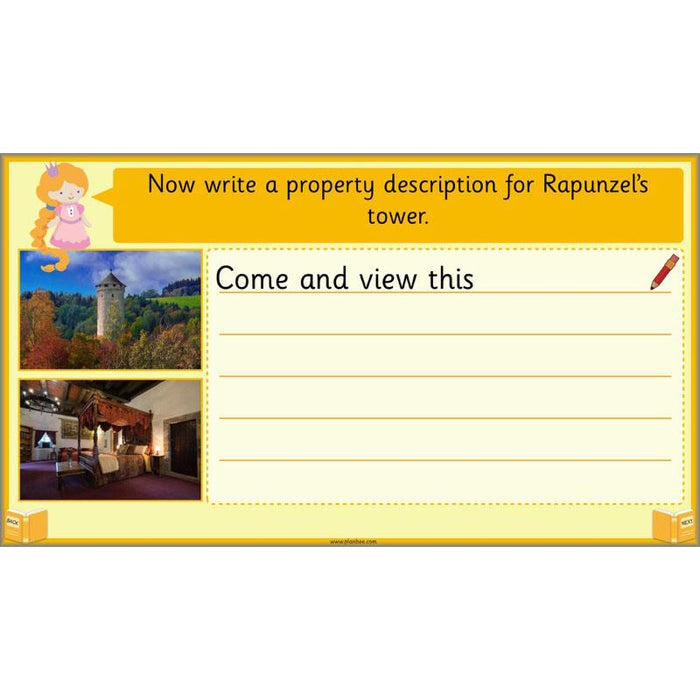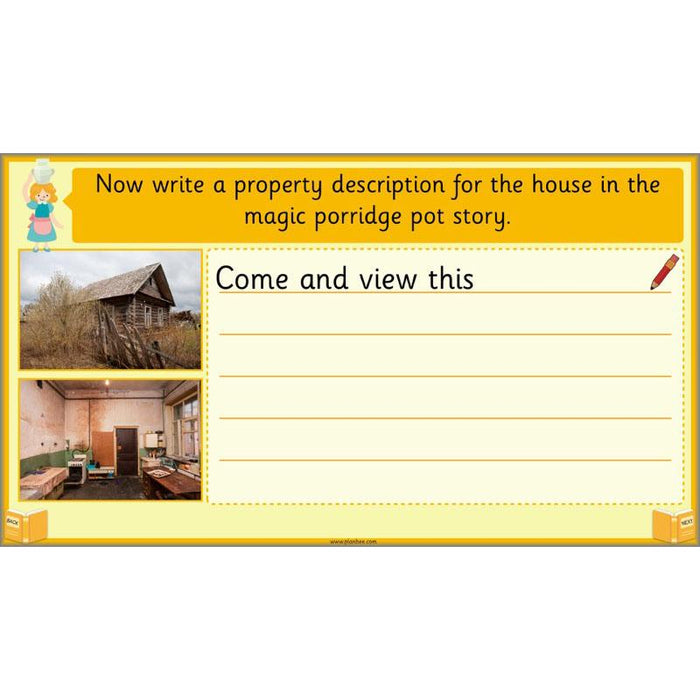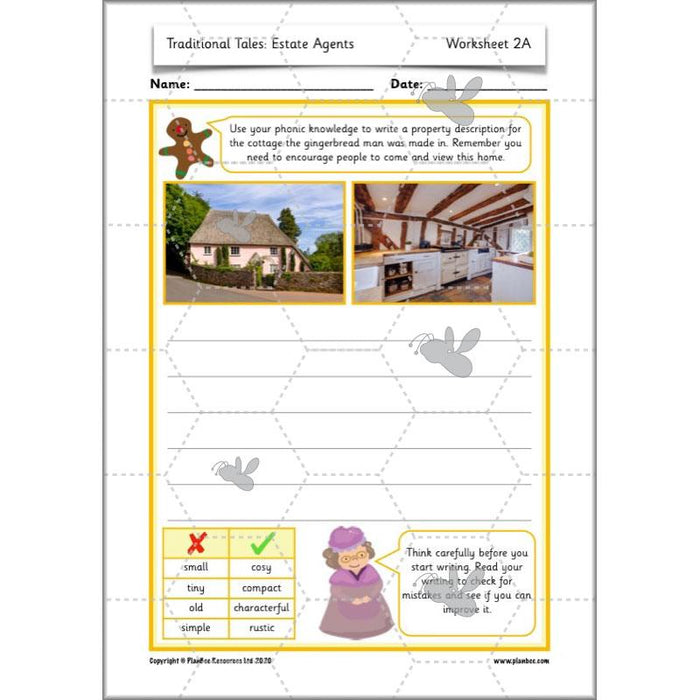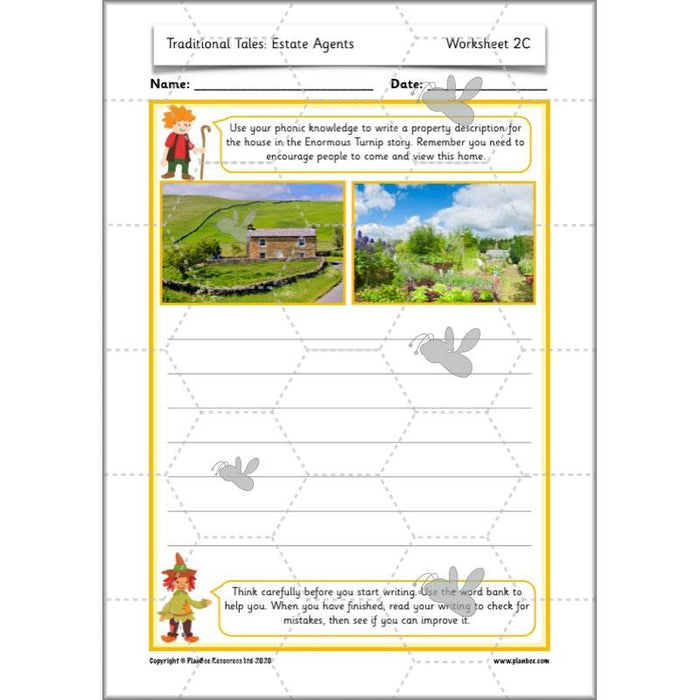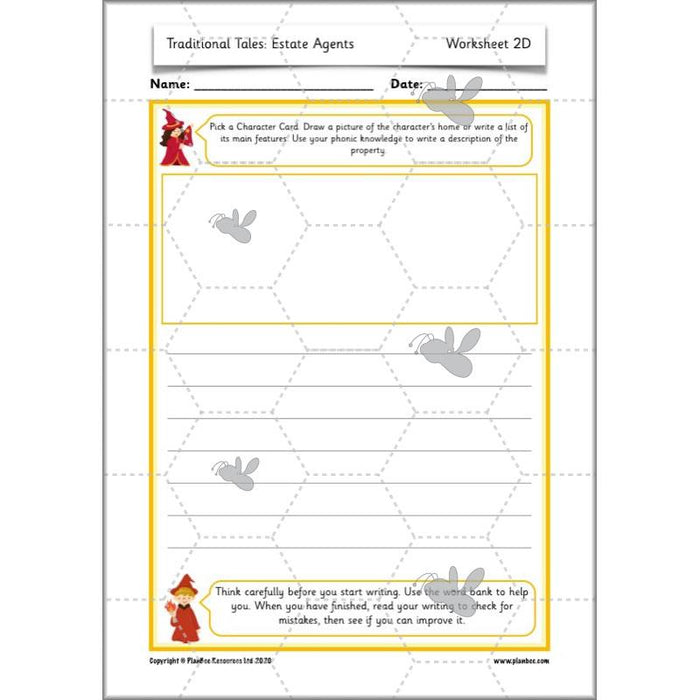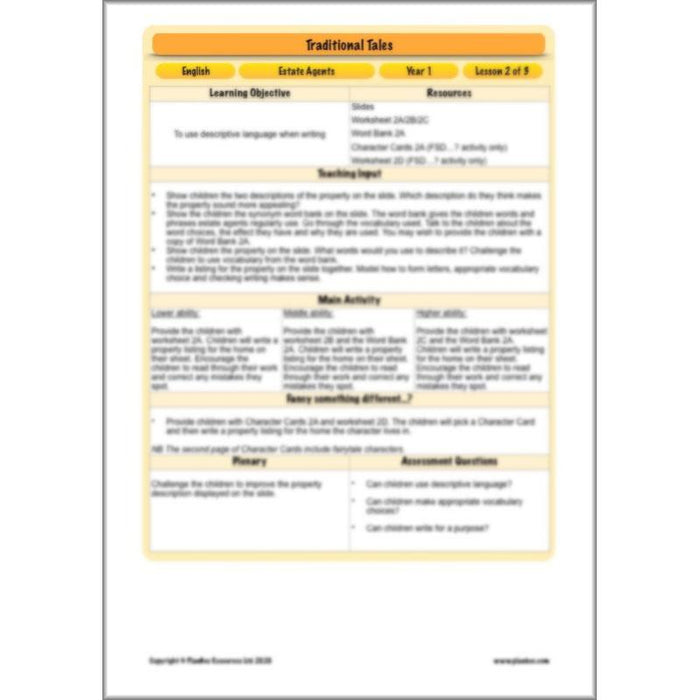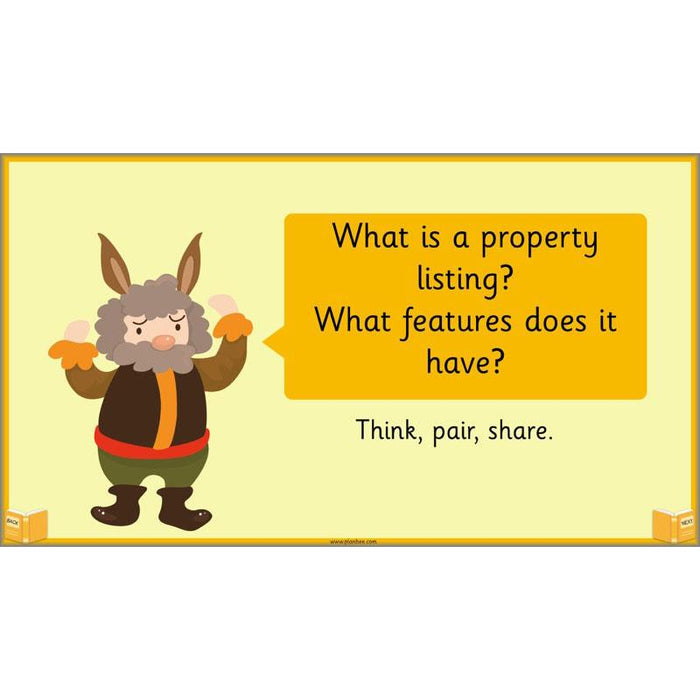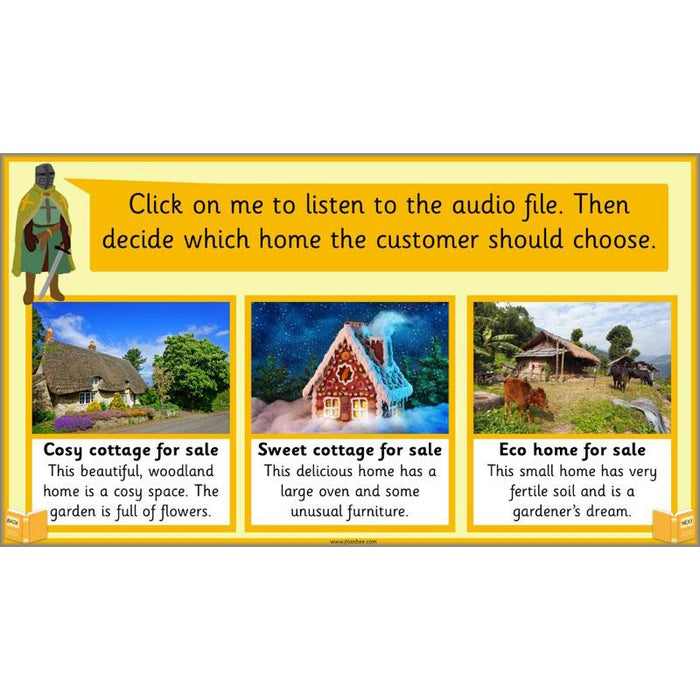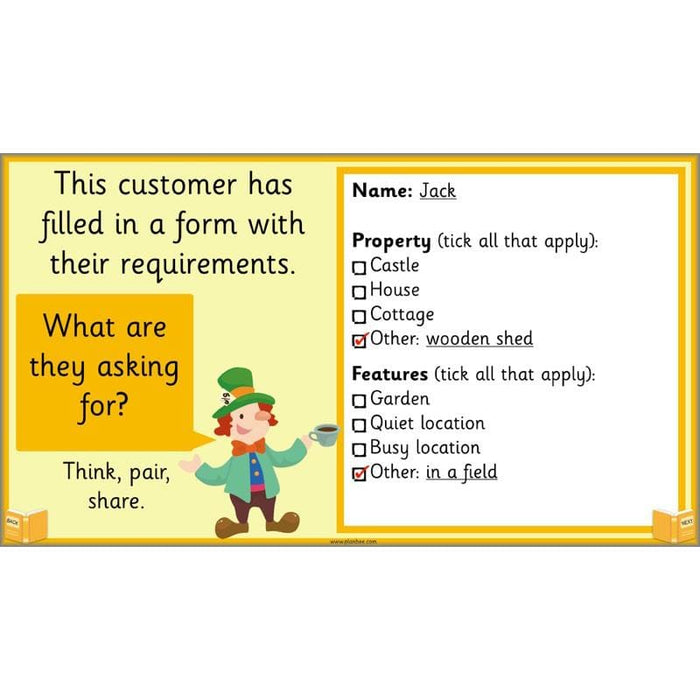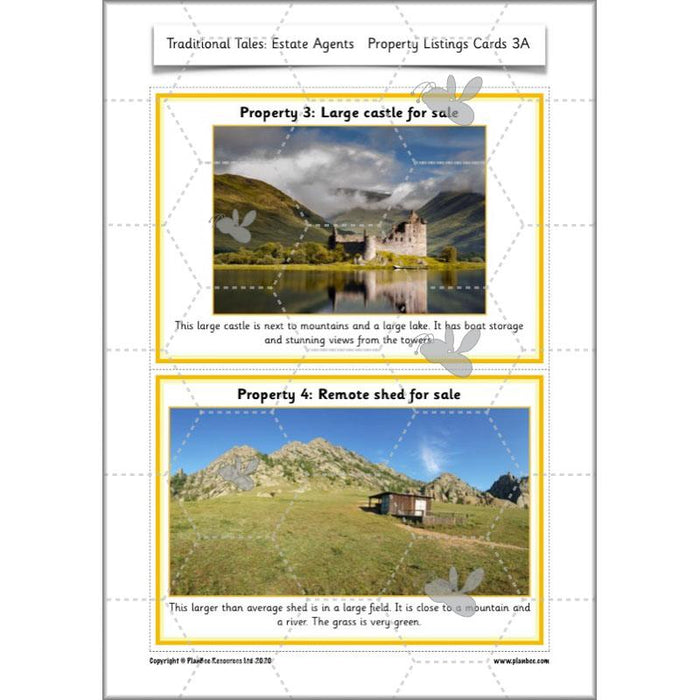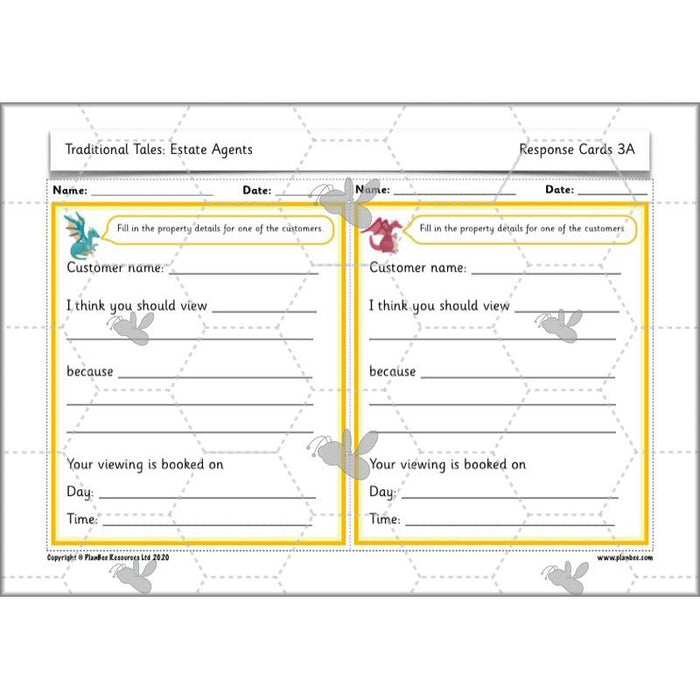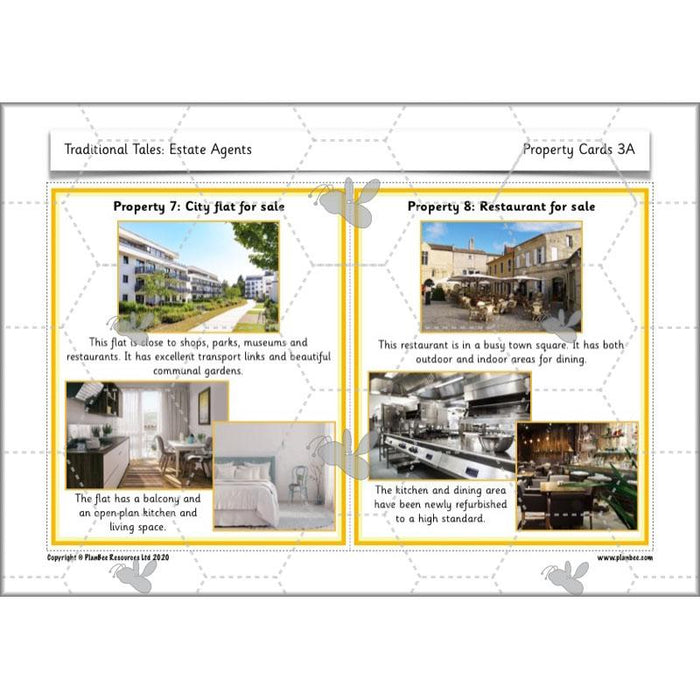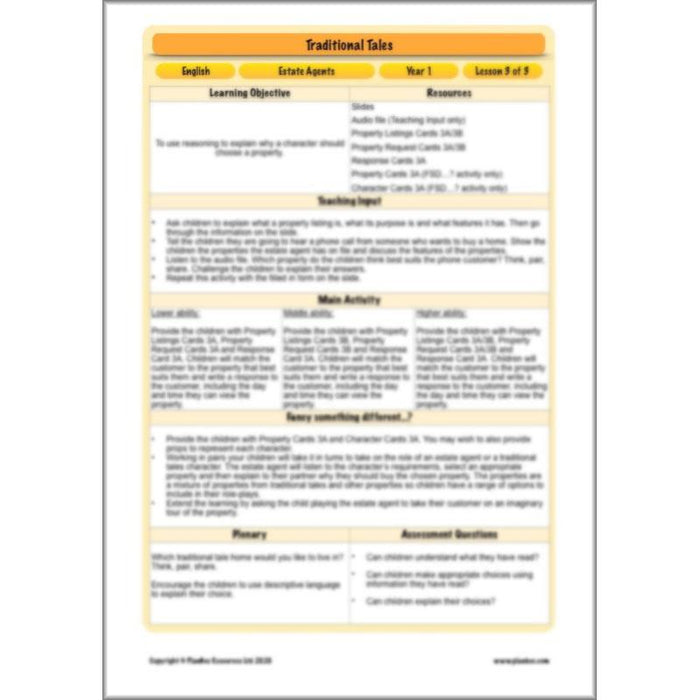#TheCompleteEnglishPack20lessons
Retell and perform the story of Goldilocks and the Three Bears. Then use phonic knowledge to write sentences and write narratives using the story structure. Run, run as fast as you can, then retell the Gingerbread Man story and practice using conjunctions and instruction writing. Take part in the retelling of the Little Red Riding Hood story before writing wanted posters to find the wolf. Finally, challenge your class to apply their knowledge of descriptive writing and traditional tales as they become estate agents and sell traditional tale properties.
Instantly download this comprehensive 'Traditional Tales' KS1 English planning pack for your Year 1 class, which includes detailed lesson plans, engaging slideshows for the teacher input, and differentiated worksheets and activity ideas to suit all ability levels.
#AllLITTLEREDRIDINGHOODLessonsinPack
This five-lesson Little Red Riding Hood Year 1 English planning pack challenges your KS1 class to retell, sequence and explore the story of Little Red Riding Hood from start to finish. Your class can use the included lesson slides to help them participate in discussions and answer questions about the story. The printable resources that are tailored to each Little Red Riding Hood lesson help support your Year 1 class as they retell the story using puppets or role-play.
Challenge your class to sequence events in the story and use adjectives to describe characters and create a wanted poster for the Big Bad Wolf. The children will also have the opportunity to compare the story to a different version and become story detectives in order to find similarities and differences between the two versions of the story.
Complete with everything you need, this Year 1 English planning pack is a great way to explore familiar stories with your class as a stand-alone unit or as part of your fairytale topic.
#AllTHEGINGERBREADMANLessonsinPack
These Gingerbread Man lesson plans for KS1 introduce your Year 1 children to the traditional tale, 'The Gingerbread Man'. Children will be challenged to draw their own story maps and sequence the main events.
Once children are well versed with the story, they will move on to instruction writing. Children will first give verbal instructions, focusing on the use of imperative verbs, followed by the importance of time conjunctions. After briefly looking at how instructions are structured, children will have the opportunity to write their own instructions on 'How to make a gingerbread man'. This lesson pack includes a tried and tested gingerbread man recipe card, allowing children to make links with the Gingerbread Man story to their personal experience of baking.
These fantastic Gingerbread Man lesson plans for KS1 are tailored to the Year 1 curriculum and designed to engage your Year 1 class in the traditional tale, 'The Gingerbread Man'. Each lesson comes with detailed planning, slideshows for teaching input, differentiated activity ideas and a range of printable resources. So get ready to chant, "You can't catch me. I'm the Gingerbread Man!" with your children.
#AllGOLDILOCKSLessonsinPack
This series of lessons centres around Goldilocks and the Three Bears. Your class will retell the traditional tale, use their phonic knowledge to write labels and captions, plan, write and edit their own versions of the story. The included resources support your class to become familiar with the traditional tale and confident in their ability to write their own versions.
This downloadable planning pack of five lessons is tailored to the Year 1 curriculum and designed to engage your children and ignite their story-writing skills. Each lesson comes with detailed planning, slideshows for teaching input, differentiated activity ideas and a range of printable resources.
#AllESTATEAGENTSLessonsinPack
This series of three lessons will get your class using descriptive language to sell the homes of traditional tale characters as well as develop their comprehension and persuasion skills. First, your class will look at the features of property listings, then they will answer comprehension questions about the properties. Next, they will write their own descriptions. Finally, they will become the customers and estate agents.
This downloadable planning pack of three lessons is tailored to the Year 1 curriculum and designed to engage your children and ignite their imaginations. Each lesson comes with detailed planning, slideshows for the teaching input, differentiated activity ideas and a range of printable resources.
#Lesson1LittleRedRidingHoodRetellingtheStory
Your Year 1 class can use the Little Red Riding Hood story map provided in this first lesson to retell the story that they have just listened to. They are encouraged in the lesson input slides to remember and join in with the parts they know. The detailed lesson plan provided in this pack offers you differentiated activity ideas including using puppets and Little Red Riding Hood drama activities.
Download everything you need to challenge and support your Year 1 class as they retell the familiar story of Little Red Riding Hood.
What's included:
- Lesson plan
- Slides
- Activity ideas
- Character cut-out-cards
- Speech bubble cards
- Story map sheet
- Character masks
#Lesson2LittleRedRidingHoodStorySequencing
Challenge your Year 1 class to complete these Little Red Riding Hood story sequencing activities supported by the printable resources included in this KS1 lesson pack. Your class will revisit the familiar story of Little Red Riding Hood and then use their understanding of the story to sequence different events. They will initially do this as a class using the provided lesson slides and then move on to working independently as they read and sequence sentences from the story.
The included differentiated printable resources provide your KS1 class with the support of sequencing pictures or sentences. Alternatively, they can be challenged to order a set of Little Red Riding Hood sequencing pictures to add their own sentences to.
What's included:
- Lesson plan
- Slides
- Activity ideas
- Sentence cards
- Differentiated worksheets
- Word banks
- Picture cards
#Lesson3LittleRedRidingHoodDescribingCharacters
The Little Red Riding Hood worksheets in this Year 1 lesson pack provide your KS1 class with the challenge of describing the different characters using simple adjectives. Your class will be asked to choose appropriate adjectives from lists or groups of words and assign them to a character who they are most suited for.
The provided printable resources in this pack include a three-way differentiation of the task and an alternative activity that involves the children playing a card game using adjectives.
What's included:
- Lesson plan
- Slides
- Activity ideas
- Word cards
- Differentiated worksheets
- Word bank
- Game cards
- Sentence cards
#Lesson4LittleRedRidingHoodWantedPosters
This Big Bad Wolf wanted poster KS1 lesson challenges your class to use adjectives in their descriptions of the Big Bad Wolf in order to get him caught. The included lesson slides discuss and model the different aspects and features of a wanted poster and encourage your class to offer suggestions for how the poster should be structured. Supported by the differentiated wanted poster templates, your class can create their own descriptions of the Big Bad Wolf or use the vandalised wanted poster as a model for the structure of their poster and descriptive sentences.
Everything you need to teach a fun and engaging descriptive lesson themed around the story of Little Red Riding Hood is instantly downloadable in this Year 1 English lesson pack.
What's included:
- Lesson plan
- Slides
- Activity ideas
- Differentiated worksheets
- Word bank
- Vandalised poster
#Lesson5LittleRedRidingHoodComparingVersionsoftheStory
The Little Red Riding Hood activities in this KS1 English lesson challenge your Year 1 class to compare and contrast two versions of the story. After reading 'Little Red and the Very Hungry Lion' your class will discuss the story and then become story detectives. They will hunt out any similarities between the two stories as well as the main differences. Using the printable resources to support them, including a story map of each version of the story, the children will independently sort statements based on which version of the story they are talking about.
This final lesson in the series comes with a detailed lesson plan, differentiated activities, lesson slides, and printable resources. All you'll need is access to the story of 'Little Red and the Very Hungry Lion' by Alex T. Smith (not provided).
What's included:
- Lesson plan
- Slides
- Activity ideas
- Sentence cards
- Differentiated worksheets
- Story maps
#Lesson6TheGingerbreadManStoryMap
This Gingerbread Man Story Map lesson pack for KS1 introduces your Year 1 class to the story of the Gingerbread Man and challenges them to join in with repeated phrases and predict what might happen next. Children will be asked to draw their own story maps, helping them become familiar with the main events in the story.
This engaging Gingerbread Man Story Map lesson for KS1 is packed with fantastic Gingerbread Man resources, including a slideshow and printable version of 'The Gingerbread Man' story. All the resources are ready to download at the click of a button!
What's included:
- Lesson plan
- Slides
- Activity ideas
- Story map
- Worksheets
- Character mat
- The Gingerbread Man story
- Story cards
#Lesson7TheGingerbreadManStorySequence
This Gingerbread Man story sequence lesson pack for KS1 challenges your Year 1 children to apply their knowledge of the story by sequencing the main events into chronological order using 'The Gingerbread Man' story sequence pictures. As an alternative activity, children collaborate to create a freeze-frame of each main event and sequence these as a class.
Everything you need to deliver this Gingerbread Man Story Sequence lesson pack for KS1 children is available at the click of a button! Including a slideshow for input, differentiated worksheets and story sequence cards.
What's included:
- Lesson plan
- Slides
- Activity ideas
- Story Sequence cards
- Differentiated worksheets
- Picture cards
#Lesson8TheGingerbreadManFollowingInstructions
This Gingerbread Man Following Instructions lesson pack for KS1 challenges your Year 1 children to give and follow instructions. Children will take a closer look at how the Little Old Lady made the Gingerbread Man and discuss how instructions can appear in different forms, such as recipes. Children will also think about how instructions can be given verbally. They will have a go at giving verbal instructions to a partner and consider how successful these instructions were.
This ready-to-teach Gingerbread Man Following Instructions lesson pack for KS1 comes with slides for input and a range of KS1-appropriate resources ready to download.
What's included:
- Lesson plan
- Slides
- Activity ideas
- Character cards
- Differentiated worksheets
- Teacher instruction cards
- Group instruction cards
#Lesson9TheGingerbreadManImperativeVerbs
This Gingerbread Man Imperative Verbs KS1 lesson pack challenges children to identify imperative verbs and understand how they are used when writing instructions. Children will be given the opportunity to apply their understanding using a range of resources, including differentiated worksheets and a handy imperative verb word mat.
Inspired by the traditional tale 'The Gingerbread Man', this Gingerbread Man Imperative Verb lesson pack for KS1 is full of fantastic resources to engage and excite your children.
What's included:
- Lesson plan
- Slides
- Activity ideas
- Bossy verb puzzle
- Differentiated worksheets
- Bossy verb mat
- Challenge card
- Teacher notes
- Bossy verb hunt cards
#Lesson10TheGingerbreadManTimeConjunctions
This Gingerbread Man Time Conjunctions lesson pack for KS1 teaches children what time conjunctions are and why they are important when following instructions. They will look to see if instructions make sense and whether particular time conjunctions work for each instruction. As an alternative activity, children will take part in a time conjunction treasure hunt and work together to work out the code word.
This Gingerbread Man Time Conjunctions lesson pack for KS1 comes complete with detailed planning, slides for teaching input and a range of differentiated resources, all inspired by the traditional tale 'The Gingerbread Man'.
What's included:
- Lesson plan
- Slides
- Activity ideas
- Differentiated instructions
- Differentiated worksheets
- Time conjunctions treasure hunt
#Lesson11TheGingerbreadManStructureofInstructions
This Gingerbread Man Structure of Instructions Year 1 lesson pack allows your KS1 children to recap their understanding of imperative verbs and time conjunctions. They will then look at example instructions on ‘How to make a gingerbread man,’ considering how the instructions are laid out. Children will also have the option to work in small groups to make their own gingerbread men, following the recipe provided.
This Gingerbread Man Instructions Year 1 lesson not only includes a detailed lesson plan, slides for input and differentiated activities, but you also receive a tried and tested gingerbread recipe and helpful hand-washing guide!
What's included:
- Lesson plan
- Slides
- Activity ideas
- Differentiated instruction templates
- Differentiated recipe picture cards
- Gingerbread Man recipe
- Handwashing poster
#Lesson12TheGingerbreadManWritingInstructions
In this Gingerbread Man Writing Instructions Year 1 lesson pack, your KS1 children will apply their learning from the week and write their own set of instructions on how to make a gingerbread man.
Complete with differentiated instruction worksheets, bossy verb mat and time conjunction mat, this Gingerbread Man writing instructions Year 1 lesson is jam-packed with resources and ready to teach.
What's included:
- Lesson plan
- Slides
- Activity ideas
- Differentiated worksheets
- Bossy verb mat
- Time conjunctions mat
- Lost Poster templates
#Lesson13GoldilocksRetellingTheTale
The first lesson in this Goldilocks and the Three Bears series of English lessons challenges your class to retell the traditional tale. After listening to the story and joining in with the refrains your class will use a Goldilocks and the Three Bears story map and story props to aid them in their storytelling skills.
This downloadable lesson includes a lesson plan, a slideshow presentation and printable teaching resources.
What's included:
- Lesson plan
- Slides
- Activity ideas
- Prop Cards
- Story Map
- Storytelling Path
#Lesson14GoldilocksWritingCaptions
The second lesson in this Goldilocks series builds on your children's knowledge of the story. Your class will fill in the gaps in the lines from the story and have the option of attempting the additional challenge of ordering the story. This lesson concludes by asking the children to proofread a letter Goldilocks wants to send to the three bears.
This downloadable lesson comes with a lesson plan, slideshow presentation and printable teaching resources.
What's included:
- Lesson plan
- Slides
- Activity ideas
- Worksheets
- Picture Cards
- Caption Cards
#Lesson15GoldilocksPlanningStories
The third lesson in this series of Goldilocks English lessons challenges your class to use the structure of the story to write their own. Your class will be shown the Goldilocks and the Three Bears story separated into four parts. Then they will be supported to change elements of the story as they plan their stories.
This downloadable lesson includes a lesson plan, a slideshow presentation and printable teaching resources.
What's included:
- Lesson plan
- Slides
- Activity ideas
- Story Maps
- Character Suggestion Cards
- Setting Suggestion Cards
- Story Dice
#Lesson16GoldilocksWritingStories
The fourth lesson in this Goldilocks series sees your class using their plans to write their own versions of the Goldilocks story. Your class will be introduced to synonym continuums and start to think about making appropriate choices when selecting adjectives in their writing.
This downloadable lesson comes with a lesson plan, a slideshow presentation, and printable teaching resources.
These FREE Synonym Balloons can be downloaded to support your children with making appropriate adjective choices in their writing.
What's included:
- Lesson plan
- Slides
- Activity ideas
- Worksheets
- Word Bank
- Story Plan
#Lesson17GoldilocksEditingandImproving
The final Goldilocks and the Three Bears lesson challenges your class to edit and improve their stories. They will look for spelling, punctuation and grammar mistakes in their writing as well as use synonym continuums to help them select more appropriate adjectives in their writing.
This downloadable lesson includes a lesson plan, a slideshow presentation and printable teaching resources.
What's included:
- Lesson plan
- Slides
- Activity ideas
- Worksheets
- Challenge Cards
- Word Cards
- Editing Cards
#Lesson18EstateAgentsReadingComprehension
This lesson introduces your class to the purpose and features of property listings. Your children will look at property descriptions in detail and use their comprehension skills to answer questions about different traditional tale properties.
This downloadable lesson includes a lesson plan, a slideshow presentation and printable teaching resources.
What's included:
- Lesson plan
- Slides
- Activity ideas
- Property Listings Cards
- Worksheets
- Character Cards
#Lesson19EstateAgentsDescriptiveWriting
During this lesson, your children will be introduced to some of the descriptive language estate agents use to describe properties, including cozy, rustic, and characterful. They will think about why these words are used and what effect they have. Your class will then have a go at writing their own property descriptions for traditional tale properties. They will think carefully about the purpose of the description.
This downloadable lesson includes a lesson plan, a slideshow presentation, and printable teaching resources.
What's included:
- Lesson plan
- Slides
- Activity ideas
- Worksheets
- Word Bank
- Character Cards
#Lesson20EstateAgentsMatchingCustomerstoProperties
The final lesson in this series challenges your class to be the estate agent. They will listen carefully to the customer's requirements and then look closely at the properties that are available. Your children will have to use reasoning to explain why a character should choose a property.
This downloadable lesson includes a lesson plan, a slideshow presentation, and printable teaching resources.
What's included:
- Lesson plan
- Slides
- Activity ideas
- Audio files
- Property Listings Cards
- Property Request Cards
- Response Cards
- Property Cards
- Character Cards
Free Overview (Medium-Term Plan)
Download a free overview to support your teaching of this scheme of work.
Free Assessment Grid
Download a free assessment grid to support your teaching of this scheme of work.
Curriculum Objectives covered
Not all of the National Curriculum objectives listed below apply to all the schemes in this Traditional Tales English Pack. View the overview for more details.
Reading - Word Reading Objectives:
- apply phonic knowledge and skills as the route to decode words
- respond speedily with the correct sound to graphemes (letters or groups of letters) for all 40+ phonemes, including, where applicable, alternative sounds for graphemes
- read accurately by blending sounds in unfamiliar words containing GPCs that have been taught
- read common exception words, noting unusual correspondences between spelling and sound and where these occur in the word
- read words containing taught GPCs and –s, –es, –ing, –ed, –er and –est endings
- read other words of more than one syllable that contain taught GPCs
- read words with contractions [for example, I’m, I’ll, we’ll], and understand that the apostrophe represents the omitted letter(s)
- read aloud accurately books that are consistent with their developing phonic knowledge and that do not require them to use other strategies to work out words
- re-read these books to build up their fluency and confidence in word reading
Reading - Comprehension Objectives:
- being encouraged to link what they read or hear read to their own experiences
- becoming very familiar with key stories, fairy stories and traditional tales, retelling them and considering their particular characteristics
- recognising and joining in with predictable phrases
- learning to appreciate rhymes and poems, and to recite some by heart
- discussing word meanings, linking new meanings to those already known
- drawing on what they already know or on background information and vocabulary provided by the teacher
- checking that the text makes sense to them as they read and correcting inaccurate reading
- discussing the significance of the title and events
- making inferences on the basis of what is being said and done
- predicting what might happen on the basis of what has been read so far
- participate in discussion about what is read to them, taking turns and listening to what others say
Writing - Transcription HANDWRITING Objectives:
Writing - Transcription SPELLING Objectives:
- words containing each of the 40+ phonemes already taught
- common exception words
- using –ing, –ed, –er and –est where no change is needed in the spelling of root words [for example, helping, helped, helper, eating, quicker, quickest]
Writing - Composition Objectives:
- writing narratives about personal experiences and those of others (real and fictional)
- writing about real events
- writing poetry
- planning or saying out loud what they are going to write about
- writing down ideas and/or key words, including new vocabulary
- encapsulating what they want to say, sentence by sentence
- evaluating their writing with the teacher and other pupils
- re-reading to check that their writing makes sense and that verbs to indicate time are used correctly and consistently, including verbs in the continuous form
- proof-reading to check for errors in spelling, grammar and punctuation [for example, ends of sentences punctuated correctly]
- read aloud what they have written with appropriate intonation to make the meaning clear
Writing - Vocabulary, Grammar and Punctuation Objectives:
- leaving spaces between words
- joining words and joining clauses using and
- beginning to punctuate sentences using a capital letter and a full stop, question mark or exclamation mark
- using a capital letter for names of people, places, the days of the week, and the personal pronoun ‘I’
English Appendix Objectives:
- Regular plural noun suffixes –s or –es [for example, dog, dogs; wish, wishes], including the effects of these suffixes on the meaning of the noun
- Suffixes that can be added to verbs where no change is needed in the spelling of root words (e.g. helping, helped, helper)
- How the prefix un– changes the meaning of verbs and adjectives [negation, for example, unkind, or undoing: untie the boat]
- How words can combine to make sentences
- Joining words and joining clauses using and
- Sequencing sentences to form short narratives
- Separation of words with spaces
- Introduction to capital letters, full stops, question marks and exclamation marks to demarcate sentences
Spoken Language Objectives:
- listen and respond appropriately to adults and their peers
- ask relevant questions to extend their understanding and knowledge
- articulate and justify answers, arguments and opinions
- maintain attention and participate actively in collaborative conversations, staying on topic and initiating and responding to comments
- use spoken language to develop understanding through speculating, hypothesising, imagining and exploring ideas
- speak audibly and fluently with an increasing command of Standard English
- participate in discussions, presentations, performances, role play/improvisations and debates
- gain, maintain and monitor the interest of the listener(s)
- consider and evaluate different viewpoints, attending to and building on the contributions of others
- select and use appropriate registers for effective communication
